Administrative Law Assignment 2022
VerifiedAdded on 2022/07/08
|46
|12584
|11
Assignment
AI Summary
Contribute Materials
Your contribution can guide someone’s learning journey. Share your
documents today.
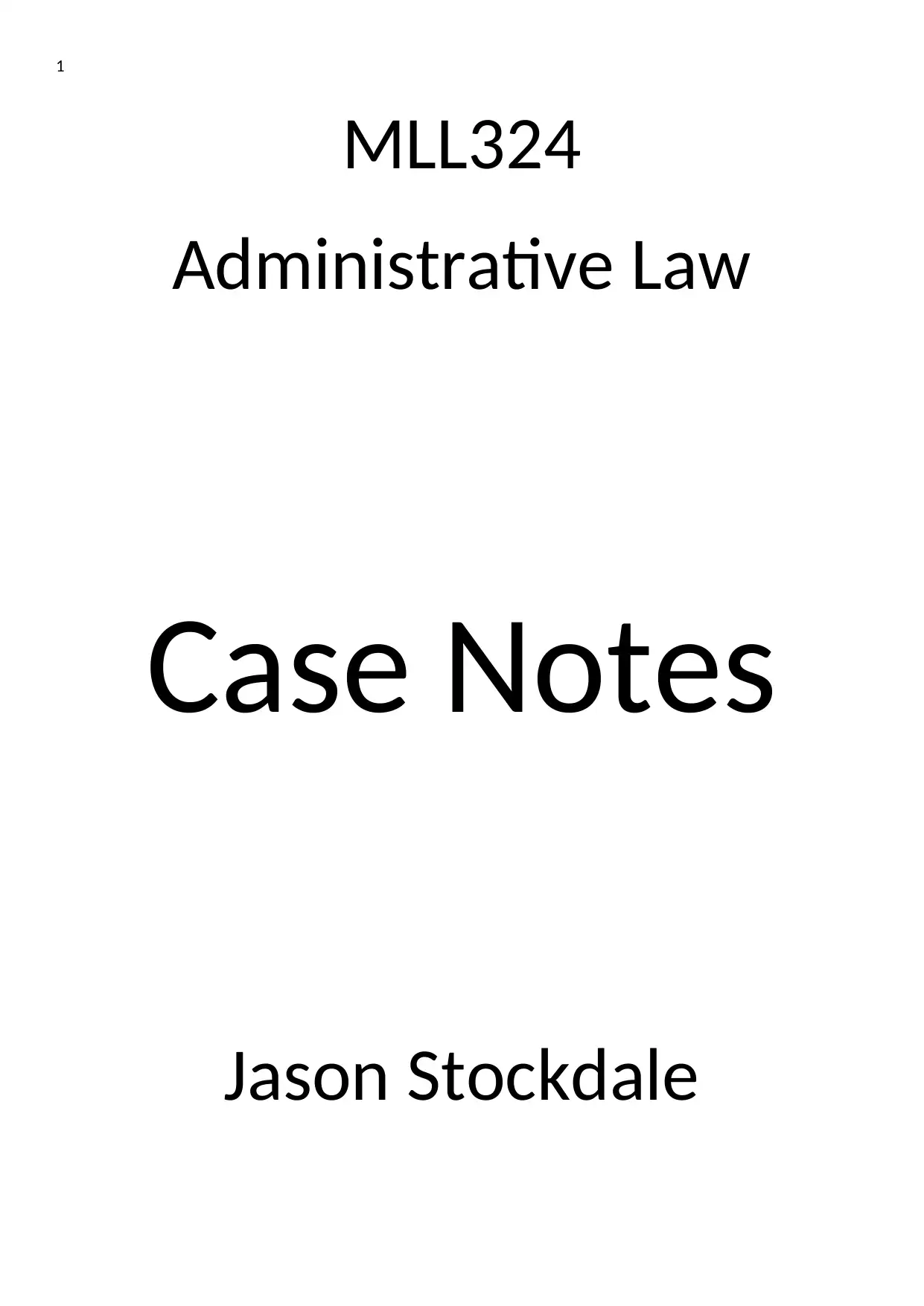
1
MLL324
Administrative Law
Case Notes
Jason Stockdale
MLL324
Administrative Law
Case Notes
Jason Stockdale
Secure Best Marks with AI Grader
Need help grading? Try our AI Grader for instant feedback on your assignments.
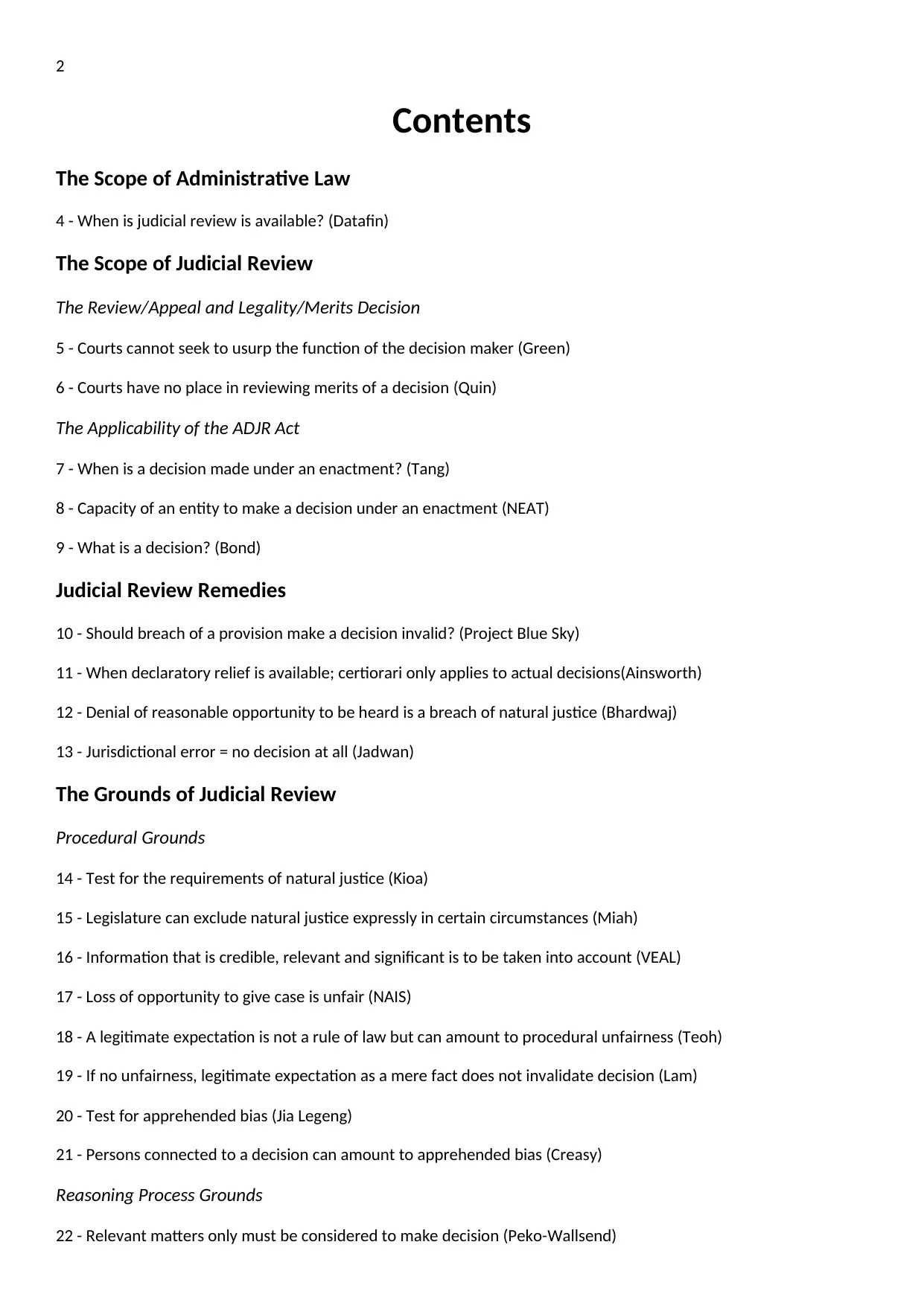
2
Contents
The Scope of Administrative Law
4 - When is judicial review is available? (Datafin)
The Scope of Judicial Review
The Review/Appeal and Legality/Merits Decision
5 - Courts cannot seek to usurp the function of the decision maker (Green)
6 - Courts have no place in reviewing merits of a decision (Quin)
The Applicability of the ADJR Act
7 - When is a decision made under an enactment? (Tang)
8 - Capacity of an entity to make a decision under an enactment (NEAT)
9 - What is a decision? (Bond)
Judicial Review Remedies
10 - Should breach of a provision make a decision invalid? (Project Blue Sky)
11 - When declaratory relief is available; certiorari only applies to actual decisions(Ainsworth)
12 - Denial of reasonable opportunity to be heard is a breach of natural justice (Bhardwaj)
13 - Jurisdictional error = no decision at all (Jadwan)
The Grounds of Judicial Review
Procedural Grounds
14 - Test for the requirements of natural justice (Kioa)
15 - Legislature can exclude natural justice expressly in certain circumstances (Miah)
16 - Information that is credible, relevant and significant is to be taken into account (VEAL)
17 - Loss of opportunity to give case is unfair (NAIS)
18 - A legitimate expectation is not a rule of law but can amount to procedural unfairness (Teoh)
19 - If no unfairness, legitimate expectation as a mere fact does not invalidate decision (Lam)
20 - Test for apprehended bias (Jia Legeng)
21 - Persons connected to a decision can amount to apprehended bias (Creasy)
Reasoning Process Grounds
22 - Relevant matters only must be considered to make decision (Peko-Wallsend)
Contents
The Scope of Administrative Law
4 - When is judicial review is available? (Datafin)
The Scope of Judicial Review
The Review/Appeal and Legality/Merits Decision
5 - Courts cannot seek to usurp the function of the decision maker (Green)
6 - Courts have no place in reviewing merits of a decision (Quin)
The Applicability of the ADJR Act
7 - When is a decision made under an enactment? (Tang)
8 - Capacity of an entity to make a decision under an enactment (NEAT)
9 - What is a decision? (Bond)
Judicial Review Remedies
10 - Should breach of a provision make a decision invalid? (Project Blue Sky)
11 - When declaratory relief is available; certiorari only applies to actual decisions(Ainsworth)
12 - Denial of reasonable opportunity to be heard is a breach of natural justice (Bhardwaj)
13 - Jurisdictional error = no decision at all (Jadwan)
The Grounds of Judicial Review
Procedural Grounds
14 - Test for the requirements of natural justice (Kioa)
15 - Legislature can exclude natural justice expressly in certain circumstances (Miah)
16 - Information that is credible, relevant and significant is to be taken into account (VEAL)
17 - Loss of opportunity to give case is unfair (NAIS)
18 - A legitimate expectation is not a rule of law but can amount to procedural unfairness (Teoh)
19 - If no unfairness, legitimate expectation as a mere fact does not invalidate decision (Lam)
20 - Test for apprehended bias (Jia Legeng)
21 - Persons connected to a decision can amount to apprehended bias (Creasy)
Reasoning Process Grounds
22 - Relevant matters only must be considered to make decision (Peko-Wallsend)
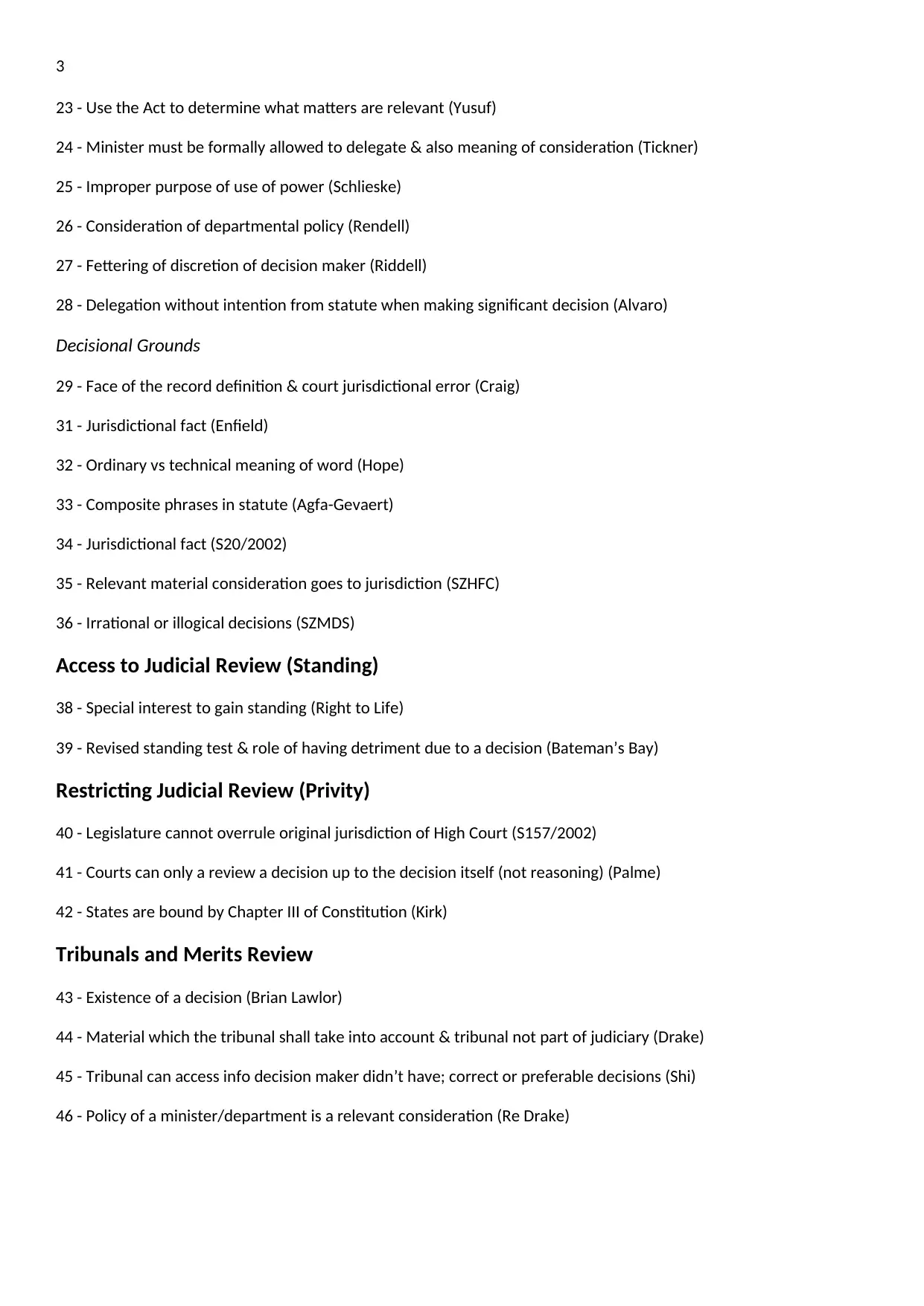
3
23 - Use the Act to determine what matters are relevant (Yusuf)
24 - Minister must be formally allowed to delegate & also meaning of consideration (Tickner)
25 - Improper purpose of use of power (Schlieske)
26 - Consideration of departmental policy (Rendell)
27 - Fettering of discretion of decision maker (Riddell)
28 - Delegation without intention from statute when making significant decision (Alvaro)
Decisional Grounds
29 - Face of the record definition & court jurisdictional error (Craig)
31 - Jurisdictional fact (Enfield)
32 - Ordinary vs technical meaning of word (Hope)
33 - Composite phrases in statute (Agfa-Gevaert)
34 - Jurisdictional fact (S20/2002)
35 - Relevant material consideration goes to jurisdiction (SZHFC)
36 - Irrational or illogical decisions (SZMDS)
Access to Judicial Review (Standing)
38 - Special interest to gain standing (Right to Life)
39 - Revised standing test & role of having detriment due to a decision (Bateman’s Bay)
Restricting Judicial Review (Privity)
40 - Legislature cannot overrule original jurisdiction of High Court (S157/2002)
41 - Courts can only a review a decision up to the decision itself (not reasoning) (Palme)
42 - States are bound by Chapter III of Constitution (Kirk)
Tribunals and Merits Review
43 - Existence of a decision (Brian Lawlor)
44 - Material which the tribunal shall take into account & tribunal not part of judiciary (Drake)
45 - Tribunal can access info decision maker didn’t have; correct or preferable decisions (Shi)
46 - Policy of a minister/department is a relevant consideration (Re Drake)
23 - Use the Act to determine what matters are relevant (Yusuf)
24 - Minister must be formally allowed to delegate & also meaning of consideration (Tickner)
25 - Improper purpose of use of power (Schlieske)
26 - Consideration of departmental policy (Rendell)
27 - Fettering of discretion of decision maker (Riddell)
28 - Delegation without intention from statute when making significant decision (Alvaro)
Decisional Grounds
29 - Face of the record definition & court jurisdictional error (Craig)
31 - Jurisdictional fact (Enfield)
32 - Ordinary vs technical meaning of word (Hope)
33 - Composite phrases in statute (Agfa-Gevaert)
34 - Jurisdictional fact (S20/2002)
35 - Relevant material consideration goes to jurisdiction (SZHFC)
36 - Irrational or illogical decisions (SZMDS)
Access to Judicial Review (Standing)
38 - Special interest to gain standing (Right to Life)
39 - Revised standing test & role of having detriment due to a decision (Bateman’s Bay)
Restricting Judicial Review (Privity)
40 - Legislature cannot overrule original jurisdiction of High Court (S157/2002)
41 - Courts can only a review a decision up to the decision itself (not reasoning) (Palme)
42 - States are bound by Chapter III of Constitution (Kirk)
Tribunals and Merits Review
43 - Existence of a decision (Brian Lawlor)
44 - Material which the tribunal shall take into account & tribunal not part of judiciary (Drake)
45 - Tribunal can access info decision maker didn’t have; correct or preferable decisions (Shi)
46 - Policy of a minister/department is a relevant consideration (Re Drake)
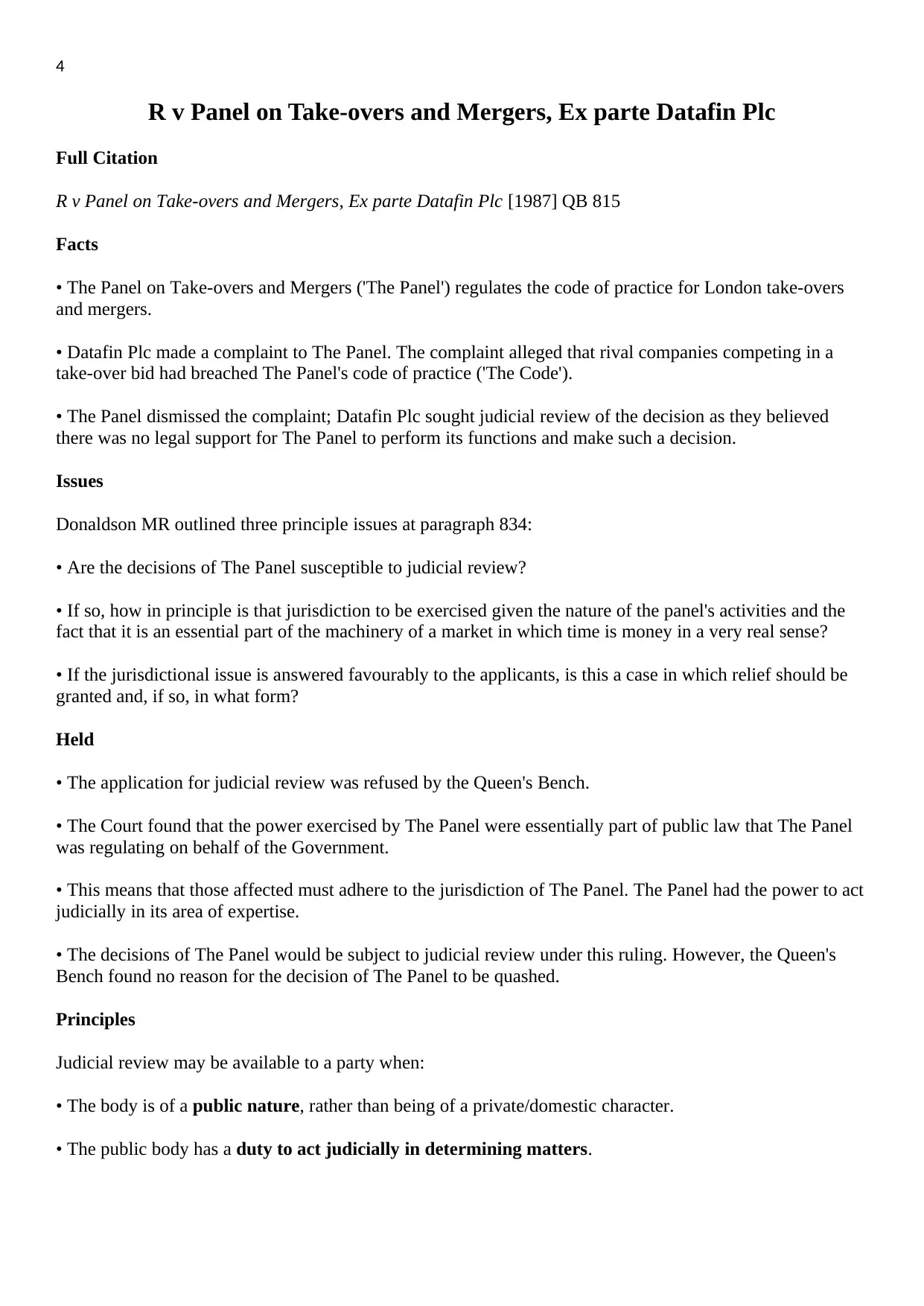
4
R v Panel on Take-overs and Mergers, Ex parte Datafin Plc
Full Citation
R v Panel on Take-overs and Mergers, Ex parte Datafin Plc [1987] QB 815
Facts
• The Panel on Take-overs and Mergers ('The Panel') regulates the code of practice for London take-overs
and mergers.
• Datafin Plc made a complaint to The Panel. The complaint alleged that rival companies competing in a
take-over bid had breached The Panel's code of practice ('The Code').
• The Panel dismissed the complaint; Datafin Plc sought judicial review of the decision as they believed
there was no legal support for The Panel to perform its functions and make such a decision.
Issues
Donaldson MR outlined three principle issues at paragraph 834:
• Are the decisions of The Panel susceptible to judicial review?
• If so, how in principle is that jurisdiction to be exercised given the nature of the panel's activities and the
fact that it is an essential part of the machinery of a market in which time is money in a very real sense?
• If the jurisdictional issue is answered favourably to the applicants, is this a case in which relief should be
granted and, if so, in what form?
Held
• The application for judicial review was refused by the Queen's Bench.
• The Court found that the power exercised by The Panel were essentially part of public law that The Panel
was regulating on behalf of the Government.
• This means that those affected must adhere to the jurisdiction of The Panel. The Panel had the power to act
judicially in its area of expertise.
• The decisions of The Panel would be subject to judicial review under this ruling. However, the Queen's
Bench found no reason for the decision of The Panel to be quashed.
Principles
Judicial review may be available to a party when:
• The body is of a public nature, rather than being of a private/domestic character.
• The public body has a duty to act judicially in determining matters.
R v Panel on Take-overs and Mergers, Ex parte Datafin Plc
Full Citation
R v Panel on Take-overs and Mergers, Ex parte Datafin Plc [1987] QB 815
Facts
• The Panel on Take-overs and Mergers ('The Panel') regulates the code of practice for London take-overs
and mergers.
• Datafin Plc made a complaint to The Panel. The complaint alleged that rival companies competing in a
take-over bid had breached The Panel's code of practice ('The Code').
• The Panel dismissed the complaint; Datafin Plc sought judicial review of the decision as they believed
there was no legal support for The Panel to perform its functions and make such a decision.
Issues
Donaldson MR outlined three principle issues at paragraph 834:
• Are the decisions of The Panel susceptible to judicial review?
• If so, how in principle is that jurisdiction to be exercised given the nature of the panel's activities and the
fact that it is an essential part of the machinery of a market in which time is money in a very real sense?
• If the jurisdictional issue is answered favourably to the applicants, is this a case in which relief should be
granted and, if so, in what form?
Held
• The application for judicial review was refused by the Queen's Bench.
• The Court found that the power exercised by The Panel were essentially part of public law that The Panel
was regulating on behalf of the Government.
• This means that those affected must adhere to the jurisdiction of The Panel. The Panel had the power to act
judicially in its area of expertise.
• The decisions of The Panel would be subject to judicial review under this ruling. However, the Queen's
Bench found no reason for the decision of The Panel to be quashed.
Principles
Judicial review may be available to a party when:
• The body is of a public nature, rather than being of a private/domestic character.
• The public body has a duty to act judicially in determining matters.
Secure Best Marks with AI Grader
Need help grading? Try our AI Grader for instant feedback on your assignments.
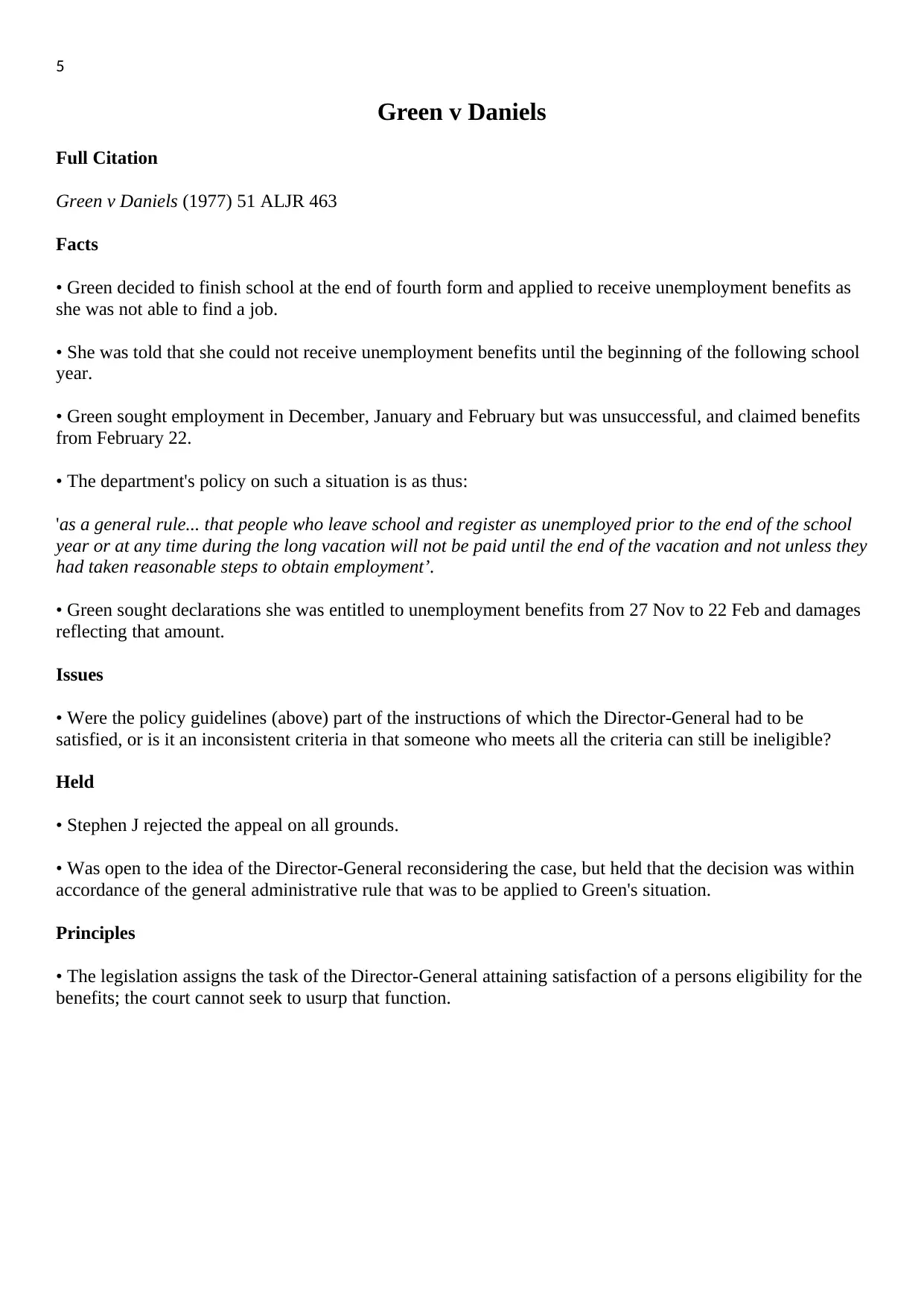
5
Green v Daniels
Full Citation
Green v Daniels (1977) 51 ALJR 463
Facts
• Green decided to finish school at the end of fourth form and applied to receive unemployment benefits as
she was not able to find a job.
• She was told that she could not receive unemployment benefits until the beginning of the following school
year.
• Green sought employment in December, January and February but was unsuccessful, and claimed benefits
from February 22.
• The department's policy on such a situation is as thus:
'as a general rule... that people who leave school and register as unemployed prior to the end of the school
year or at any time during the long vacation will not be paid until the end of the vacation and not unless they
had taken reasonable steps to obtain employment’.
• Green sought declarations she was entitled to unemployment benefits from 27 Nov to 22 Feb and damages
reflecting that amount.
Issues
• Were the policy guidelines (above) part of the instructions of which the Director-General had to be
satisfied, or is it an inconsistent criteria in that someone who meets all the criteria can still be ineligible?
Held
• Stephen J rejected the appeal on all grounds.
• Was open to the idea of the Director-General reconsidering the case, but held that the decision was within
accordance of the general administrative rule that was to be applied to Green's situation.
Principles
• The legislation assigns the task of the Director-General attaining satisfaction of a persons eligibility for the
benefits; the court cannot seek to usurp that function.
Green v Daniels
Full Citation
Green v Daniels (1977) 51 ALJR 463
Facts
• Green decided to finish school at the end of fourth form and applied to receive unemployment benefits as
she was not able to find a job.
• She was told that she could not receive unemployment benefits until the beginning of the following school
year.
• Green sought employment in December, January and February but was unsuccessful, and claimed benefits
from February 22.
• The department's policy on such a situation is as thus:
'as a general rule... that people who leave school and register as unemployed prior to the end of the school
year or at any time during the long vacation will not be paid until the end of the vacation and not unless they
had taken reasonable steps to obtain employment’.
• Green sought declarations she was entitled to unemployment benefits from 27 Nov to 22 Feb and damages
reflecting that amount.
Issues
• Were the policy guidelines (above) part of the instructions of which the Director-General had to be
satisfied, or is it an inconsistent criteria in that someone who meets all the criteria can still be ineligible?
Held
• Stephen J rejected the appeal on all grounds.
• Was open to the idea of the Director-General reconsidering the case, but held that the decision was within
accordance of the general administrative rule that was to be applied to Green's situation.
Principles
• The legislation assigns the task of the Director-General attaining satisfaction of a persons eligibility for the
benefits; the court cannot seek to usurp that function.
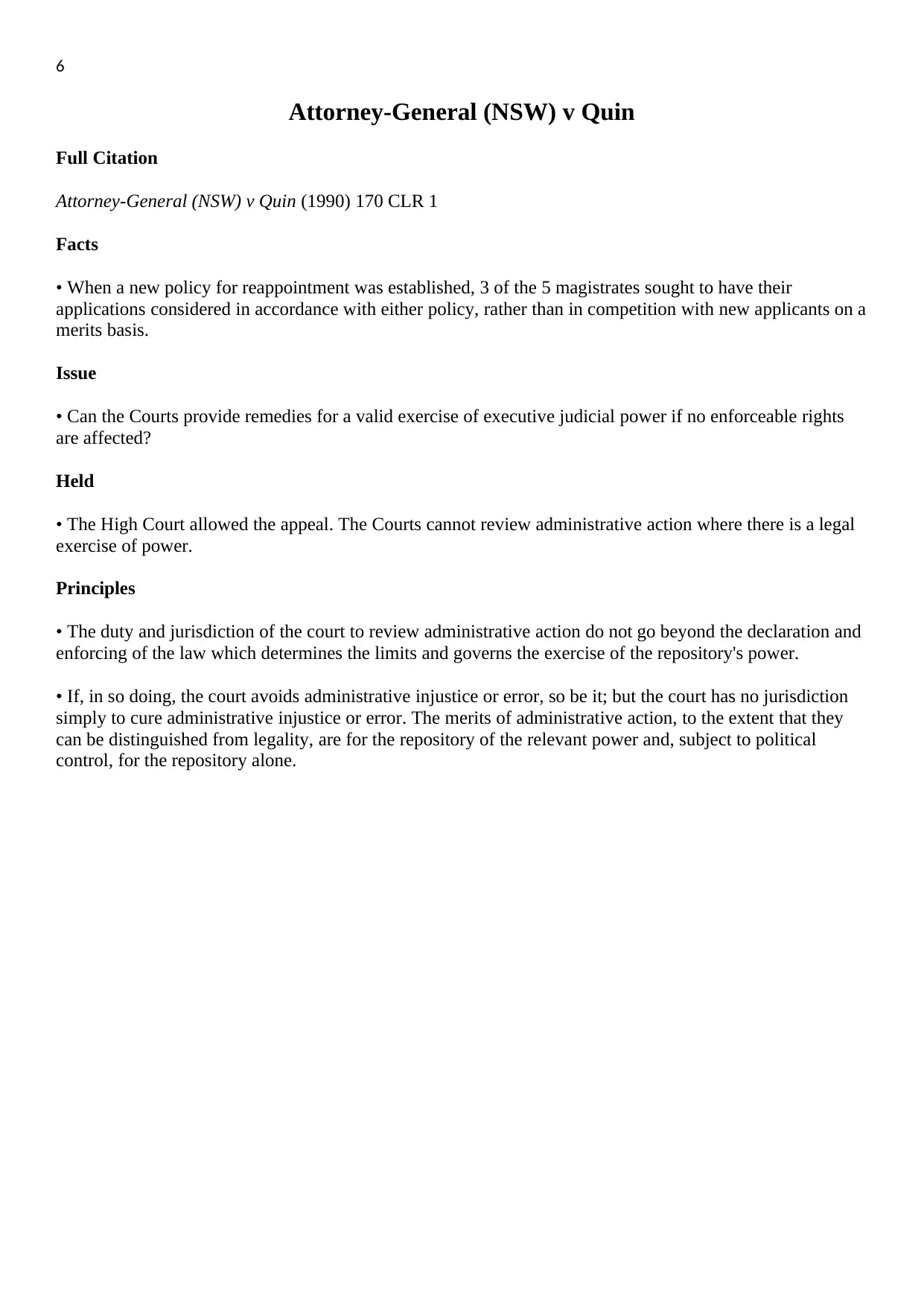
6
Attorney-General (NSW) v Quin
Full Citation
Attorney-General (NSW) v Quin (1990) 170 CLR 1
Facts
• When a new policy for reappointment was established, 3 of the 5 magistrates sought to have their
applications considered in accordance with either policy, rather than in competition with new applicants on a
merits basis.
Issue
• Can the Courts provide remedies for a valid exercise of executive judicial power if no enforceable rights
are affected?
Held
• The High Court allowed the appeal. The Courts cannot review administrative action where there is a legal
exercise of power.
Principles
• The duty and jurisdiction of the court to review administrative action do not go beyond the declaration and
enforcing of the law which determines the limits and governs the exercise of the repository's power.
• If, in so doing, the court avoids administrative injustice or error, so be it; but the court has no jurisdiction
simply to cure administrative injustice or error. The merits of administrative action, to the extent that they
can be distinguished from legality, are for the repository of the relevant power and, subject to political
control, for the repository alone.
Attorney-General (NSW) v Quin
Full Citation
Attorney-General (NSW) v Quin (1990) 170 CLR 1
Facts
• When a new policy for reappointment was established, 3 of the 5 magistrates sought to have their
applications considered in accordance with either policy, rather than in competition with new applicants on a
merits basis.
Issue
• Can the Courts provide remedies for a valid exercise of executive judicial power if no enforceable rights
are affected?
Held
• The High Court allowed the appeal. The Courts cannot review administrative action where there is a legal
exercise of power.
Principles
• The duty and jurisdiction of the court to review administrative action do not go beyond the declaration and
enforcing of the law which determines the limits and governs the exercise of the repository's power.
• If, in so doing, the court avoids administrative injustice or error, so be it; but the court has no jurisdiction
simply to cure administrative injustice or error. The merits of administrative action, to the extent that they
can be distinguished from legality, are for the repository of the relevant power and, subject to political
control, for the repository alone.
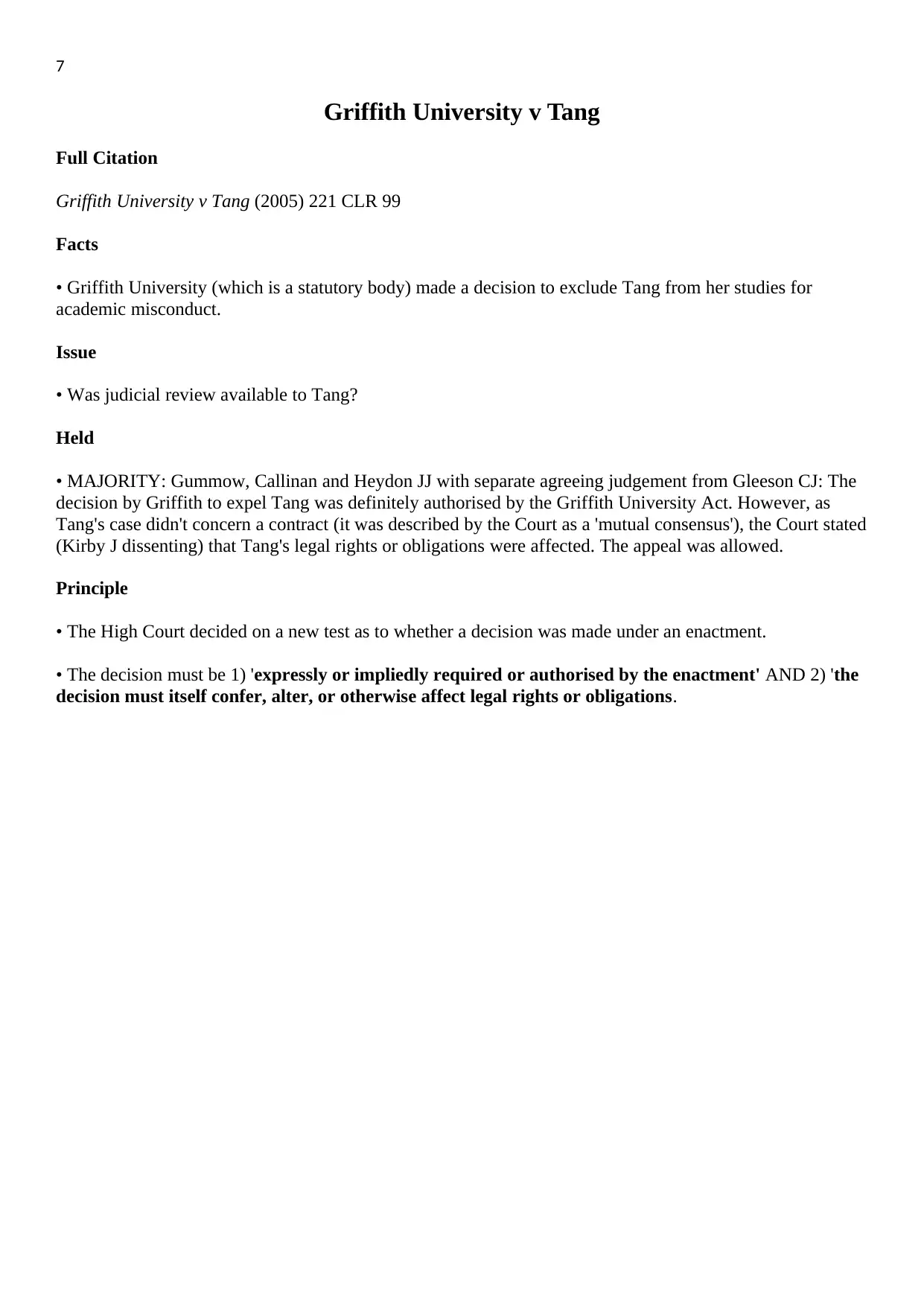
7
Griffith University v Tang
Full Citation
Griffith University v Tang (2005) 221 CLR 99
Facts
• Griffith University (which is a statutory body) made a decision to exclude Tang from her studies for
academic misconduct.
Issue
• Was judicial review available to Tang?
Held
• MAJORITY: Gummow, Callinan and Heydon JJ with separate agreeing judgement from Gleeson CJ: The
decision by Griffith to expel Tang was definitely authorised by the Griffith University Act. However, as
Tang's case didn't concern a contract (it was described by the Court as a 'mutual consensus'), the Court stated
(Kirby J dissenting) that Tang's legal rights or obligations were affected. The appeal was allowed.
Principle
• The High Court decided on a new test as to whether a decision was made under an enactment.
• The decision must be 1) 'expressly or impliedly required or authorised by the enactment' AND 2) 'the
decision must itself confer, alter, or otherwise affect legal rights or obligations.
Griffith University v Tang
Full Citation
Griffith University v Tang (2005) 221 CLR 99
Facts
• Griffith University (which is a statutory body) made a decision to exclude Tang from her studies for
academic misconduct.
Issue
• Was judicial review available to Tang?
Held
• MAJORITY: Gummow, Callinan and Heydon JJ with separate agreeing judgement from Gleeson CJ: The
decision by Griffith to expel Tang was definitely authorised by the Griffith University Act. However, as
Tang's case didn't concern a contract (it was described by the Court as a 'mutual consensus'), the Court stated
(Kirby J dissenting) that Tang's legal rights or obligations were affected. The appeal was allowed.
Principle
• The High Court decided on a new test as to whether a decision was made under an enactment.
• The decision must be 1) 'expressly or impliedly required or authorised by the enactment' AND 2) 'the
decision must itself confer, alter, or otherwise affect legal rights or obligations.
Paraphrase This Document
Need a fresh take? Get an instant paraphrase of this document with our AI Paraphraser
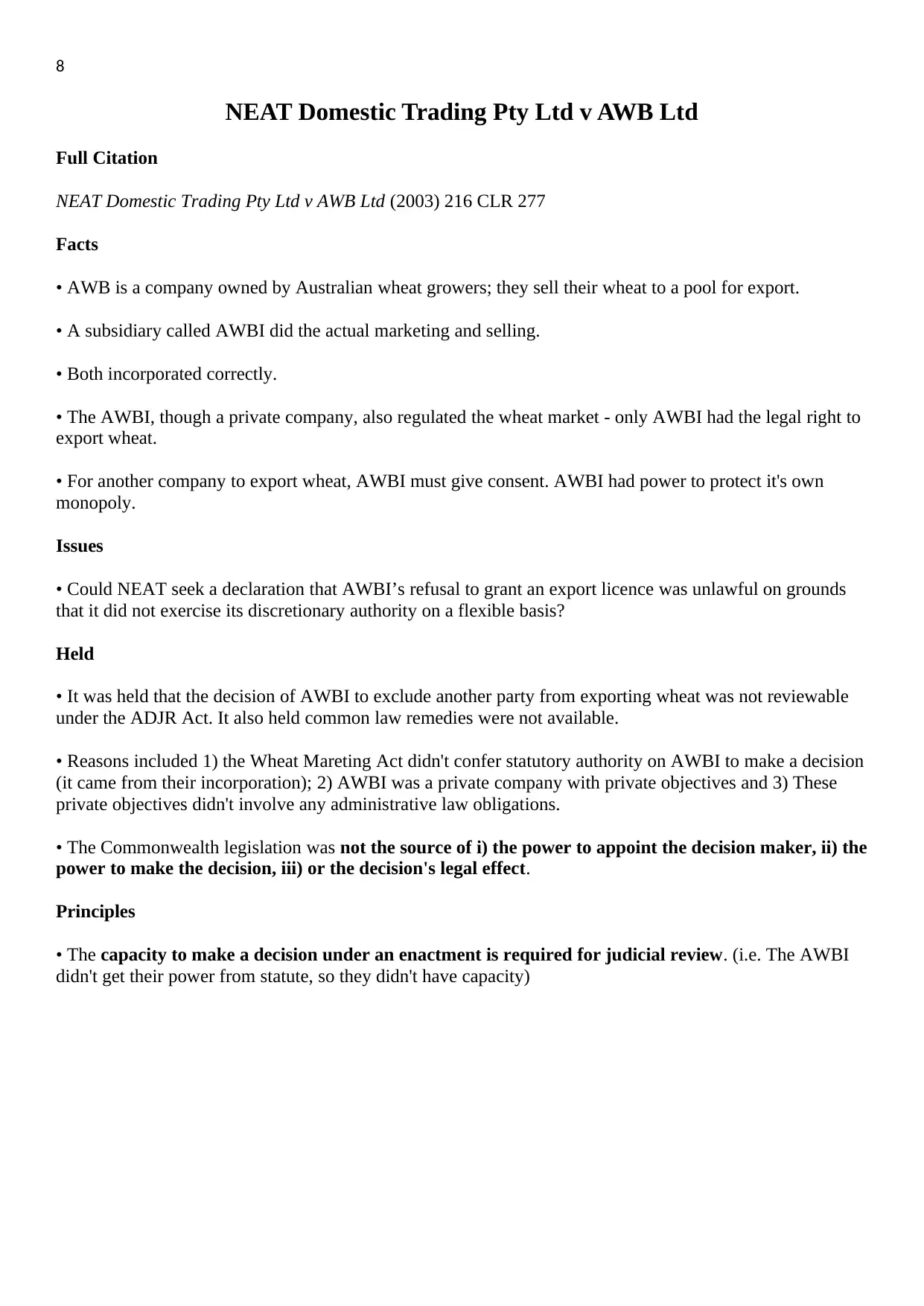
8
NEAT Domestic Trading Pty Ltd v AWB Ltd
Full Citation
NEAT Domestic Trading Pty Ltd v AWB Ltd (2003) 216 CLR 277
Facts
• AWB is a company owned by Australian wheat growers; they sell their wheat to a pool for export.
• A subsidiary called AWBI did the actual marketing and selling.
• Both incorporated correctly.
• The AWBI, though a private company, also regulated the wheat market - only AWBI had the legal right to
export wheat.
• For another company to export wheat, AWBI must give consent. AWBI had power to protect it's own
monopoly.
Issues
• Could NEAT seek a declaration that AWBI’s refusal to grant an export licence was unlawful on grounds
that it did not exercise its discretionary authority on a flexible basis?
Held
• It was held that the decision of AWBI to exclude another party from exporting wheat was not reviewable
under the ADJR Act. It also held common law remedies were not available.
• Reasons included 1) the Wheat Mareting Act didn't confer statutory authority on AWBI to make a decision
(it came from their incorporation); 2) AWBI was a private company with private objectives and 3) These
private objectives didn't involve any administrative law obligations.
• The Commonwealth legislation was not the source of i) the power to appoint the decision maker, ii) the
power to make the decision, iii) or the decision's legal effect.
Principles
• The capacity to make a decision under an enactment is required for judicial review. (i.e. The AWBI
didn't get their power from statute, so they didn't have capacity)
NEAT Domestic Trading Pty Ltd v AWB Ltd
Full Citation
NEAT Domestic Trading Pty Ltd v AWB Ltd (2003) 216 CLR 277
Facts
• AWB is a company owned by Australian wheat growers; they sell their wheat to a pool for export.
• A subsidiary called AWBI did the actual marketing and selling.
• Both incorporated correctly.
• The AWBI, though a private company, also regulated the wheat market - only AWBI had the legal right to
export wheat.
• For another company to export wheat, AWBI must give consent. AWBI had power to protect it's own
monopoly.
Issues
• Could NEAT seek a declaration that AWBI’s refusal to grant an export licence was unlawful on grounds
that it did not exercise its discretionary authority on a flexible basis?
Held
• It was held that the decision of AWBI to exclude another party from exporting wheat was not reviewable
under the ADJR Act. It also held common law remedies were not available.
• Reasons included 1) the Wheat Mareting Act didn't confer statutory authority on AWBI to make a decision
(it came from their incorporation); 2) AWBI was a private company with private objectives and 3) These
private objectives didn't involve any administrative law obligations.
• The Commonwealth legislation was not the source of i) the power to appoint the decision maker, ii) the
power to make the decision, iii) or the decision's legal effect.
Principles
• The capacity to make a decision under an enactment is required for judicial review. (i.e. The AWBI
didn't get their power from statute, so they didn't have capacity)
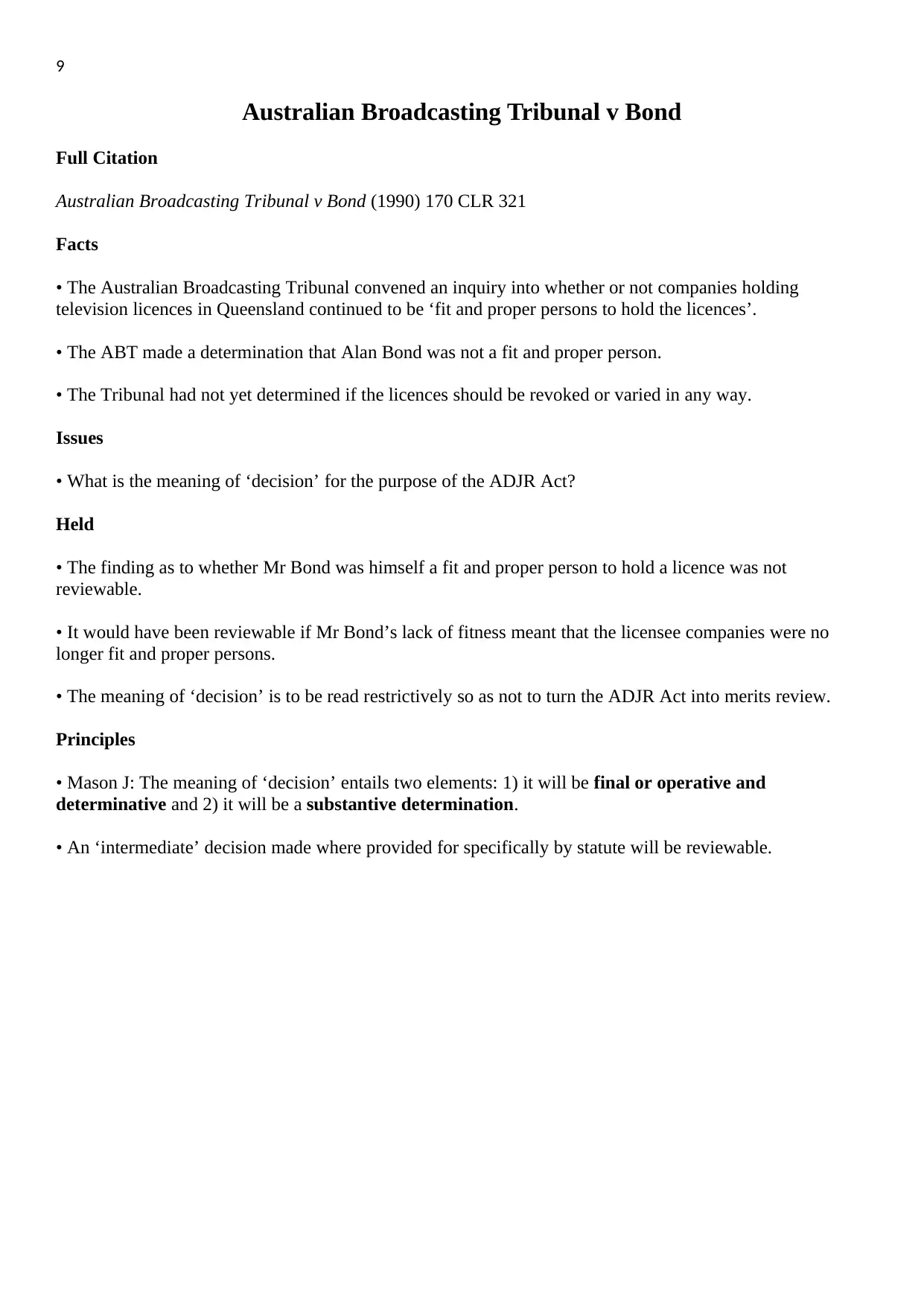
9
Australian Broadcasting Tribunal v Bond
Full Citation
Australian Broadcasting Tribunal v Bond (1990) 170 CLR 321
Facts
• The Australian Broadcasting Tribunal convened an inquiry into whether or not companies holding
television licences in Queensland continued to be ‘fit and proper persons to hold the licences’.
• The ABT made a determination that Alan Bond was not a fit and proper person.
• The Tribunal had not yet determined if the licences should be revoked or varied in any way.
Issues
• What is the meaning of ‘decision’ for the purpose of the ADJR Act?
Held
• The finding as to whether Mr Bond was himself a fit and proper person to hold a licence was not
reviewable.
• It would have been reviewable if Mr Bond’s lack of fitness meant that the licensee companies were no
longer fit and proper persons.
• The meaning of ‘decision’ is to be read restrictively so as not to turn the ADJR Act into merits review.
Principles
• Mason J: The meaning of ‘decision’ entails two elements: 1) it will be final or operative and
determinative and 2) it will be a substantive determination.
• An ‘intermediate’ decision made where provided for specifically by statute will be reviewable.
Australian Broadcasting Tribunal v Bond
Full Citation
Australian Broadcasting Tribunal v Bond (1990) 170 CLR 321
Facts
• The Australian Broadcasting Tribunal convened an inquiry into whether or not companies holding
television licences in Queensland continued to be ‘fit and proper persons to hold the licences’.
• The ABT made a determination that Alan Bond was not a fit and proper person.
• The Tribunal had not yet determined if the licences should be revoked or varied in any way.
Issues
• What is the meaning of ‘decision’ for the purpose of the ADJR Act?
Held
• The finding as to whether Mr Bond was himself a fit and proper person to hold a licence was not
reviewable.
• It would have been reviewable if Mr Bond’s lack of fitness meant that the licensee companies were no
longer fit and proper persons.
• The meaning of ‘decision’ is to be read restrictively so as not to turn the ADJR Act into merits review.
Principles
• Mason J: The meaning of ‘decision’ entails two elements: 1) it will be final or operative and
determinative and 2) it will be a substantive determination.
• An ‘intermediate’ decision made where provided for specifically by statute will be reviewable.
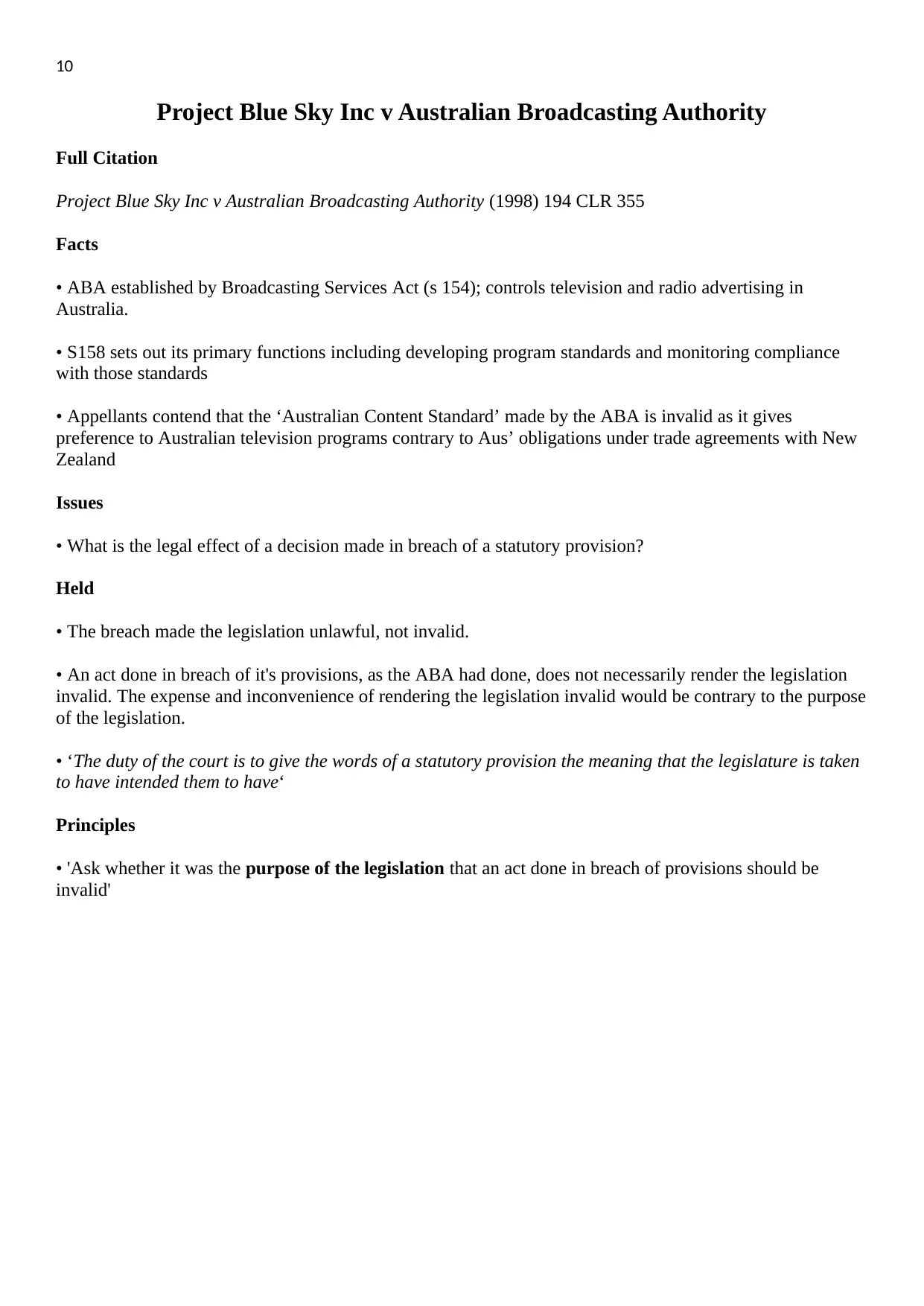
10
Project Blue Sky Inc v Australian Broadcasting Authority
Full Citation
Project Blue Sky Inc v Australian Broadcasting Authority (1998) 194 CLR 355
Facts
• ABA established by Broadcasting Services Act (s 154); controls television and radio advertising in
Australia.
• S158 sets out its primary functions including developing program standards and monitoring compliance
with those standards
• Appellants contend that the ‘Australian Content Standard’ made by the ABA is invalid as it gives
preference to Australian television programs contrary to Aus’ obligations under trade agreements with New
Zealand
Issues
• What is the legal effect of a decision made in breach of a statutory provision?
Held
• The breach made the legislation unlawful, not invalid.
• An act done in breach of it's provisions, as the ABA had done, does not necessarily render the legislation
invalid. The expense and inconvenience of rendering the legislation invalid would be contrary to the purpose
of the legislation.
• ‘The duty of the court is to give the words of a statutory provision the meaning that the legislature is taken
to have intended them to have‘
Principles
• 'Ask whether it was the purpose of the legislation that an act done in breach of provisions should be
invalid'
Project Blue Sky Inc v Australian Broadcasting Authority
Full Citation
Project Blue Sky Inc v Australian Broadcasting Authority (1998) 194 CLR 355
Facts
• ABA established by Broadcasting Services Act (s 154); controls television and radio advertising in
Australia.
• S158 sets out its primary functions including developing program standards and monitoring compliance
with those standards
• Appellants contend that the ‘Australian Content Standard’ made by the ABA is invalid as it gives
preference to Australian television programs contrary to Aus’ obligations under trade agreements with New
Zealand
Issues
• What is the legal effect of a decision made in breach of a statutory provision?
Held
• The breach made the legislation unlawful, not invalid.
• An act done in breach of it's provisions, as the ABA had done, does not necessarily render the legislation
invalid. The expense and inconvenience of rendering the legislation invalid would be contrary to the purpose
of the legislation.
• ‘The duty of the court is to give the words of a statutory provision the meaning that the legislature is taken
to have intended them to have‘
Principles
• 'Ask whether it was the purpose of the legislation that an act done in breach of provisions should be
invalid'
Secure Best Marks with AI Grader
Need help grading? Try our AI Grader for instant feedback on your assignments.
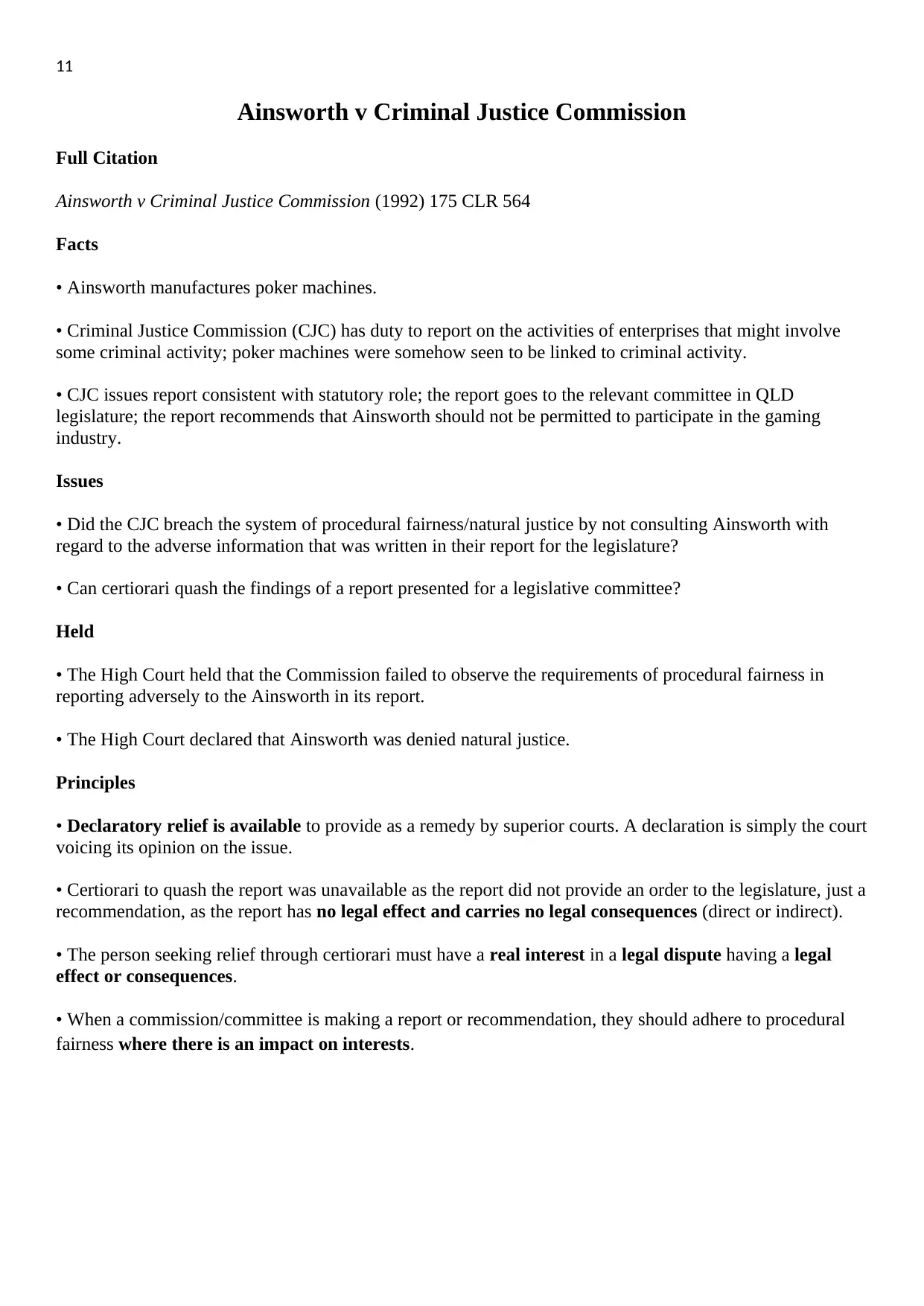
11
Ainsworth v Criminal Justice Commission
Full Citation
Ainsworth v Criminal Justice Commission (1992) 175 CLR 564
Facts
• Ainsworth manufactures poker machines.
• Criminal Justice Commission (CJC) has duty to report on the activities of enterprises that might involve
some criminal activity; poker machines were somehow seen to be linked to criminal activity.
• CJC issues report consistent with statutory role; the report goes to the relevant committee in QLD
legislature; the report recommends that Ainsworth should not be permitted to participate in the gaming
industry.
Issues
• Did the CJC breach the system of procedural fairness/natural justice by not consulting Ainsworth with
regard to the adverse information that was written in their report for the legislature?
• Can certiorari quash the findings of a report presented for a legislative committee?
Held
• The High Court held that the Commission failed to observe the requirements of procedural fairness in
reporting adversely to the Ainsworth in its report.
• The High Court declared that Ainsworth was denied natural justice.
Principles
• Declaratory relief is available to provide as a remedy by superior courts. A declaration is simply the court
voicing its opinion on the issue.
• Certiorari to quash the report was unavailable as the report did not provide an order to the legislature, just a
recommendation, as the report has no legal effect and carries no legal consequences (direct or indirect).
• The person seeking relief through certiorari must have a real interest in a legal dispute having a legal
effect or consequences.
• When a commission/committee is making a report or recommendation, they should adhere to procedural
fairness where there is an impact on interests.
Ainsworth v Criminal Justice Commission
Full Citation
Ainsworth v Criminal Justice Commission (1992) 175 CLR 564
Facts
• Ainsworth manufactures poker machines.
• Criminal Justice Commission (CJC) has duty to report on the activities of enterprises that might involve
some criminal activity; poker machines were somehow seen to be linked to criminal activity.
• CJC issues report consistent with statutory role; the report goes to the relevant committee in QLD
legislature; the report recommends that Ainsworth should not be permitted to participate in the gaming
industry.
Issues
• Did the CJC breach the system of procedural fairness/natural justice by not consulting Ainsworth with
regard to the adverse information that was written in their report for the legislature?
• Can certiorari quash the findings of a report presented for a legislative committee?
Held
• The High Court held that the Commission failed to observe the requirements of procedural fairness in
reporting adversely to the Ainsworth in its report.
• The High Court declared that Ainsworth was denied natural justice.
Principles
• Declaratory relief is available to provide as a remedy by superior courts. A declaration is simply the court
voicing its opinion on the issue.
• Certiorari to quash the report was unavailable as the report did not provide an order to the legislature, just a
recommendation, as the report has no legal effect and carries no legal consequences (direct or indirect).
• The person seeking relief through certiorari must have a real interest in a legal dispute having a legal
effect or consequences.
• When a commission/committee is making a report or recommendation, they should adhere to procedural
fairness where there is an impact on interests.
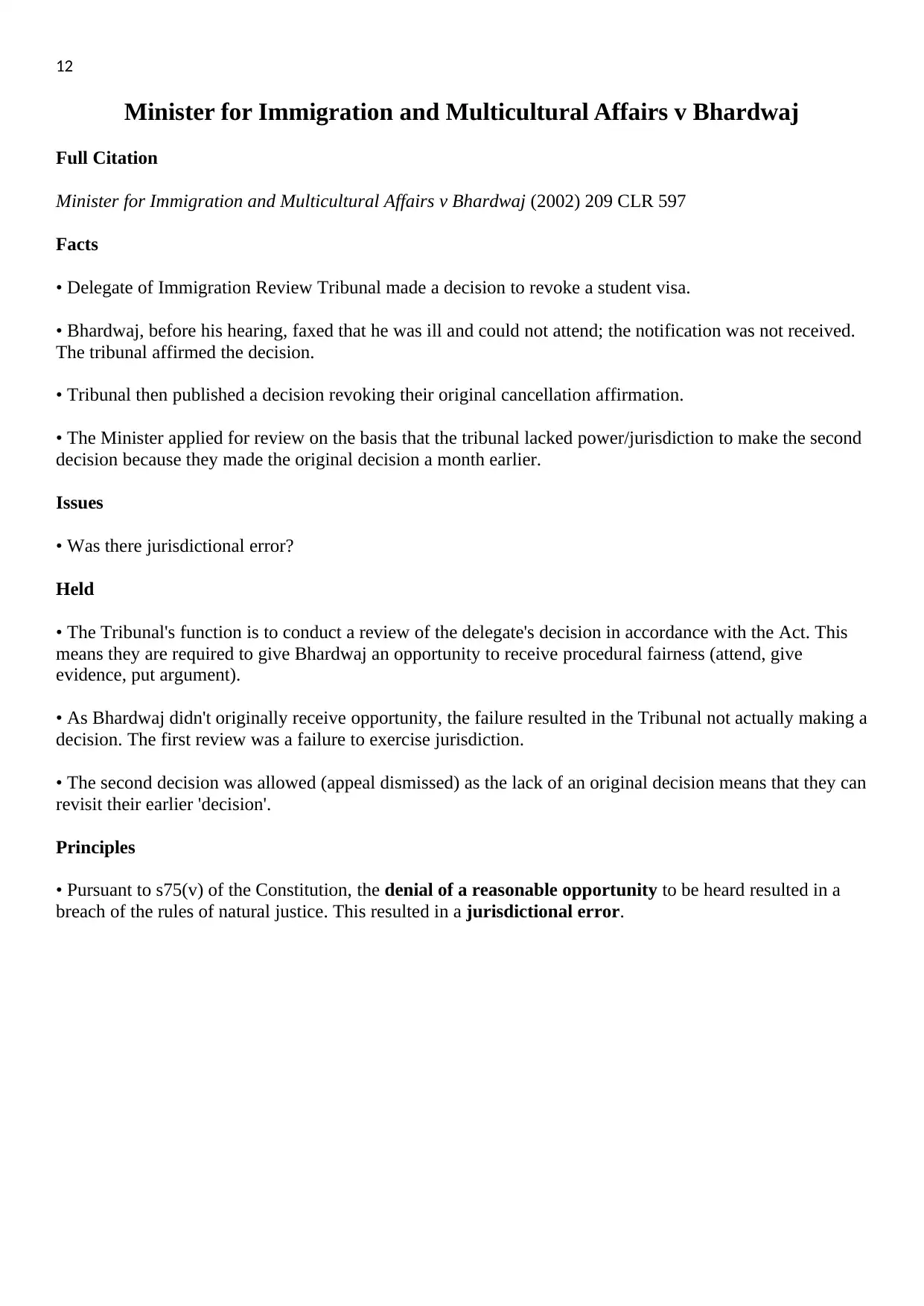
12
Minister for Immigration and Multicultural Affairs v Bhardwaj
Full Citation
Minister for Immigration and Multicultural Affairs v Bhardwaj (2002) 209 CLR 597
Facts
• Delegate of Immigration Review Tribunal made a decision to revoke a student visa.
• Bhardwaj, before his hearing, faxed that he was ill and could not attend; the notification was not received.
The tribunal affirmed the decision.
• Tribunal then published a decision revoking their original cancellation affirmation.
• The Minister applied for review on the basis that the tribunal lacked power/jurisdiction to make the second
decision because they made the original decision a month earlier.
Issues
• Was there jurisdictional error?
Held
• The Tribunal's function is to conduct a review of the delegate's decision in accordance with the Act. This
means they are required to give Bhardwaj an opportunity to receive procedural fairness (attend, give
evidence, put argument).
• As Bhardwaj didn't originally receive opportunity, the failure resulted in the Tribunal not actually making a
decision. The first review was a failure to exercise jurisdiction.
• The second decision was allowed (appeal dismissed) as the lack of an original decision means that they can
revisit their earlier 'decision'.
Principles
• Pursuant to s75(v) of the Constitution, the denial of a reasonable opportunity to be heard resulted in a
breach of the rules of natural justice. This resulted in a jurisdictional error.
Minister for Immigration and Multicultural Affairs v Bhardwaj
Full Citation
Minister for Immigration and Multicultural Affairs v Bhardwaj (2002) 209 CLR 597
Facts
• Delegate of Immigration Review Tribunal made a decision to revoke a student visa.
• Bhardwaj, before his hearing, faxed that he was ill and could not attend; the notification was not received.
The tribunal affirmed the decision.
• Tribunal then published a decision revoking their original cancellation affirmation.
• The Minister applied for review on the basis that the tribunal lacked power/jurisdiction to make the second
decision because they made the original decision a month earlier.
Issues
• Was there jurisdictional error?
Held
• The Tribunal's function is to conduct a review of the delegate's decision in accordance with the Act. This
means they are required to give Bhardwaj an opportunity to receive procedural fairness (attend, give
evidence, put argument).
• As Bhardwaj didn't originally receive opportunity, the failure resulted in the Tribunal not actually making a
decision. The first review was a failure to exercise jurisdiction.
• The second decision was allowed (appeal dismissed) as the lack of an original decision means that they can
revisit their earlier 'decision'.
Principles
• Pursuant to s75(v) of the Constitution, the denial of a reasonable opportunity to be heard resulted in a
breach of the rules of natural justice. This resulted in a jurisdictional error.
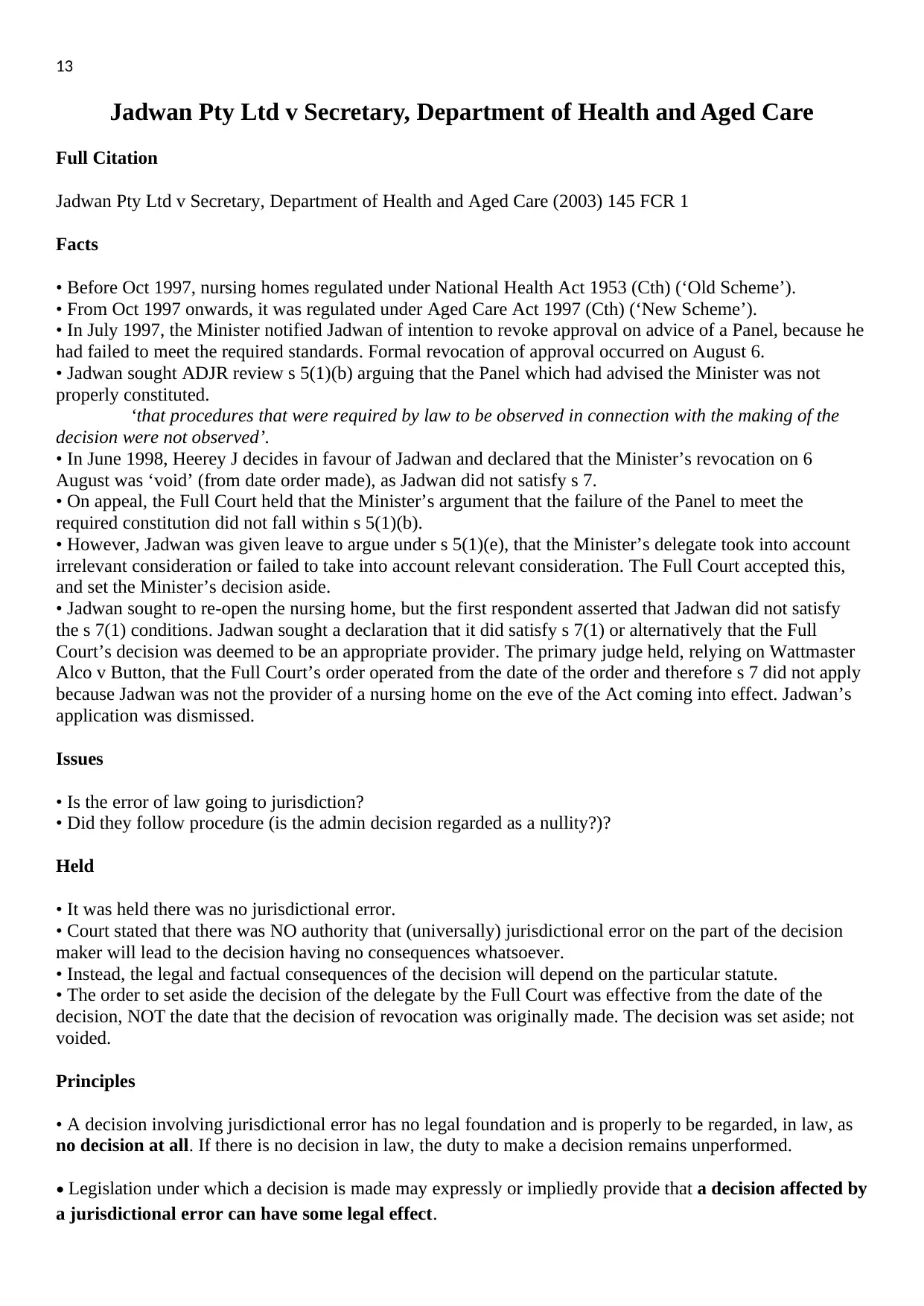
13
Jadwan Pty Ltd v Secretary, Department of Health and Aged Care
Full Citation
Jadwan Pty Ltd v Secretary, Department of Health and Aged Care (2003) 145 FCR 1
Facts
• Before Oct 1997, nursing homes regulated under National Health Act 1953 (Cth) (‘Old Scheme’).
• From Oct 1997 onwards, it was regulated under Aged Care Act 1997 (Cth) (‘New Scheme’).
• In July 1997, the Minister notified Jadwan of intention to revoke approval on advice of a Panel, because he
had failed to meet the required standards. Formal revocation of approval occurred on August 6.
• Jadwan sought ADJR review s 5(1)(b) arguing that the Panel which had advised the Minister was not
properly constituted.
‘that procedures that were required by law to be observed in connection with the making of the
decision were not observed’.
• In June 1998, Heerey J decides in favour of Jadwan and declared that the Minister’s revocation on 6
August was ‘void’ (from date order made), as Jadwan did not satisfy s 7.
• On appeal, the Full Court held that the Minister’s argument that the failure of the Panel to meet the
required constitution did not fall within s 5(1)(b).
• However, Jadwan was given leave to argue under s 5(1)(e), that the Minister’s delegate took into account
irrelevant consideration or failed to take into account relevant consideration. The Full Court accepted this,
and set the Minister’s decision aside.
• Jadwan sought to re-open the nursing home, but the first respondent asserted that Jadwan did not satisfy
the s 7(1) conditions. Jadwan sought a declaration that it did satisfy s 7(1) or alternatively that the Full
Court’s decision was deemed to be an appropriate provider. The primary judge held, relying on Wattmaster
Alco v Button, that the Full Court’s order operated from the date of the order and therefore s 7 did not apply
because Jadwan was not the provider of a nursing home on the eve of the Act coming into effect. Jadwan’s
application was dismissed.
Issues
• Is the error of law going to jurisdiction?
• Did they follow procedure (is the admin decision regarded as a nullity?)?
Held
• It was held there was no jurisdictional error.
• Court stated that there was NO authority that (universally) jurisdictional error on the part of the decision
maker will lead to the decision having no consequences whatsoever.
• Instead, the legal and factual consequences of the decision will depend on the particular statute.
• The order to set aside the decision of the delegate by the Full Court was effective from the date of the
decision, NOT the date that the decision of revocation was originally made. The decision was set aside; not
voided.
Principles
• A decision involving jurisdictional error has no legal foundation and is properly to be regarded, in law, as
no decision at all. If there is no decision in law, the duty to make a decision remains unperformed.
• Legislation under which a decision is made may expressly or impliedly provide that a decision affected by
a jurisdictional error can have some legal effect.
Jadwan Pty Ltd v Secretary, Department of Health and Aged Care
Full Citation
Jadwan Pty Ltd v Secretary, Department of Health and Aged Care (2003) 145 FCR 1
Facts
• Before Oct 1997, nursing homes regulated under National Health Act 1953 (Cth) (‘Old Scheme’).
• From Oct 1997 onwards, it was regulated under Aged Care Act 1997 (Cth) (‘New Scheme’).
• In July 1997, the Minister notified Jadwan of intention to revoke approval on advice of a Panel, because he
had failed to meet the required standards. Formal revocation of approval occurred on August 6.
• Jadwan sought ADJR review s 5(1)(b) arguing that the Panel which had advised the Minister was not
properly constituted.
‘that procedures that were required by law to be observed in connection with the making of the
decision were not observed’.
• In June 1998, Heerey J decides in favour of Jadwan and declared that the Minister’s revocation on 6
August was ‘void’ (from date order made), as Jadwan did not satisfy s 7.
• On appeal, the Full Court held that the Minister’s argument that the failure of the Panel to meet the
required constitution did not fall within s 5(1)(b).
• However, Jadwan was given leave to argue under s 5(1)(e), that the Minister’s delegate took into account
irrelevant consideration or failed to take into account relevant consideration. The Full Court accepted this,
and set the Minister’s decision aside.
• Jadwan sought to re-open the nursing home, but the first respondent asserted that Jadwan did not satisfy
the s 7(1) conditions. Jadwan sought a declaration that it did satisfy s 7(1) or alternatively that the Full
Court’s decision was deemed to be an appropriate provider. The primary judge held, relying on Wattmaster
Alco v Button, that the Full Court’s order operated from the date of the order and therefore s 7 did not apply
because Jadwan was not the provider of a nursing home on the eve of the Act coming into effect. Jadwan’s
application was dismissed.
Issues
• Is the error of law going to jurisdiction?
• Did they follow procedure (is the admin decision regarded as a nullity?)?
Held
• It was held there was no jurisdictional error.
• Court stated that there was NO authority that (universally) jurisdictional error on the part of the decision
maker will lead to the decision having no consequences whatsoever.
• Instead, the legal and factual consequences of the decision will depend on the particular statute.
• The order to set aside the decision of the delegate by the Full Court was effective from the date of the
decision, NOT the date that the decision of revocation was originally made. The decision was set aside; not
voided.
Principles
• A decision involving jurisdictional error has no legal foundation and is properly to be regarded, in law, as
no decision at all. If there is no decision in law, the duty to make a decision remains unperformed.
• Legislation under which a decision is made may expressly or impliedly provide that a decision affected by
a jurisdictional error can have some legal effect.
Paraphrase This Document
Need a fresh take? Get an instant paraphrase of this document with our AI Paraphraser
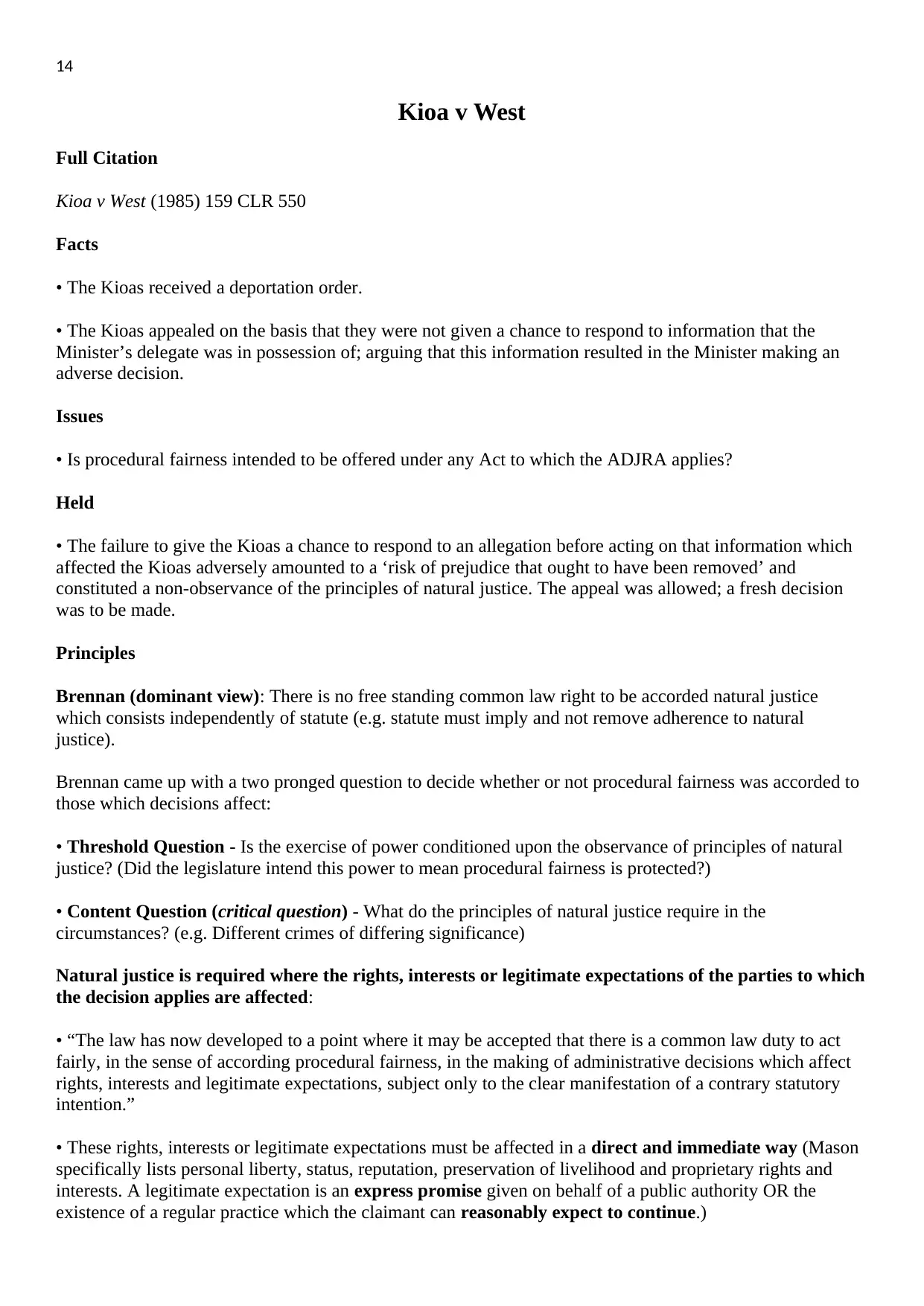
14
Kioa v West
Full Citation
Kioa v West (1985) 159 CLR 550
Facts
• The Kioas received a deportation order.
• The Kioas appealed on the basis that they were not given a chance to respond to information that the
Minister’s delegate was in possession of; arguing that this information resulted in the Minister making an
adverse decision.
Issues
• Is procedural fairness intended to be offered under any Act to which the ADJRA applies?
Held
• The failure to give the Kioas a chance to respond to an allegation before acting on that information which
affected the Kioas adversely amounted to a ‘risk of prejudice that ought to have been removed’ and
constituted a non-observance of the principles of natural justice. The appeal was allowed; a fresh decision
was to be made.
Principles
Brennan (dominant view): There is no free standing common law right to be accorded natural justice
which consists independently of statute (e.g. statute must imply and not remove adherence to natural
justice).
Brennan came up with a two pronged question to decide whether or not procedural fairness was accorded to
those which decisions affect:
• Threshold Question - Is the exercise of power conditioned upon the observance of principles of natural
justice? (Did the legislature intend this power to mean procedural fairness is protected?)
• Content Question (critical question) - What do the principles of natural justice require in the
circumstances? (e.g. Different crimes of differing significance)
Natural justice is required where the rights, interests or legitimate expectations of the parties to which
the decision applies are affected:
• “The law has now developed to a point where it may be accepted that there is a common law duty to act
fairly, in the sense of according procedural fairness, in the making of administrative decisions which affect
rights, interests and legitimate expectations, subject only to the clear manifestation of a contrary statutory
intention.”
• These rights, interests or legitimate expectations must be affected in a direct and immediate way (Mason
specifically lists personal liberty, status, reputation, preservation of livelihood and proprietary rights and
interests. A legitimate expectation is an express promise given on behalf of a public authority OR the
existence of a regular practice which the claimant can reasonably expect to continue.)
Kioa v West
Full Citation
Kioa v West (1985) 159 CLR 550
Facts
• The Kioas received a deportation order.
• The Kioas appealed on the basis that they were not given a chance to respond to information that the
Minister’s delegate was in possession of; arguing that this information resulted in the Minister making an
adverse decision.
Issues
• Is procedural fairness intended to be offered under any Act to which the ADJRA applies?
Held
• The failure to give the Kioas a chance to respond to an allegation before acting on that information which
affected the Kioas adversely amounted to a ‘risk of prejudice that ought to have been removed’ and
constituted a non-observance of the principles of natural justice. The appeal was allowed; a fresh decision
was to be made.
Principles
Brennan (dominant view): There is no free standing common law right to be accorded natural justice
which consists independently of statute (e.g. statute must imply and not remove adherence to natural
justice).
Brennan came up with a two pronged question to decide whether or not procedural fairness was accorded to
those which decisions affect:
• Threshold Question - Is the exercise of power conditioned upon the observance of principles of natural
justice? (Did the legislature intend this power to mean procedural fairness is protected?)
• Content Question (critical question) - What do the principles of natural justice require in the
circumstances? (e.g. Different crimes of differing significance)
Natural justice is required where the rights, interests or legitimate expectations of the parties to which
the decision applies are affected:
• “The law has now developed to a point where it may be accepted that there is a common law duty to act
fairly, in the sense of according procedural fairness, in the making of administrative decisions which affect
rights, interests and legitimate expectations, subject only to the clear manifestation of a contrary statutory
intention.”
• These rights, interests or legitimate expectations must be affected in a direct and immediate way (Mason
specifically lists personal liberty, status, reputation, preservation of livelihood and proprietary rights and
interests. A legitimate expectation is an express promise given on behalf of a public authority OR the
existence of a regular practice which the claimant can reasonably expect to continue.)
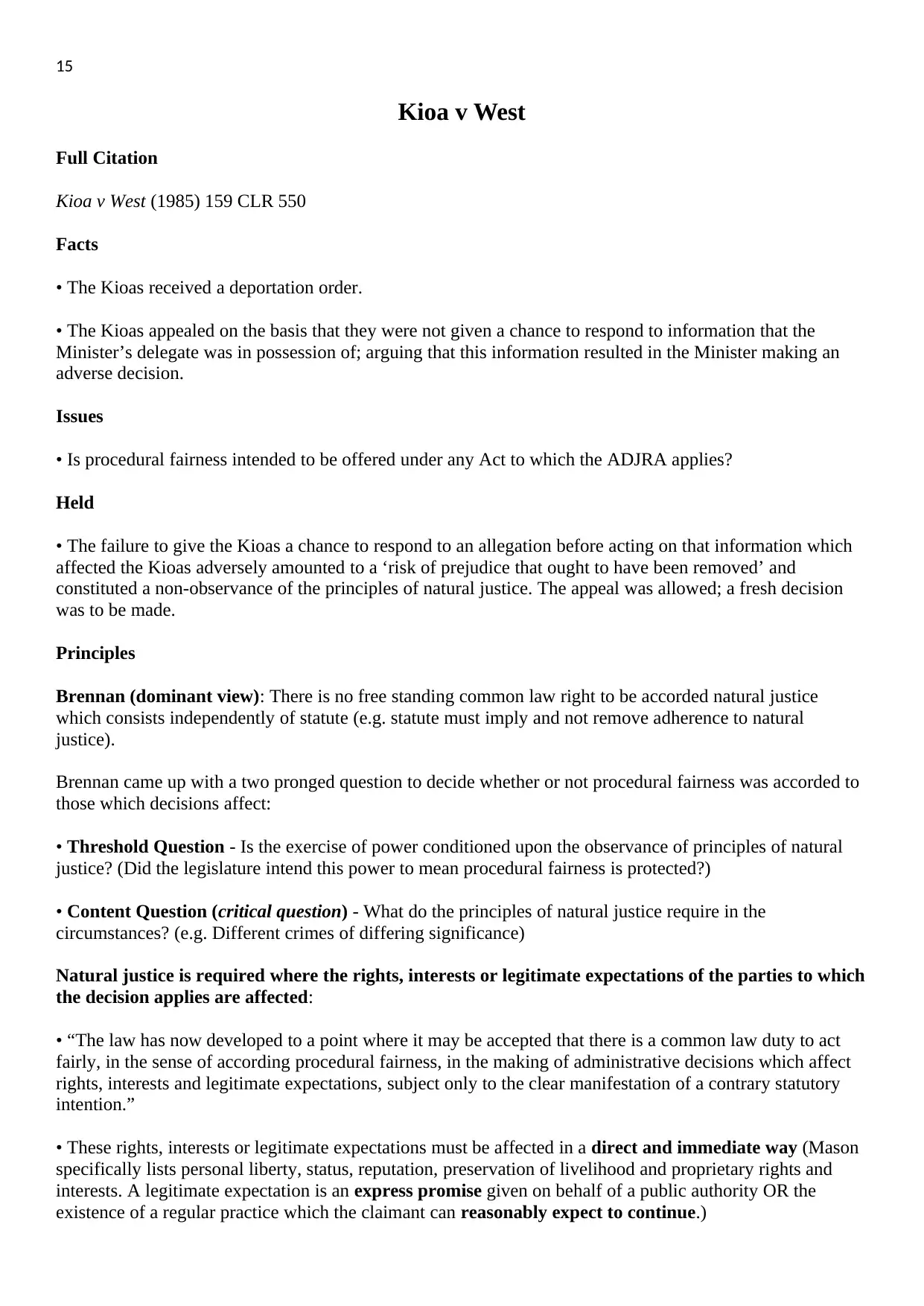
15
Kioa v West
Full Citation
Kioa v West (1985) 159 CLR 550
Facts
• The Kioas received a deportation order.
• The Kioas appealed on the basis that they were not given a chance to respond to information that the
Minister’s delegate was in possession of; arguing that this information resulted in the Minister making an
adverse decision.
Issues
• Is procedural fairness intended to be offered under any Act to which the ADJRA applies?
Held
• The failure to give the Kioas a chance to respond to an allegation before acting on that information which
affected the Kioas adversely amounted to a ‘risk of prejudice that ought to have been removed’ and
constituted a non-observance of the principles of natural justice. The appeal was allowed; a fresh decision
was to be made.
Principles
Brennan (dominant view): There is no free standing common law right to be accorded natural justice
which consists independently of statute (e.g. statute must imply and not remove adherence to natural
justice).
Brennan came up with a two pronged question to decide whether or not procedural fairness was accorded to
those which decisions affect:
• Threshold Question - Is the exercise of power conditioned upon the observance of principles of natural
justice? (Did the legislature intend this power to mean procedural fairness is protected?)
• Content Question (critical question) - What do the principles of natural justice require in the
circumstances? (e.g. Different crimes of differing significance)
Natural justice is required where the rights, interests or legitimate expectations of the parties to which
the decision applies are affected:
• “The law has now developed to a point where it may be accepted that there is a common law duty to act
fairly, in the sense of according procedural fairness, in the making of administrative decisions which affect
rights, interests and legitimate expectations, subject only to the clear manifestation of a contrary statutory
intention.”
• These rights, interests or legitimate expectations must be affected in a direct and immediate way (Mason
specifically lists personal liberty, status, reputation, preservation of livelihood and proprietary rights and
interests. A legitimate expectation is an express promise given on behalf of a public authority OR the
existence of a regular practice which the claimant can reasonably expect to continue.)
Kioa v West
Full Citation
Kioa v West (1985) 159 CLR 550
Facts
• The Kioas received a deportation order.
• The Kioas appealed on the basis that they were not given a chance to respond to information that the
Minister’s delegate was in possession of; arguing that this information resulted in the Minister making an
adverse decision.
Issues
• Is procedural fairness intended to be offered under any Act to which the ADJRA applies?
Held
• The failure to give the Kioas a chance to respond to an allegation before acting on that information which
affected the Kioas adversely amounted to a ‘risk of prejudice that ought to have been removed’ and
constituted a non-observance of the principles of natural justice. The appeal was allowed; a fresh decision
was to be made.
Principles
Brennan (dominant view): There is no free standing common law right to be accorded natural justice
which consists independently of statute (e.g. statute must imply and not remove adherence to natural
justice).
Brennan came up with a two pronged question to decide whether or not procedural fairness was accorded to
those which decisions affect:
• Threshold Question - Is the exercise of power conditioned upon the observance of principles of natural
justice? (Did the legislature intend this power to mean procedural fairness is protected?)
• Content Question (critical question) - What do the principles of natural justice require in the
circumstances? (e.g. Different crimes of differing significance)
Natural justice is required where the rights, interests or legitimate expectations of the parties to which
the decision applies are affected:
• “The law has now developed to a point where it may be accepted that there is a common law duty to act
fairly, in the sense of according procedural fairness, in the making of administrative decisions which affect
rights, interests and legitimate expectations, subject only to the clear manifestation of a contrary statutory
intention.”
• These rights, interests or legitimate expectations must be affected in a direct and immediate way (Mason
specifically lists personal liberty, status, reputation, preservation of livelihood and proprietary rights and
interests. A legitimate expectation is an express promise given on behalf of a public authority OR the
existence of a regular practice which the claimant can reasonably expect to continue.)
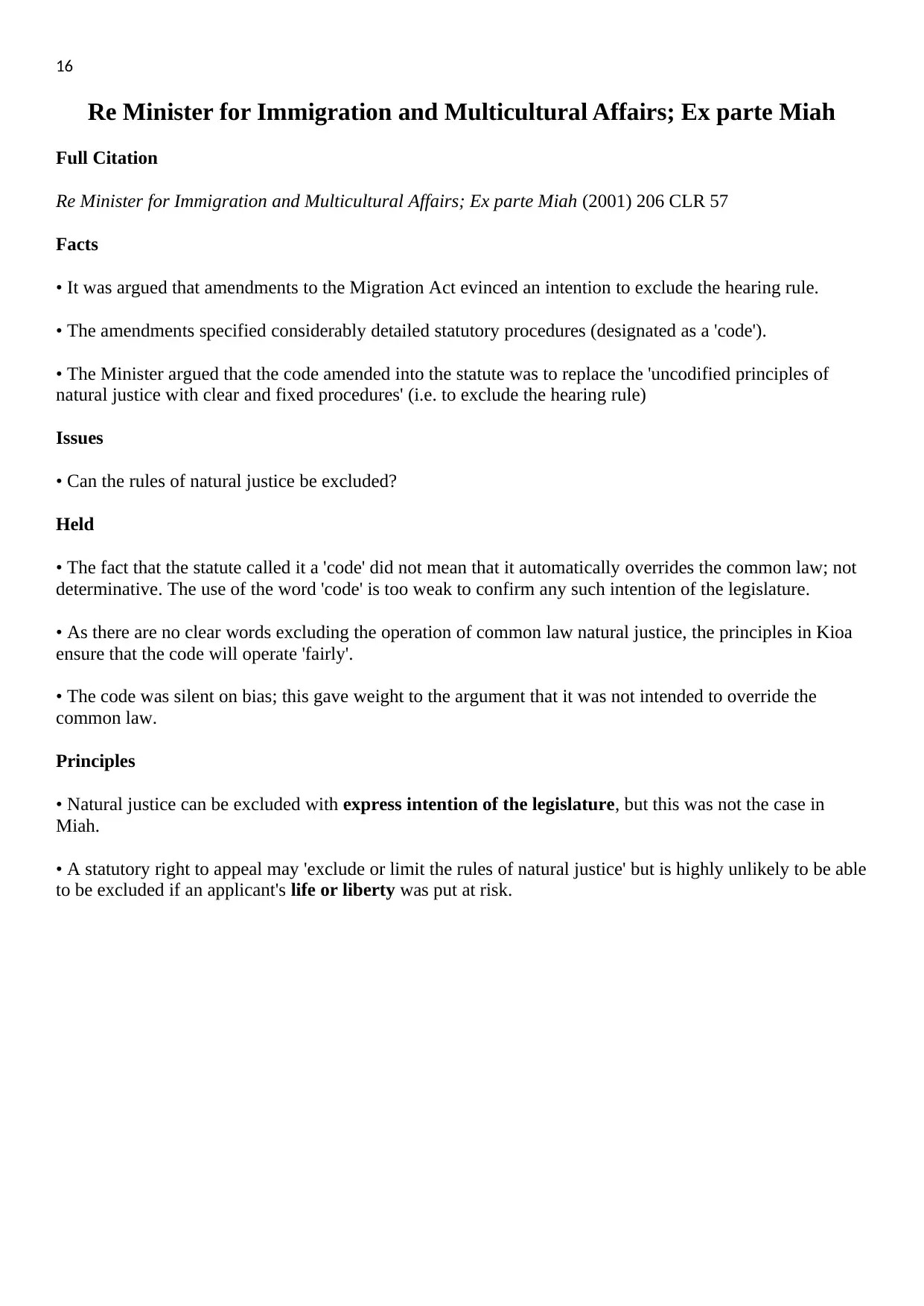
16
Re Minister for Immigration and Multicultural Affairs; Ex parte Miah
Full Citation
Re Minister for Immigration and Multicultural Affairs; Ex parte Miah (2001) 206 CLR 57
Facts
• It was argued that amendments to the Migration Act evinced an intention to exclude the hearing rule.
• The amendments specified considerably detailed statutory procedures (designated as a 'code').
• The Minister argued that the code amended into the statute was to replace the 'uncodified principles of
natural justice with clear and fixed procedures' (i.e. to exclude the hearing rule)
Issues
• Can the rules of natural justice be excluded?
Held
• The fact that the statute called it a 'code' did not mean that it automatically overrides the common law; not
determinative. The use of the word 'code' is too weak to confirm any such intention of the legislature.
• As there are no clear words excluding the operation of common law natural justice, the principles in Kioa
ensure that the code will operate 'fairly'.
• The code was silent on bias; this gave weight to the argument that it was not intended to override the
common law.
Principles
• Natural justice can be excluded with express intention of the legislature, but this was not the case in
Miah.
• A statutory right to appeal may 'exclude or limit the rules of natural justice' but is highly unlikely to be able
to be excluded if an applicant's life or liberty was put at risk.
Re Minister for Immigration and Multicultural Affairs; Ex parte Miah
Full Citation
Re Minister for Immigration and Multicultural Affairs; Ex parte Miah (2001) 206 CLR 57
Facts
• It was argued that amendments to the Migration Act evinced an intention to exclude the hearing rule.
• The amendments specified considerably detailed statutory procedures (designated as a 'code').
• The Minister argued that the code amended into the statute was to replace the 'uncodified principles of
natural justice with clear and fixed procedures' (i.e. to exclude the hearing rule)
Issues
• Can the rules of natural justice be excluded?
Held
• The fact that the statute called it a 'code' did not mean that it automatically overrides the common law; not
determinative. The use of the word 'code' is too weak to confirm any such intention of the legislature.
• As there are no clear words excluding the operation of common law natural justice, the principles in Kioa
ensure that the code will operate 'fairly'.
• The code was silent on bias; this gave weight to the argument that it was not intended to override the
common law.
Principles
• Natural justice can be excluded with express intention of the legislature, but this was not the case in
Miah.
• A statutory right to appeal may 'exclude or limit the rules of natural justice' but is highly unlikely to be able
to be excluded if an applicant's life or liberty was put at risk.
Secure Best Marks with AI Grader
Need help grading? Try our AI Grader for instant feedback on your assignments.
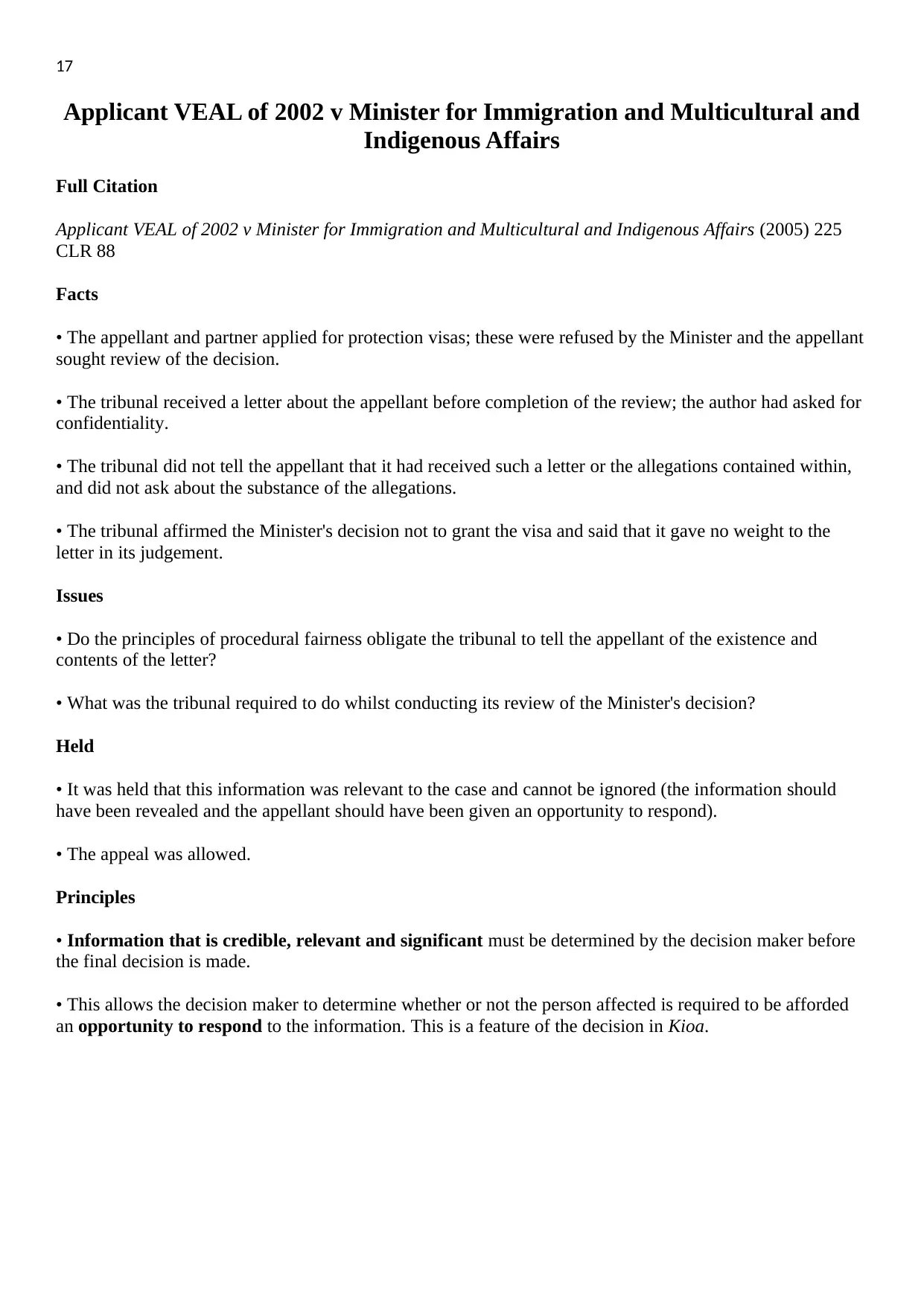
17
Applicant VEAL of 2002 v Minister for Immigration and Multicultural and
Indigenous Affairs
Full Citation
Applicant VEAL of 2002 v Minister for Immigration and Multicultural and Indigenous Affairs (2005) 225
CLR 88
Facts
• The appellant and partner applied for protection visas; these were refused by the Minister and the appellant
sought review of the decision.
• The tribunal received a letter about the appellant before completion of the review; the author had asked for
confidentiality.
• The tribunal did not tell the appellant that it had received such a letter or the allegations contained within,
and did not ask about the substance of the allegations.
• The tribunal affirmed the Minister's decision not to grant the visa and said that it gave no weight to the
letter in its judgement.
Issues
• Do the principles of procedural fairness obligate the tribunal to tell the appellant of the existence and
contents of the letter?
• What was the tribunal required to do whilst conducting its review of the Minister's decision?
Held
• It was held that this information was relevant to the case and cannot be ignored (the information should
have been revealed and the appellant should have been given an opportunity to respond).
• The appeal was allowed.
Principles
• Information that is credible, relevant and significant must be determined by the decision maker before
the final decision is made.
• This allows the decision maker to determine whether or not the person affected is required to be afforded
an opportunity to respond to the information. This is a feature of the decision in Kioa.
Applicant VEAL of 2002 v Minister for Immigration and Multicultural and
Indigenous Affairs
Full Citation
Applicant VEAL of 2002 v Minister for Immigration and Multicultural and Indigenous Affairs (2005) 225
CLR 88
Facts
• The appellant and partner applied for protection visas; these were refused by the Minister and the appellant
sought review of the decision.
• The tribunal received a letter about the appellant before completion of the review; the author had asked for
confidentiality.
• The tribunal did not tell the appellant that it had received such a letter or the allegations contained within,
and did not ask about the substance of the allegations.
• The tribunal affirmed the Minister's decision not to grant the visa and said that it gave no weight to the
letter in its judgement.
Issues
• Do the principles of procedural fairness obligate the tribunal to tell the appellant of the existence and
contents of the letter?
• What was the tribunal required to do whilst conducting its review of the Minister's decision?
Held
• It was held that this information was relevant to the case and cannot be ignored (the information should
have been revealed and the appellant should have been given an opportunity to respond).
• The appeal was allowed.
Principles
• Information that is credible, relevant and significant must be determined by the decision maker before
the final decision is made.
• This allows the decision maker to determine whether or not the person affected is required to be afforded
an opportunity to respond to the information. This is a feature of the decision in Kioa.
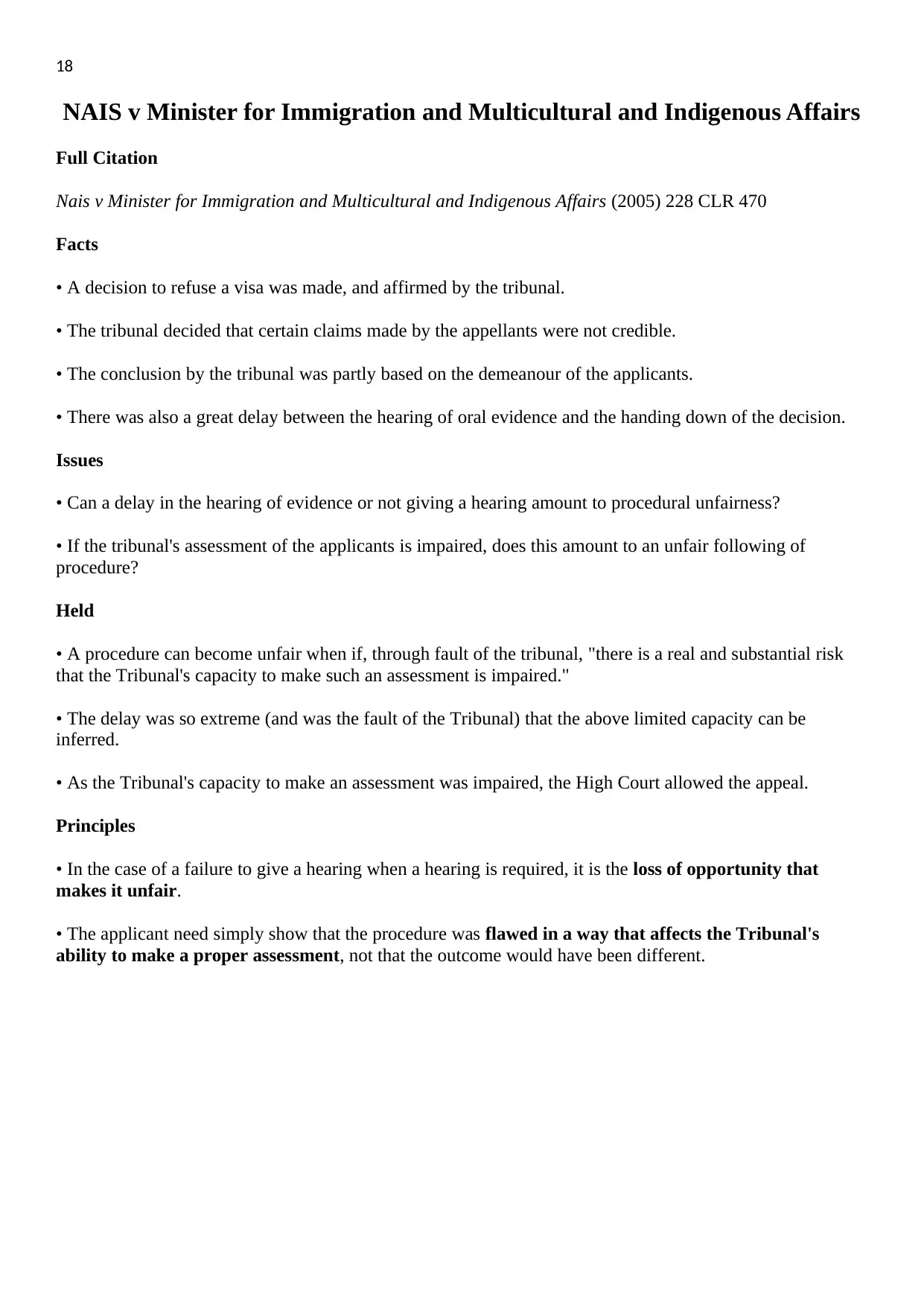
18
NAIS v Minister for Immigration and Multicultural and Indigenous Affairs
Full Citation
Nais v Minister for Immigration and Multicultural and Indigenous Affairs (2005) 228 CLR 470
Facts
• A decision to refuse a visa was made, and affirmed by the tribunal.
• The tribunal decided that certain claims made by the appellants were not credible.
• The conclusion by the tribunal was partly based on the demeanour of the applicants.
• There was also a great delay between the hearing of oral evidence and the handing down of the decision.
Issues
• Can a delay in the hearing of evidence or not giving a hearing amount to procedural unfairness?
• If the tribunal's assessment of the applicants is impaired, does this amount to an unfair following of
procedure?
Held
• A procedure can become unfair when if, through fault of the tribunal, "there is a real and substantial risk
that the Tribunal's capacity to make such an assessment is impaired."
• The delay was so extreme (and was the fault of the Tribunal) that the above limited capacity can be
inferred.
• As the Tribunal's capacity to make an assessment was impaired, the High Court allowed the appeal.
Principles
• In the case of a failure to give a hearing when a hearing is required, it is the loss of opportunity that
makes it unfair.
• The applicant need simply show that the procedure was flawed in a way that affects the Tribunal's
ability to make a proper assessment, not that the outcome would have been different.
NAIS v Minister for Immigration and Multicultural and Indigenous Affairs
Full Citation
Nais v Minister for Immigration and Multicultural and Indigenous Affairs (2005) 228 CLR 470
Facts
• A decision to refuse a visa was made, and affirmed by the tribunal.
• The tribunal decided that certain claims made by the appellants were not credible.
• The conclusion by the tribunal was partly based on the demeanour of the applicants.
• There was also a great delay between the hearing of oral evidence and the handing down of the decision.
Issues
• Can a delay in the hearing of evidence or not giving a hearing amount to procedural unfairness?
• If the tribunal's assessment of the applicants is impaired, does this amount to an unfair following of
procedure?
Held
• A procedure can become unfair when if, through fault of the tribunal, "there is a real and substantial risk
that the Tribunal's capacity to make such an assessment is impaired."
• The delay was so extreme (and was the fault of the Tribunal) that the above limited capacity can be
inferred.
• As the Tribunal's capacity to make an assessment was impaired, the High Court allowed the appeal.
Principles
• In the case of a failure to give a hearing when a hearing is required, it is the loss of opportunity that
makes it unfair.
• The applicant need simply show that the procedure was flawed in a way that affects the Tribunal's
ability to make a proper assessment, not that the outcome would have been different.
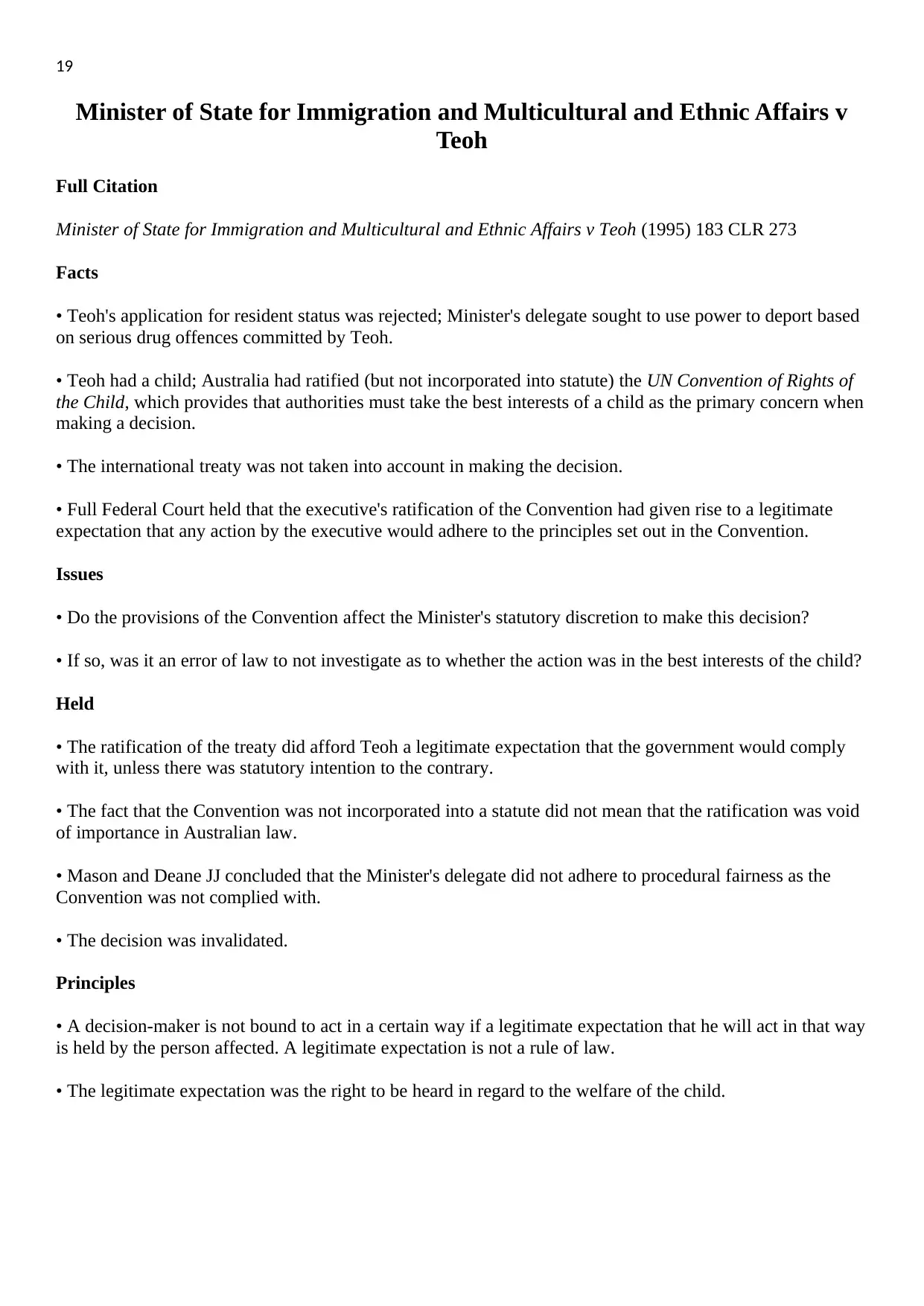
19
Minister of State for Immigration and Multicultural and Ethnic Affairs v
Teoh
Full Citation
Minister of State for Immigration and Multicultural and Ethnic Affairs v Teoh (1995) 183 CLR 273
Facts
• Teoh's application for resident status was rejected; Minister's delegate sought to use power to deport based
on serious drug offences committed by Teoh.
• Teoh had a child; Australia had ratified (but not incorporated into statute) the UN Convention of Rights of
the Child, which provides that authorities must take the best interests of a child as the primary concern when
making a decision.
• The international treaty was not taken into account in making the decision.
• Full Federal Court held that the executive's ratification of the Convention had given rise to a legitimate
expectation that any action by the executive would adhere to the principles set out in the Convention.
Issues
• Do the provisions of the Convention affect the Minister's statutory discretion to make this decision?
• If so, was it an error of law to not investigate as to whether the action was in the best interests of the child?
Held
• The ratification of the treaty did afford Teoh a legitimate expectation that the government would comply
with it, unless there was statutory intention to the contrary.
• The fact that the Convention was not incorporated into a statute did not mean that the ratification was void
of importance in Australian law.
• Mason and Deane JJ concluded that the Minister's delegate did not adhere to procedural fairness as the
Convention was not complied with.
• The decision was invalidated.
Principles
• A decision-maker is not bound to act in a certain way if a legitimate expectation that he will act in that way
is held by the person affected. A legitimate expectation is not a rule of law.
• The legitimate expectation was the right to be heard in regard to the welfare of the child.
Minister of State for Immigration and Multicultural and Ethnic Affairs v
Teoh
Full Citation
Minister of State for Immigration and Multicultural and Ethnic Affairs v Teoh (1995) 183 CLR 273
Facts
• Teoh's application for resident status was rejected; Minister's delegate sought to use power to deport based
on serious drug offences committed by Teoh.
• Teoh had a child; Australia had ratified (but not incorporated into statute) the UN Convention of Rights of
the Child, which provides that authorities must take the best interests of a child as the primary concern when
making a decision.
• The international treaty was not taken into account in making the decision.
• Full Federal Court held that the executive's ratification of the Convention had given rise to a legitimate
expectation that any action by the executive would adhere to the principles set out in the Convention.
Issues
• Do the provisions of the Convention affect the Minister's statutory discretion to make this decision?
• If so, was it an error of law to not investigate as to whether the action was in the best interests of the child?
Held
• The ratification of the treaty did afford Teoh a legitimate expectation that the government would comply
with it, unless there was statutory intention to the contrary.
• The fact that the Convention was not incorporated into a statute did not mean that the ratification was void
of importance in Australian law.
• Mason and Deane JJ concluded that the Minister's delegate did not adhere to procedural fairness as the
Convention was not complied with.
• The decision was invalidated.
Principles
• A decision-maker is not bound to act in a certain way if a legitimate expectation that he will act in that way
is held by the person affected. A legitimate expectation is not a rule of law.
• The legitimate expectation was the right to be heard in regard to the welfare of the child.
Paraphrase This Document
Need a fresh take? Get an instant paraphrase of this document with our AI Paraphraser
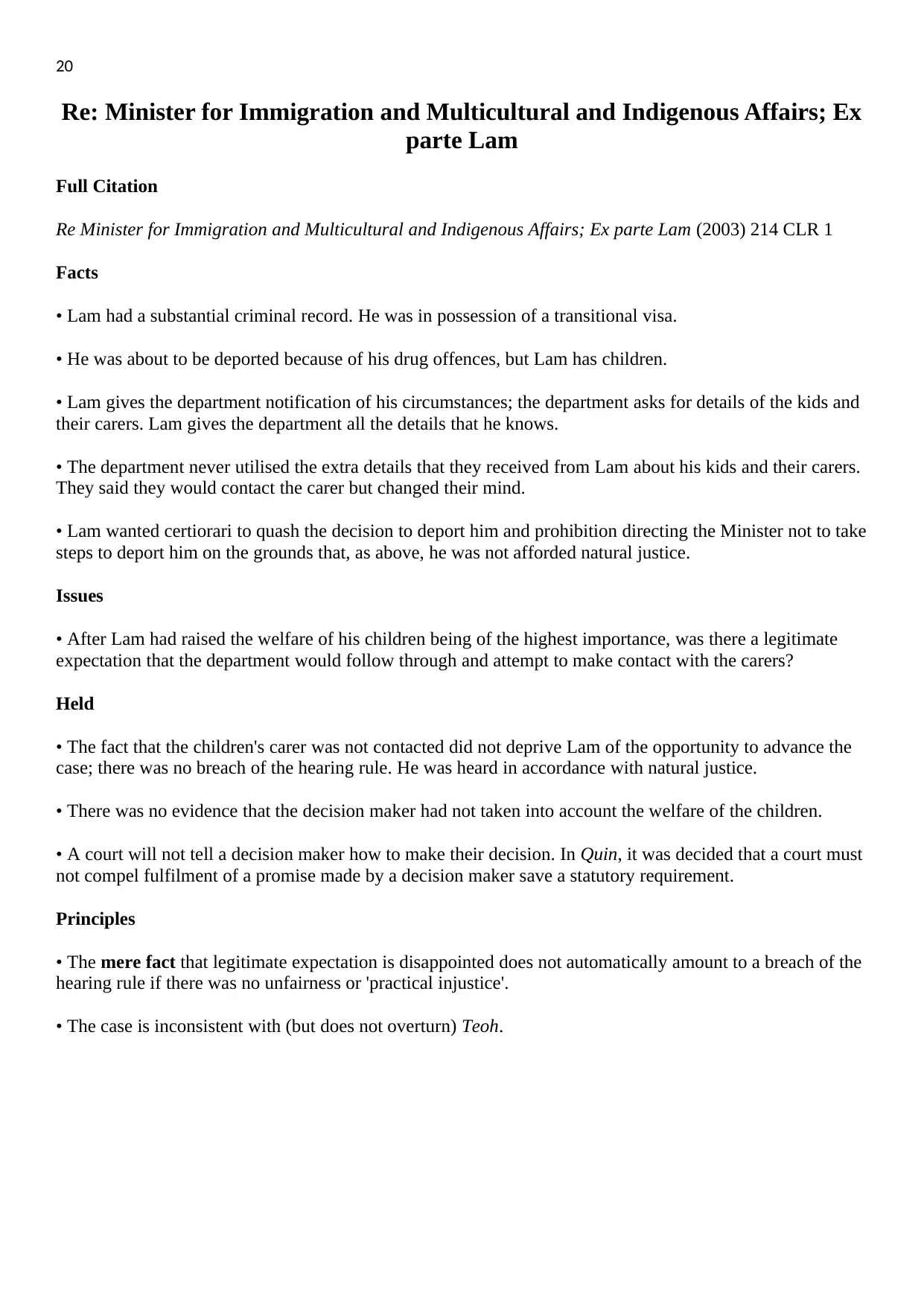
20
Re: Minister for Immigration and Multicultural and Indigenous Affairs; Ex
parte Lam
Full Citation
Re Minister for Immigration and Multicultural and Indigenous Affairs; Ex parte Lam (2003) 214 CLR 1
Facts
• Lam had a substantial criminal record. He was in possession of a transitional visa.
• He was about to be deported because of his drug offences, but Lam has children.
• Lam gives the department notification of his circumstances; the department asks for details of the kids and
their carers. Lam gives the department all the details that he knows.
• The department never utilised the extra details that they received from Lam about his kids and their carers.
They said they would contact the carer but changed their mind.
• Lam wanted certiorari to quash the decision to deport him and prohibition directing the Minister not to take
steps to deport him on the grounds that, as above, he was not afforded natural justice.
Issues
• After Lam had raised the welfare of his children being of the highest importance, was there a legitimate
expectation that the department would follow through and attempt to make contact with the carers?
Held
• The fact that the children's carer was not contacted did not deprive Lam of the opportunity to advance the
case; there was no breach of the hearing rule. He was heard in accordance with natural justice.
• There was no evidence that the decision maker had not taken into account the welfare of the children.
• A court will not tell a decision maker how to make their decision. In Quin, it was decided that a court must
not compel fulfilment of a promise made by a decision maker save a statutory requirement.
Principles
• The mere fact that legitimate expectation is disappointed does not automatically amount to a breach of the
hearing rule if there was no unfairness or 'practical injustice'.
• The case is inconsistent with (but does not overturn) Teoh.
Re: Minister for Immigration and Multicultural and Indigenous Affairs; Ex
parte Lam
Full Citation
Re Minister for Immigration and Multicultural and Indigenous Affairs; Ex parte Lam (2003) 214 CLR 1
Facts
• Lam had a substantial criminal record. He was in possession of a transitional visa.
• He was about to be deported because of his drug offences, but Lam has children.
• Lam gives the department notification of his circumstances; the department asks for details of the kids and
their carers. Lam gives the department all the details that he knows.
• The department never utilised the extra details that they received from Lam about his kids and their carers.
They said they would contact the carer but changed their mind.
• Lam wanted certiorari to quash the decision to deport him and prohibition directing the Minister not to take
steps to deport him on the grounds that, as above, he was not afforded natural justice.
Issues
• After Lam had raised the welfare of his children being of the highest importance, was there a legitimate
expectation that the department would follow through and attempt to make contact with the carers?
Held
• The fact that the children's carer was not contacted did not deprive Lam of the opportunity to advance the
case; there was no breach of the hearing rule. He was heard in accordance with natural justice.
• There was no evidence that the decision maker had not taken into account the welfare of the children.
• A court will not tell a decision maker how to make their decision. In Quin, it was decided that a court must
not compel fulfilment of a promise made by a decision maker save a statutory requirement.
Principles
• The mere fact that legitimate expectation is disappointed does not automatically amount to a breach of the
hearing rule if there was no unfairness or 'practical injustice'.
• The case is inconsistent with (but does not overturn) Teoh.
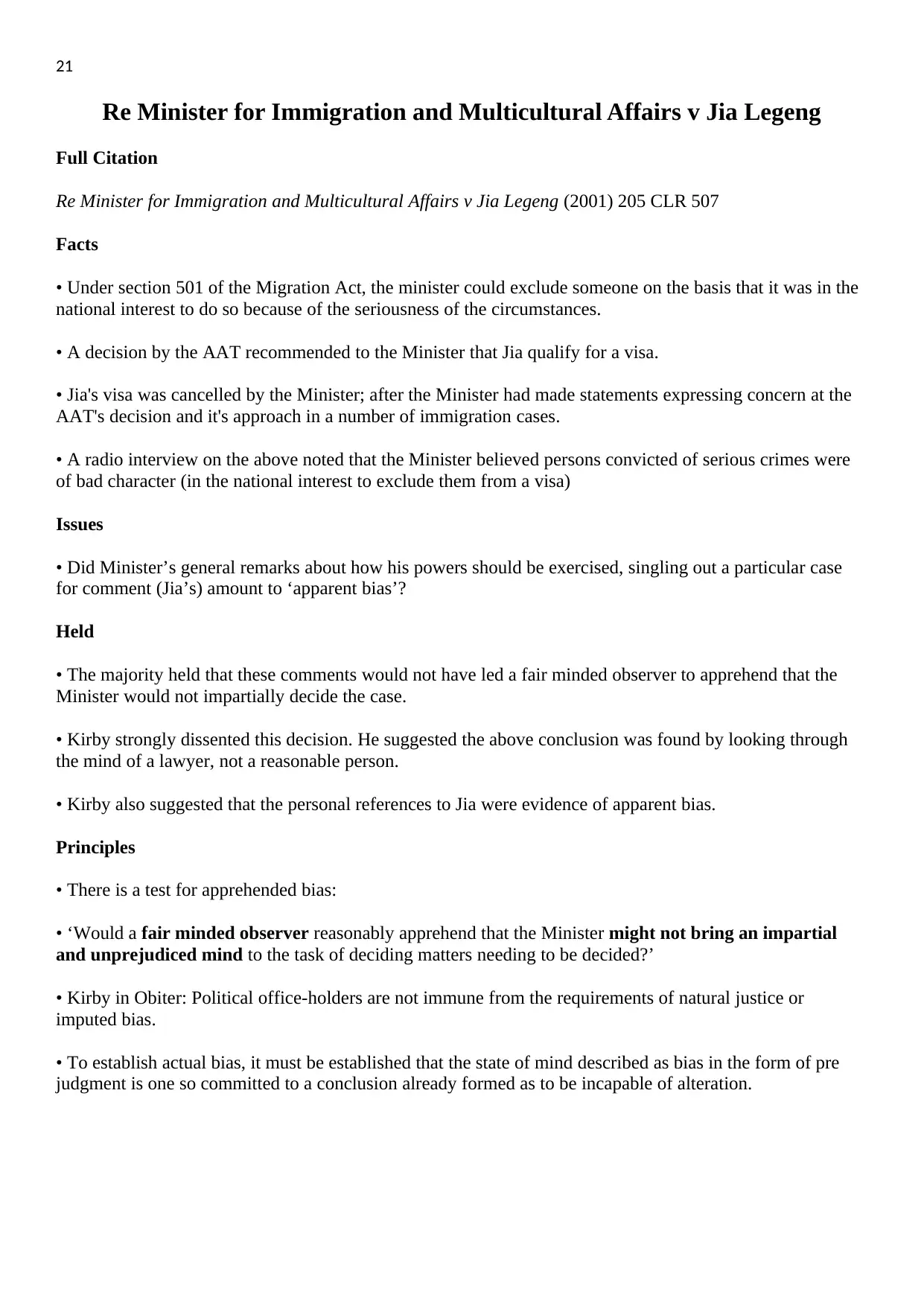
21
Re Minister for Immigration and Multicultural Affairs v Jia Legeng
Full Citation
Re Minister for Immigration and Multicultural Affairs v Jia Legeng (2001) 205 CLR 507
Facts
• Under section 501 of the Migration Act, the minister could exclude someone on the basis that it was in the
national interest to do so because of the seriousness of the circumstances.
• A decision by the AAT recommended to the Minister that Jia qualify for a visa.
• Jia's visa was cancelled by the Minister; after the Minister had made statements expressing concern at the
AAT's decision and it's approach in a number of immigration cases.
• A radio interview on the above noted that the Minister believed persons convicted of serious crimes were
of bad character (in the national interest to exclude them from a visa)
Issues
• Did Minister’s general remarks about how his powers should be exercised, singling out a particular case
for comment (Jia’s) amount to ‘apparent bias’?
Held
• The majority held that these comments would not have led a fair minded observer to apprehend that the
Minister would not impartially decide the case.
• Kirby strongly dissented this decision. He suggested the above conclusion was found by looking through
the mind of a lawyer, not a reasonable person.
• Kirby also suggested that the personal references to Jia were evidence of apparent bias.
Principles
• There is a test for apprehended bias:
• ‘Would a fair minded observer reasonably apprehend that the Minister might not bring an impartial
and unprejudiced mind to the task of deciding matters needing to be decided?’
• Kirby in Obiter: Political office-holders are not immune from the requirements of natural justice or
imputed bias.
• To establish actual bias, it must be established that the state of mind described as bias in the form of pre
judgment is one so committed to a conclusion already formed as to be incapable of alteration.
Re Minister for Immigration and Multicultural Affairs v Jia Legeng
Full Citation
Re Minister for Immigration and Multicultural Affairs v Jia Legeng (2001) 205 CLR 507
Facts
• Under section 501 of the Migration Act, the minister could exclude someone on the basis that it was in the
national interest to do so because of the seriousness of the circumstances.
• A decision by the AAT recommended to the Minister that Jia qualify for a visa.
• Jia's visa was cancelled by the Minister; after the Minister had made statements expressing concern at the
AAT's decision and it's approach in a number of immigration cases.
• A radio interview on the above noted that the Minister believed persons convicted of serious crimes were
of bad character (in the national interest to exclude them from a visa)
Issues
• Did Minister’s general remarks about how his powers should be exercised, singling out a particular case
for comment (Jia’s) amount to ‘apparent bias’?
Held
• The majority held that these comments would not have led a fair minded observer to apprehend that the
Minister would not impartially decide the case.
• Kirby strongly dissented this decision. He suggested the above conclusion was found by looking through
the mind of a lawyer, not a reasonable person.
• Kirby also suggested that the personal references to Jia were evidence of apparent bias.
Principles
• There is a test for apprehended bias:
• ‘Would a fair minded observer reasonably apprehend that the Minister might not bring an impartial
and unprejudiced mind to the task of deciding matters needing to be decided?’
• Kirby in Obiter: Political office-holders are not immune from the requirements of natural justice or
imputed bias.
• To establish actual bias, it must be established that the state of mind described as bias in the form of pre
judgment is one so committed to a conclusion already formed as to be incapable of alteration.
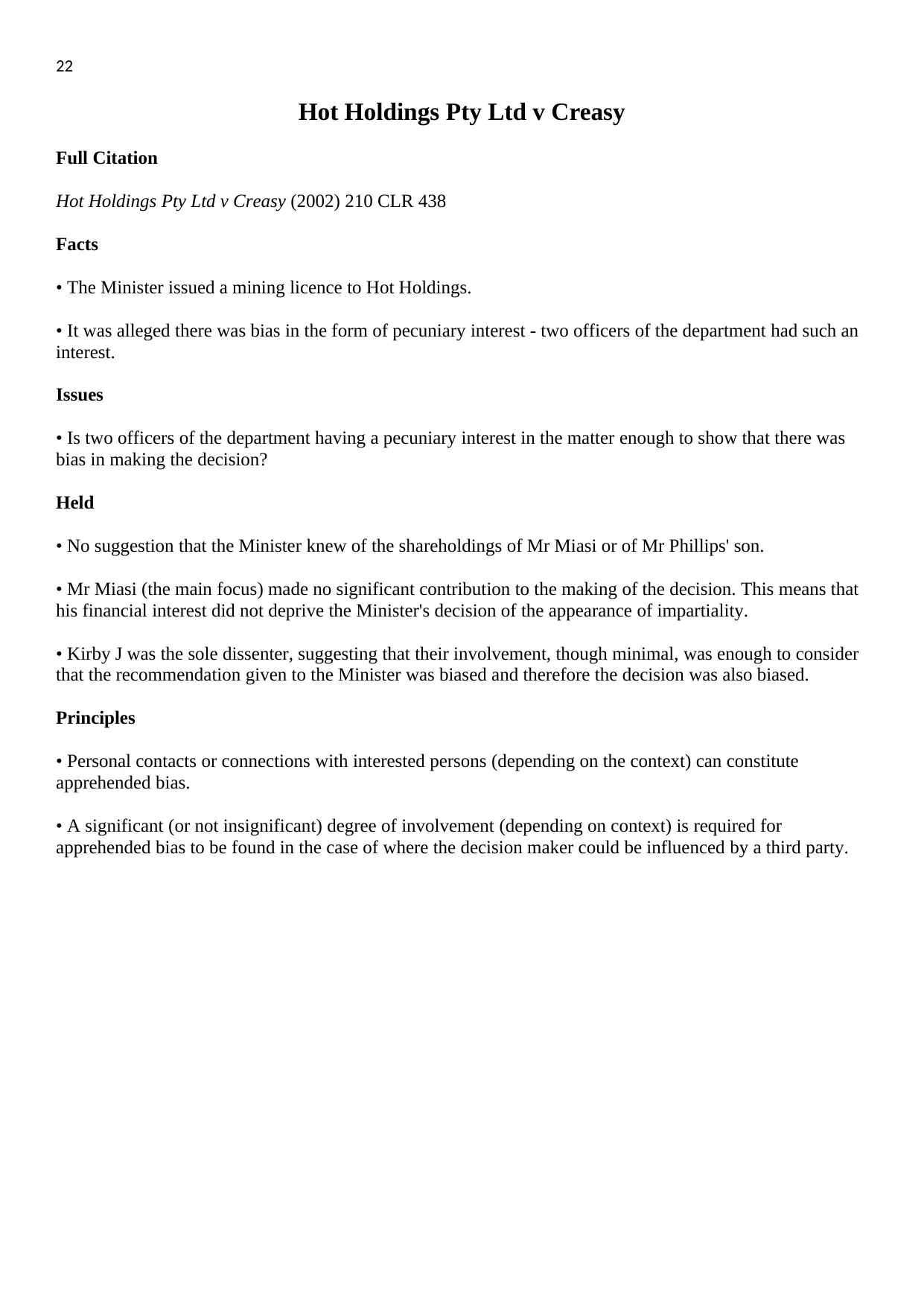
22
Hot Holdings Pty Ltd v Creasy
Full Citation
Hot Holdings Pty Ltd v Creasy (2002) 210 CLR 438
Facts
• The Minister issued a mining licence to Hot Holdings.
• It was alleged there was bias in the form of pecuniary interest - two officers of the department had such an
interest.
Issues
• Is two officers of the department having a pecuniary interest in the matter enough to show that there was
bias in making the decision?
Held
• No suggestion that the Minister knew of the shareholdings of Mr Miasi or of Mr Phillips' son.
• Mr Miasi (the main focus) made no significant contribution to the making of the decision. This means that
his financial interest did not deprive the Minister's decision of the appearance of impartiality.
• Kirby J was the sole dissenter, suggesting that their involvement, though minimal, was enough to consider
that the recommendation given to the Minister was biased and therefore the decision was also biased.
Principles
• Personal contacts or connections with interested persons (depending on the context) can constitute
apprehended bias.
• A significant (or not insignificant) degree of involvement (depending on context) is required for
apprehended bias to be found in the case of where the decision maker could be influenced by a third party.
Hot Holdings Pty Ltd v Creasy
Full Citation
Hot Holdings Pty Ltd v Creasy (2002) 210 CLR 438
Facts
• The Minister issued a mining licence to Hot Holdings.
• It was alleged there was bias in the form of pecuniary interest - two officers of the department had such an
interest.
Issues
• Is two officers of the department having a pecuniary interest in the matter enough to show that there was
bias in making the decision?
Held
• No suggestion that the Minister knew of the shareholdings of Mr Miasi or of Mr Phillips' son.
• Mr Miasi (the main focus) made no significant contribution to the making of the decision. This means that
his financial interest did not deprive the Minister's decision of the appearance of impartiality.
• Kirby J was the sole dissenter, suggesting that their involvement, though minimal, was enough to consider
that the recommendation given to the Minister was biased and therefore the decision was also biased.
Principles
• Personal contacts or connections with interested persons (depending on the context) can constitute
apprehended bias.
• A significant (or not insignificant) degree of involvement (depending on context) is required for
apprehended bias to be found in the case of where the decision maker could be influenced by a third party.
Secure Best Marks with AI Grader
Need help grading? Try our AI Grader for instant feedback on your assignments.
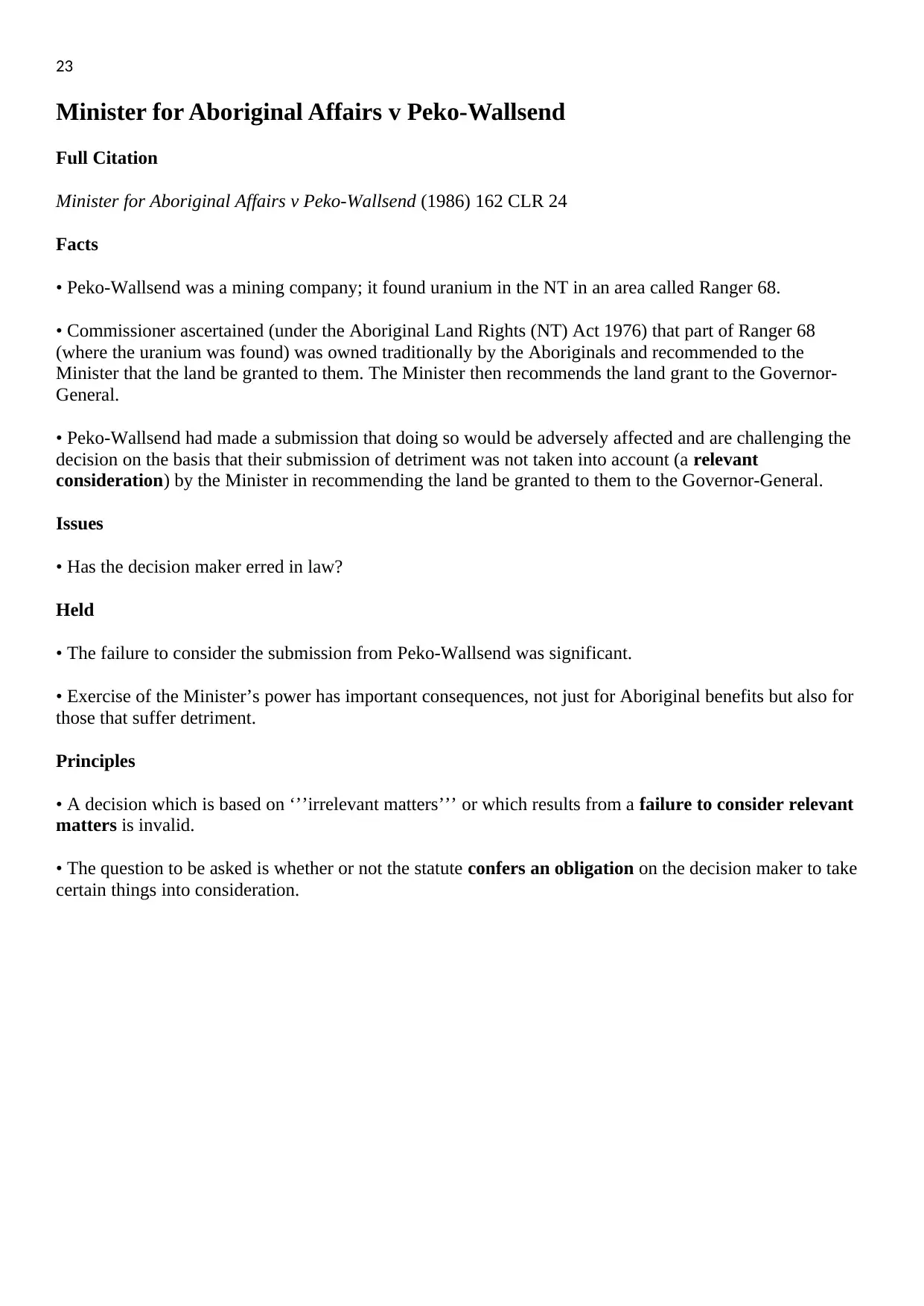
23
Minister for Aboriginal Affairs v Peko-Wallsend
Full Citation
Minister for Aboriginal Affairs v Peko-Wallsend (1986) 162 CLR 24
Facts
• Peko-Wallsend was a mining company; it found uranium in the NT in an area called Ranger 68.
• Commissioner ascertained (under the Aboriginal Land Rights (NT) Act 1976) that part of Ranger 68
(where the uranium was found) was owned traditionally by the Aboriginals and recommended to the
Minister that the land be granted to them. The Minister then recommends the land grant to the Governor-
General.
• Peko-Wallsend had made a submission that doing so would be adversely affected and are challenging the
decision on the basis that their submission of detriment was not taken into account (a relevant
consideration) by the Minister in recommending the land be granted to them to the Governor-General.
Issues
• Has the decision maker erred in law?
Held
• The failure to consider the submission from Peko-Wallsend was significant.
• Exercise of the Minister’s power has important consequences, not just for Aboriginal benefits but also for
those that suffer detriment.
Principles
• A decision which is based on ‘’’irrelevant matters’’’ or which results from a failure to consider relevant
matters is invalid.
• The question to be asked is whether or not the statute confers an obligation on the decision maker to take
certain things into consideration.
Minister for Aboriginal Affairs v Peko-Wallsend
Full Citation
Minister for Aboriginal Affairs v Peko-Wallsend (1986) 162 CLR 24
Facts
• Peko-Wallsend was a mining company; it found uranium in the NT in an area called Ranger 68.
• Commissioner ascertained (under the Aboriginal Land Rights (NT) Act 1976) that part of Ranger 68
(where the uranium was found) was owned traditionally by the Aboriginals and recommended to the
Minister that the land be granted to them. The Minister then recommends the land grant to the Governor-
General.
• Peko-Wallsend had made a submission that doing so would be adversely affected and are challenging the
decision on the basis that their submission of detriment was not taken into account (a relevant
consideration) by the Minister in recommending the land be granted to them to the Governor-General.
Issues
• Has the decision maker erred in law?
Held
• The failure to consider the submission from Peko-Wallsend was significant.
• Exercise of the Minister’s power has important consequences, not just for Aboriginal benefits but also for
those that suffer detriment.
Principles
• A decision which is based on ‘’’irrelevant matters’’’ or which results from a failure to consider relevant
matters is invalid.
• The question to be asked is whether or not the statute confers an obligation on the decision maker to take
certain things into consideration.

24
Minister for Immigration and Multicultural Affairs v Yusuf
Full Citation
Minister for Immigration and Multicultural Affairs v Yusuf (2001) 206 CLR 323
Principles
• McHugh, Gummow and Hayne JJ: ‘The considerations that are, or are not, relevant to the Tribunal’s task
are to be identified primarily, perhaps even entirely, by reference to the Act rather than the particular facts of
the case that the Tribunal is called on to consider.’
Minister for Immigration and Multicultural Affairs v Yusuf
Full Citation
Minister for Immigration and Multicultural Affairs v Yusuf (2001) 206 CLR 323
Principles
• McHugh, Gummow and Hayne JJ: ‘The considerations that are, or are not, relevant to the Tribunal’s task
are to be identified primarily, perhaps even entirely, by reference to the Act rather than the particular facts of
the case that the Tribunal is called on to consider.’
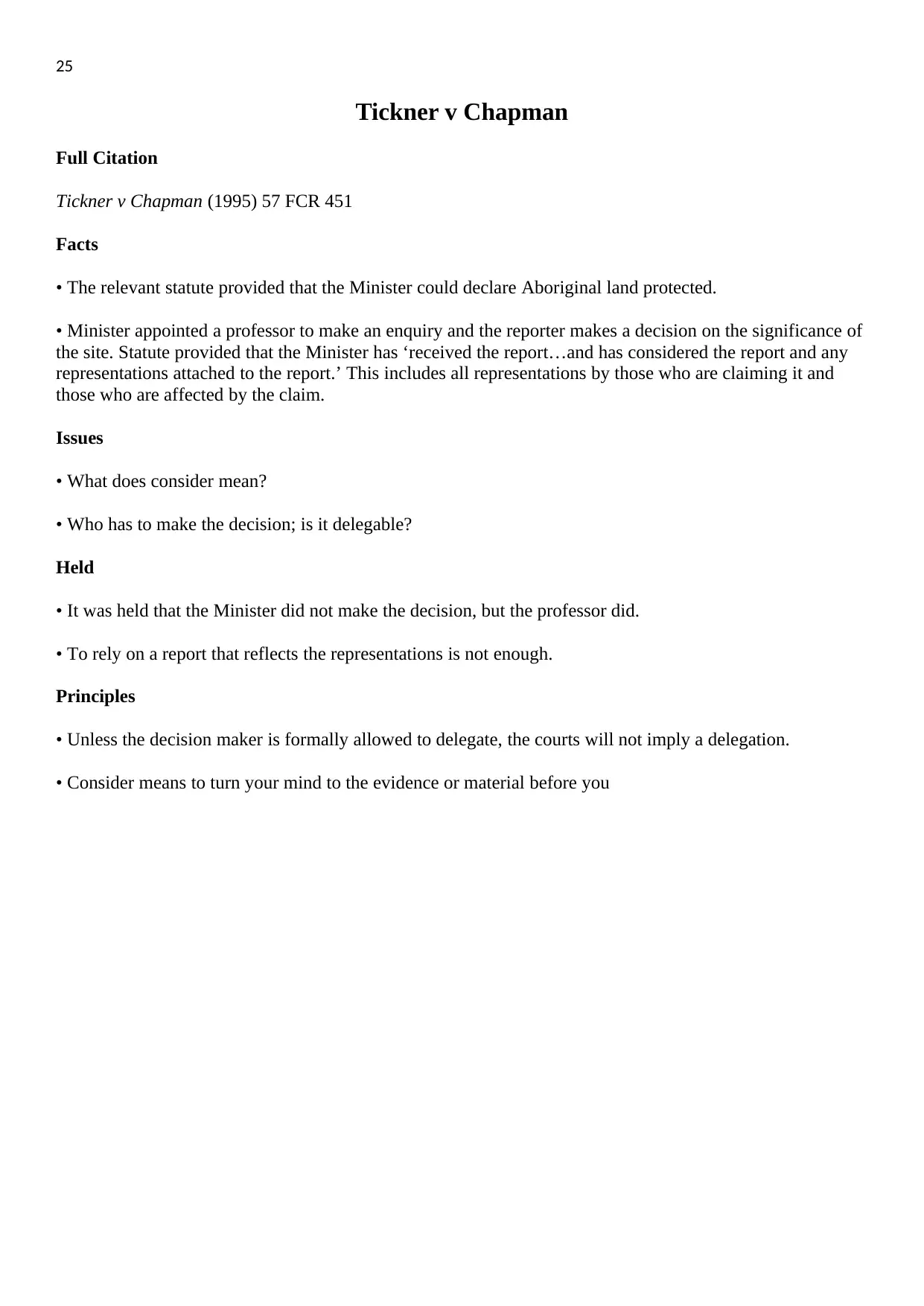
25
Tickner v Chapman
Full Citation
Tickner v Chapman (1995) 57 FCR 451
Facts
• The relevant statute provided that the Minister could declare Aboriginal land protected.
• Minister appointed a professor to make an enquiry and the reporter makes a decision on the significance of
the site. Statute provided that the Minister has ‘received the report…and has considered the report and any
representations attached to the report.’ This includes all representations by those who are claiming it and
those who are affected by the claim.
Issues
• What does consider mean?
• Who has to make the decision; is it delegable?
Held
• It was held that the Minister did not make the decision, but the professor did.
• To rely on a report that reflects the representations is not enough.
Principles
• Unless the decision maker is formally allowed to delegate, the courts will not imply a delegation.
• Consider means to turn your mind to the evidence or material before you
Tickner v Chapman
Full Citation
Tickner v Chapman (1995) 57 FCR 451
Facts
• The relevant statute provided that the Minister could declare Aboriginal land protected.
• Minister appointed a professor to make an enquiry and the reporter makes a decision on the significance of
the site. Statute provided that the Minister has ‘received the report…and has considered the report and any
representations attached to the report.’ This includes all representations by those who are claiming it and
those who are affected by the claim.
Issues
• What does consider mean?
• Who has to make the decision; is it delegable?
Held
• It was held that the Minister did not make the decision, but the professor did.
• To rely on a report that reflects the representations is not enough.
Principles
• Unless the decision maker is formally allowed to delegate, the courts will not imply a delegation.
• Consider means to turn your mind to the evidence or material before you
Paraphrase This Document
Need a fresh take? Get an instant paraphrase of this document with our AI Paraphraser
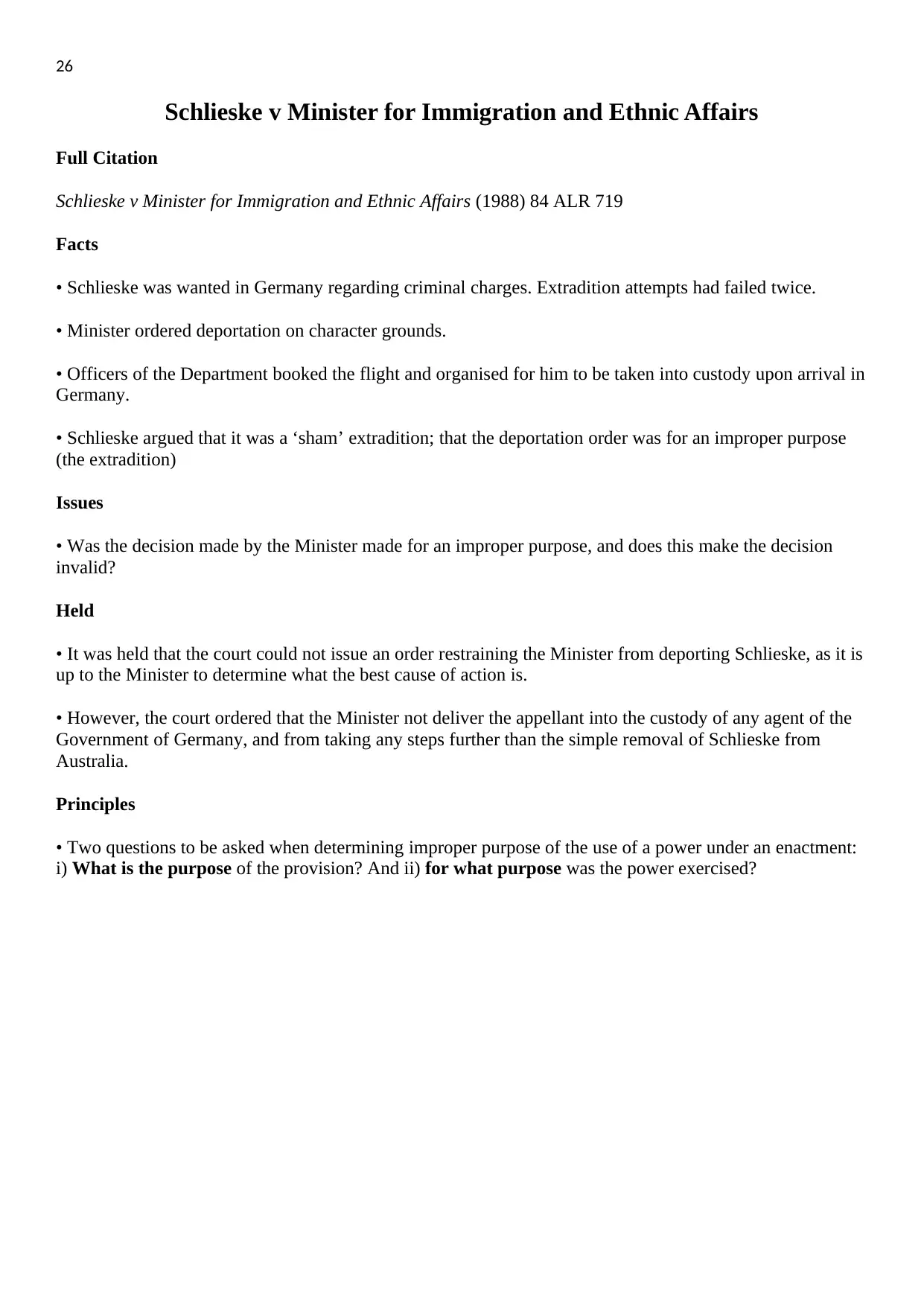
26
Schlieske v Minister for Immigration and Ethnic Affairs
Full Citation
Schlieske v Minister for Immigration and Ethnic Affairs (1988) 84 ALR 719
Facts
• Schlieske was wanted in Germany regarding criminal charges. Extradition attempts had failed twice.
• Minister ordered deportation on character grounds.
• Officers of the Department booked the flight and organised for him to be taken into custody upon arrival in
Germany.
• Schlieske argued that it was a ‘sham’ extradition; that the deportation order was for an improper purpose
(the extradition)
Issues
• Was the decision made by the Minister made for an improper purpose, and does this make the decision
invalid?
Held
• It was held that the court could not issue an order restraining the Minister from deporting Schlieske, as it is
up to the Minister to determine what the best cause of action is.
• However, the court ordered that the Minister not deliver the appellant into the custody of any agent of the
Government of Germany, and from taking any steps further than the simple removal of Schlieske from
Australia.
Principles
• Two questions to be asked when determining improper purpose of the use of a power under an enactment:
i) What is the purpose of the provision? And ii) for what purpose was the power exercised?
Schlieske v Minister for Immigration and Ethnic Affairs
Full Citation
Schlieske v Minister for Immigration and Ethnic Affairs (1988) 84 ALR 719
Facts
• Schlieske was wanted in Germany regarding criminal charges. Extradition attempts had failed twice.
• Minister ordered deportation on character grounds.
• Officers of the Department booked the flight and organised for him to be taken into custody upon arrival in
Germany.
• Schlieske argued that it was a ‘sham’ extradition; that the deportation order was for an improper purpose
(the extradition)
Issues
• Was the decision made by the Minister made for an improper purpose, and does this make the decision
invalid?
Held
• It was held that the court could not issue an order restraining the Minister from deporting Schlieske, as it is
up to the Minister to determine what the best cause of action is.
• However, the court ordered that the Minister not deliver the appellant into the custody of any agent of the
Government of Germany, and from taking any steps further than the simple removal of Schlieske from
Australia.
Principles
• Two questions to be asked when determining improper purpose of the use of a power under an enactment:
i) What is the purpose of the provision? And ii) for what purpose was the power exercised?
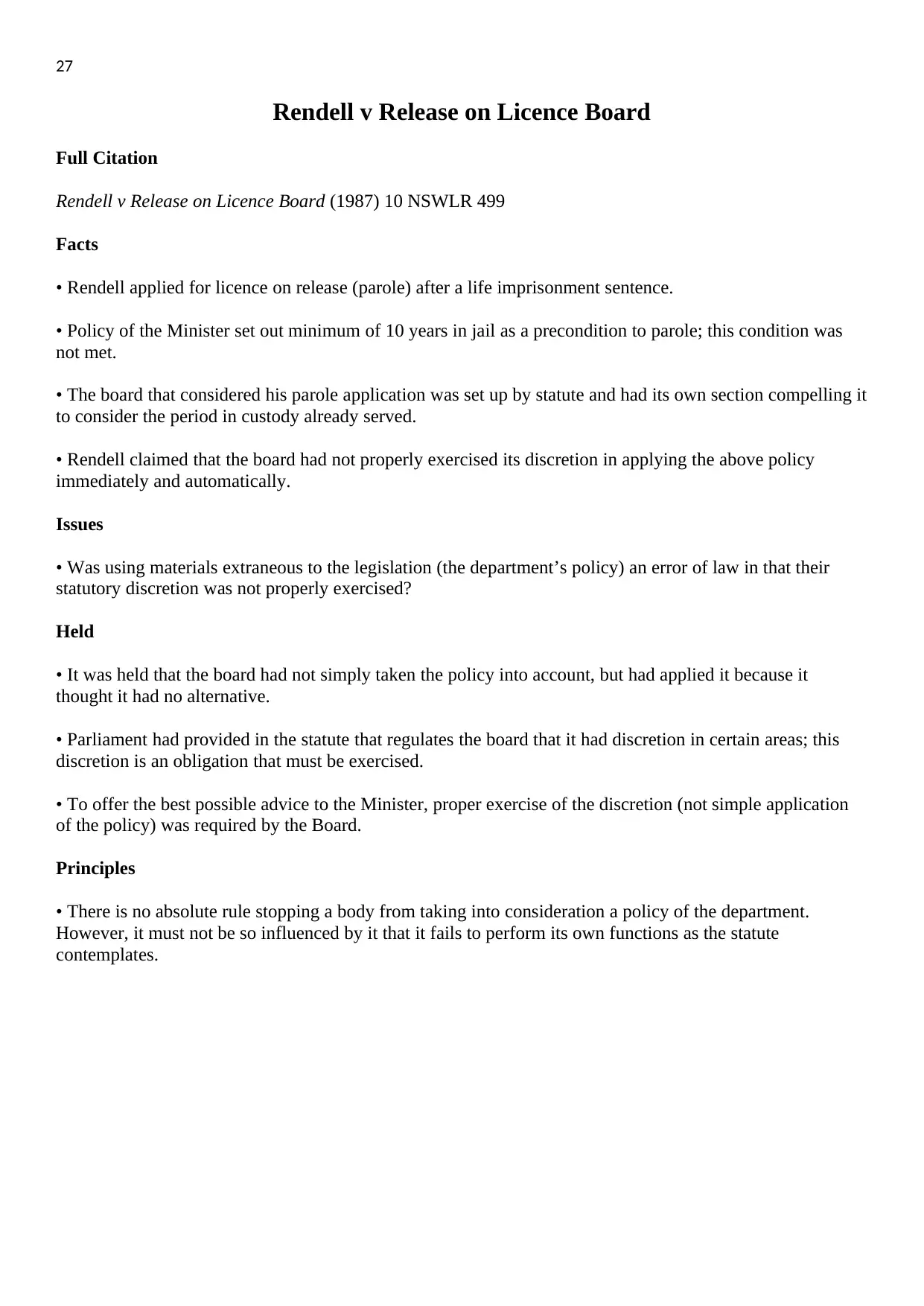
27
Rendell v Release on Licence Board
Full Citation
Rendell v Release on Licence Board (1987) 10 NSWLR 499
Facts
• Rendell applied for licence on release (parole) after a life imprisonment sentence.
• Policy of the Minister set out minimum of 10 years in jail as a precondition to parole; this condition was
not met.
• The board that considered his parole application was set up by statute and had its own section compelling it
to consider the period in custody already served.
• Rendell claimed that the board had not properly exercised its discretion in applying the above policy
immediately and automatically.
Issues
• Was using materials extraneous to the legislation (the department’s policy) an error of law in that their
statutory discretion was not properly exercised?
Held
• It was held that the board had not simply taken the policy into account, but had applied it because it
thought it had no alternative.
• Parliament had provided in the statute that regulates the board that it had discretion in certain areas; this
discretion is an obligation that must be exercised.
• To offer the best possible advice to the Minister, proper exercise of the discretion (not simple application
of the policy) was required by the Board.
Principles
• There is no absolute rule stopping a body from taking into consideration a policy of the department.
However, it must not be so influenced by it that it fails to perform its own functions as the statute
contemplates.
Rendell v Release on Licence Board
Full Citation
Rendell v Release on Licence Board (1987) 10 NSWLR 499
Facts
• Rendell applied for licence on release (parole) after a life imprisonment sentence.
• Policy of the Minister set out minimum of 10 years in jail as a precondition to parole; this condition was
not met.
• The board that considered his parole application was set up by statute and had its own section compelling it
to consider the period in custody already served.
• Rendell claimed that the board had not properly exercised its discretion in applying the above policy
immediately and automatically.
Issues
• Was using materials extraneous to the legislation (the department’s policy) an error of law in that their
statutory discretion was not properly exercised?
Held
• It was held that the board had not simply taken the policy into account, but had applied it because it
thought it had no alternative.
• Parliament had provided in the statute that regulates the board that it had discretion in certain areas; this
discretion is an obligation that must be exercised.
• To offer the best possible advice to the Minister, proper exercise of the discretion (not simple application
of the policy) was required by the Board.
Principles
• There is no absolute rule stopping a body from taking into consideration a policy of the department.
However, it must not be so influenced by it that it fails to perform its own functions as the statute
contemplates.
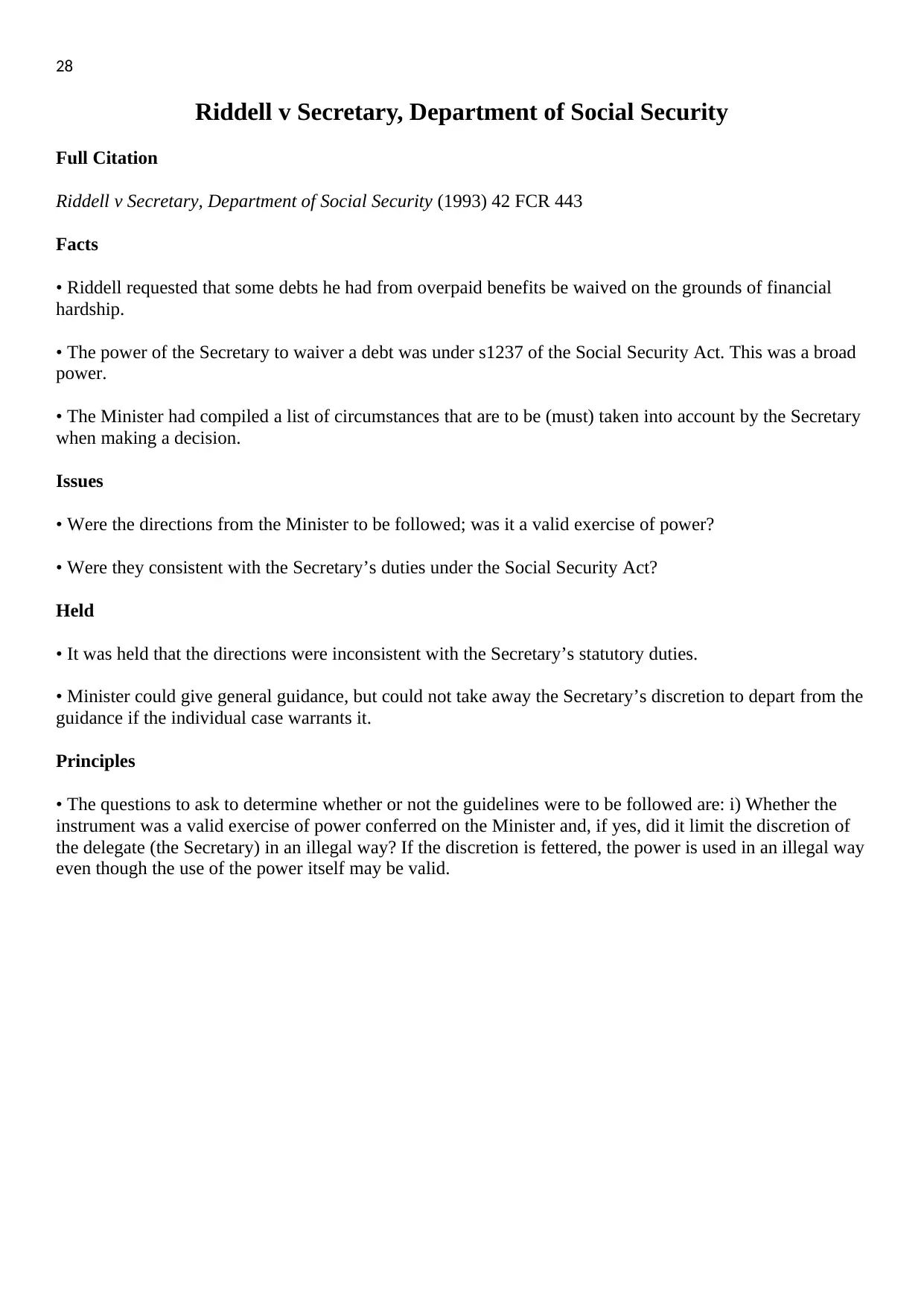
28
Riddell v Secretary, Department of Social Security
Full Citation
Riddell v Secretary, Department of Social Security (1993) 42 FCR 443
Facts
• Riddell requested that some debts he had from overpaid benefits be waived on the grounds of financial
hardship.
• The power of the Secretary to waiver a debt was under s1237 of the Social Security Act. This was a broad
power.
• The Minister had compiled a list of circumstances that are to be (must) taken into account by the Secretary
when making a decision.
Issues
• Were the directions from the Minister to be followed; was it a valid exercise of power?
• Were they consistent with the Secretary’s duties under the Social Security Act?
Held
• It was held that the directions were inconsistent with the Secretary’s statutory duties.
• Minister could give general guidance, but could not take away the Secretary’s discretion to depart from the
guidance if the individual case warrants it.
Principles
• The questions to ask to determine whether or not the guidelines were to be followed are: i) Whether the
instrument was a valid exercise of power conferred on the Minister and, if yes, did it limit the discretion of
the delegate (the Secretary) in an illegal way? If the discretion is fettered, the power is used in an illegal way
even though the use of the power itself may be valid.
Riddell v Secretary, Department of Social Security
Full Citation
Riddell v Secretary, Department of Social Security (1993) 42 FCR 443
Facts
• Riddell requested that some debts he had from overpaid benefits be waived on the grounds of financial
hardship.
• The power of the Secretary to waiver a debt was under s1237 of the Social Security Act. This was a broad
power.
• The Minister had compiled a list of circumstances that are to be (must) taken into account by the Secretary
when making a decision.
Issues
• Were the directions from the Minister to be followed; was it a valid exercise of power?
• Were they consistent with the Secretary’s duties under the Social Security Act?
Held
• It was held that the directions were inconsistent with the Secretary’s statutory duties.
• Minister could give general guidance, but could not take away the Secretary’s discretion to depart from the
guidance if the individual case warrants it.
Principles
• The questions to ask to determine whether or not the guidelines were to be followed are: i) Whether the
instrument was a valid exercise of power conferred on the Minister and, if yes, did it limit the discretion of
the delegate (the Secretary) in an illegal way? If the discretion is fettered, the power is used in an illegal way
even though the use of the power itself may be valid.
Secure Best Marks with AI Grader
Need help grading? Try our AI Grader for instant feedback on your assignments.
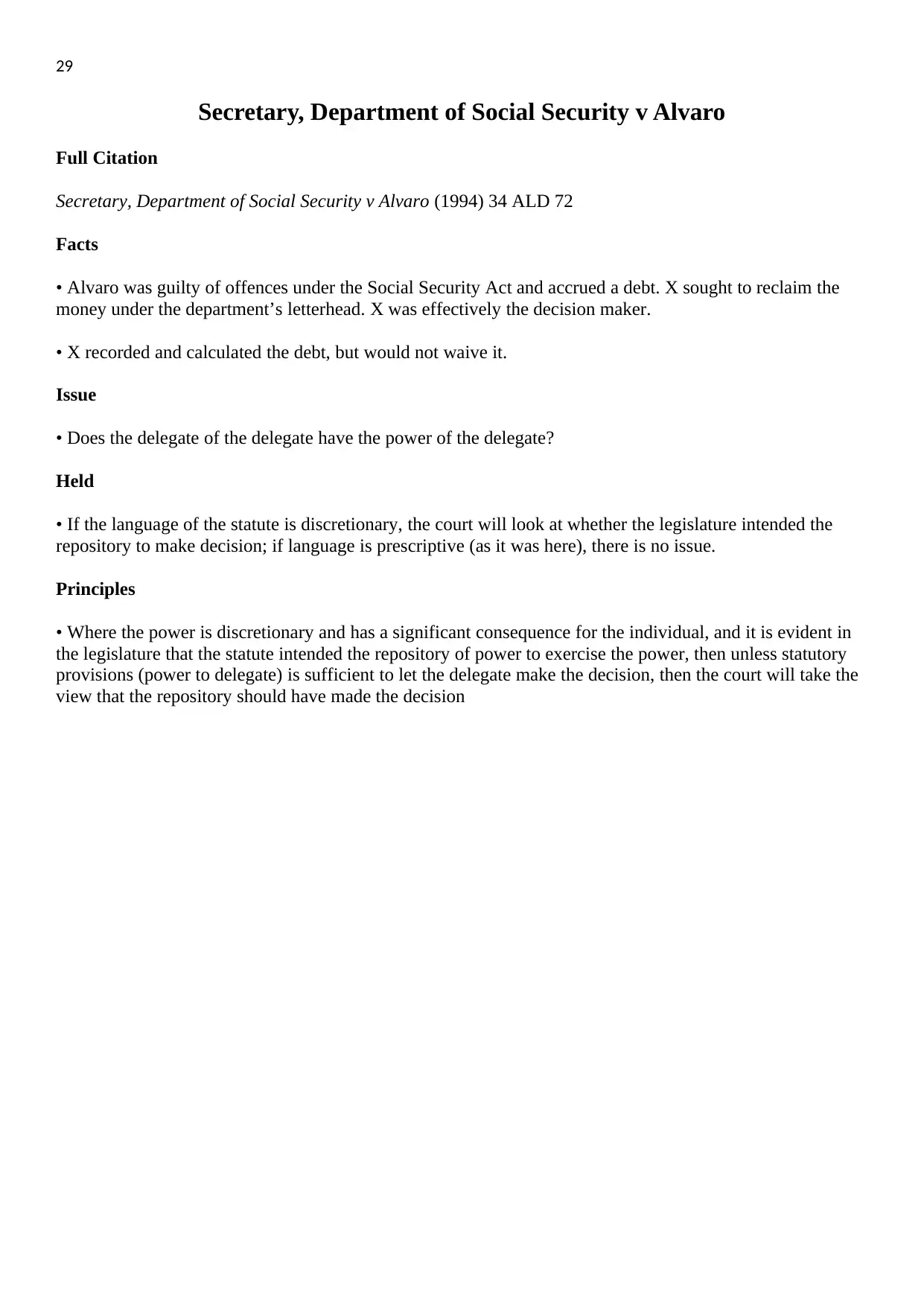
29
Secretary, Department of Social Security v Alvaro
Full Citation
Secretary, Department of Social Security v Alvaro (1994) 34 ALD 72
Facts
• Alvaro was guilty of offences under the Social Security Act and accrued a debt. X sought to reclaim the
money under the department’s letterhead. X was effectively the decision maker.
• X recorded and calculated the debt, but would not waive it.
Issue
• Does the delegate of the delegate have the power of the delegate?
Held
• If the language of the statute is discretionary, the court will look at whether the legislature intended the
repository to make decision; if language is prescriptive (as it was here), there is no issue.
Principles
• Where the power is discretionary and has a significant consequence for the individual, and it is evident in
the legislature that the statute intended the repository of power to exercise the power, then unless statutory
provisions (power to delegate) is sufficient to let the delegate make the decision, then the court will take the
view that the repository should have made the decision
Secretary, Department of Social Security v Alvaro
Full Citation
Secretary, Department of Social Security v Alvaro (1994) 34 ALD 72
Facts
• Alvaro was guilty of offences under the Social Security Act and accrued a debt. X sought to reclaim the
money under the department’s letterhead. X was effectively the decision maker.
• X recorded and calculated the debt, but would not waive it.
Issue
• Does the delegate of the delegate have the power of the delegate?
Held
• If the language of the statute is discretionary, the court will look at whether the legislature intended the
repository to make decision; if language is prescriptive (as it was here), there is no issue.
Principles
• Where the power is discretionary and has a significant consequence for the individual, and it is evident in
the legislature that the statute intended the repository of power to exercise the power, then unless statutory
provisions (power to delegate) is sufficient to let the delegate make the decision, then the court will take the
view that the repository should have made the decision
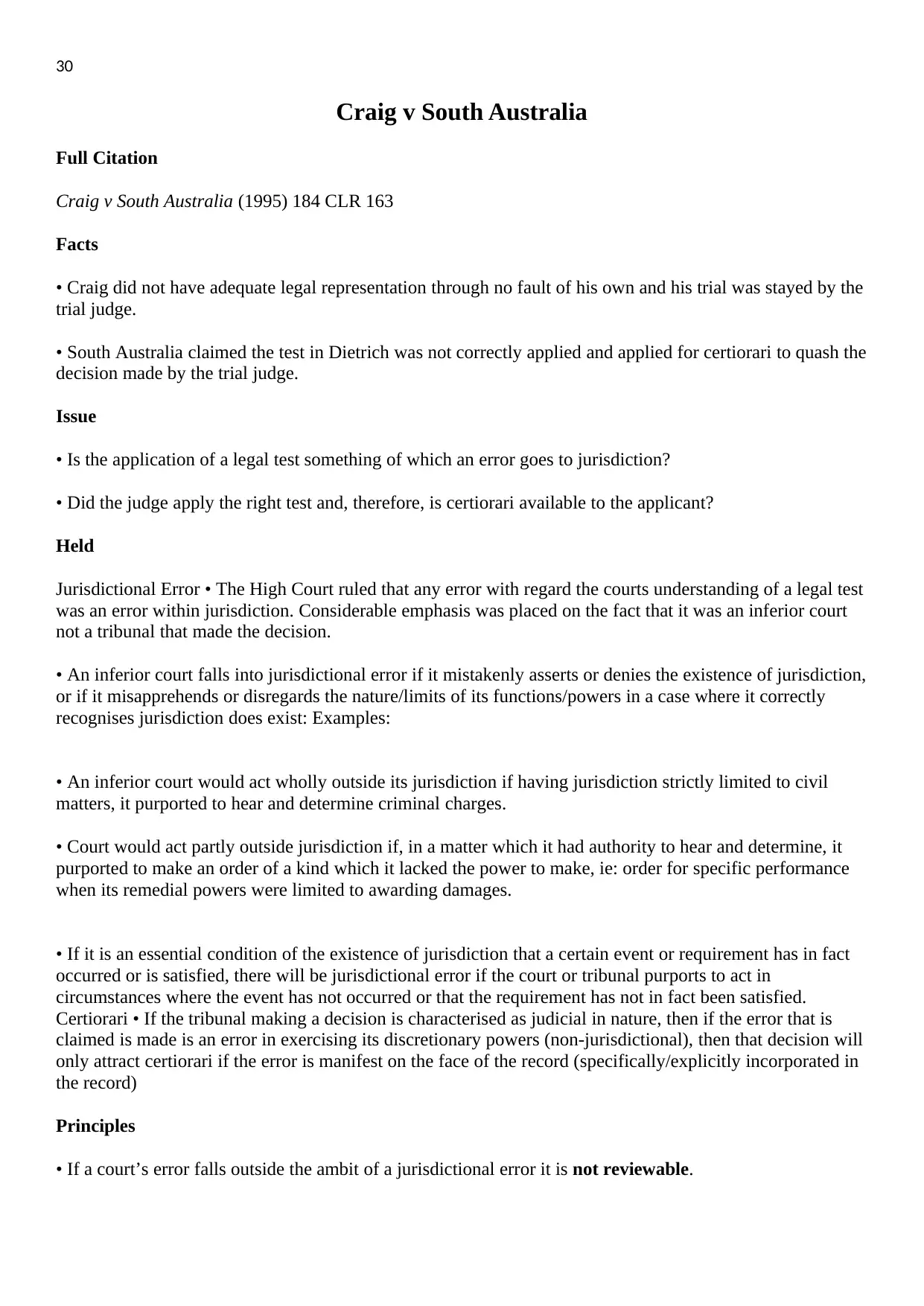
30
Craig v South Australia
Full Citation
Craig v South Australia (1995) 184 CLR 163
Facts
• Craig did not have adequate legal representation through no fault of his own and his trial was stayed by the
trial judge.
• South Australia claimed the test in Dietrich was not correctly applied and applied for certiorari to quash the
decision made by the trial judge.
Issue
• Is the application of a legal test something of which an error goes to jurisdiction?
• Did the judge apply the right test and, therefore, is certiorari available to the applicant?
Held
Jurisdictional Error • The High Court ruled that any error with regard the courts understanding of a legal test
was an error within jurisdiction. Considerable emphasis was placed on the fact that it was an inferior court
not a tribunal that made the decision.
• An inferior court falls into jurisdictional error if it mistakenly asserts or denies the existence of jurisdiction,
or if it misapprehends or disregards the nature/limits of its functions/powers in a case where it correctly
recognises jurisdiction does exist: Examples:
• An inferior court would act wholly outside its jurisdiction if having jurisdiction strictly limited to civil
matters, it purported to hear and determine criminal charges.
• Court would act partly outside jurisdiction if, in a matter which it had authority to hear and determine, it
purported to make an order of a kind which it lacked the power to make, ie: order for specific performance
when its remedial powers were limited to awarding damages.
• If it is an essential condition of the existence of jurisdiction that a certain event or requirement has in fact
occurred or is satisfied, there will be jurisdictional error if the court or tribunal purports to act in
circumstances where the event has not occurred or that the requirement has not in fact been satisfied.
Certiorari • If the tribunal making a decision is characterised as judicial in nature, then if the error that is
claimed is made is an error in exercising its discretionary powers (non-jurisdictional), then that decision will
only attract certiorari if the error is manifest on the face of the record (specifically/explicitly incorporated in
the record)
Principles
• If a court’s error falls outside the ambit of a jurisdictional error it is not reviewable.
Craig v South Australia
Full Citation
Craig v South Australia (1995) 184 CLR 163
Facts
• Craig did not have adequate legal representation through no fault of his own and his trial was stayed by the
trial judge.
• South Australia claimed the test in Dietrich was not correctly applied and applied for certiorari to quash the
decision made by the trial judge.
Issue
• Is the application of a legal test something of which an error goes to jurisdiction?
• Did the judge apply the right test and, therefore, is certiorari available to the applicant?
Held
Jurisdictional Error • The High Court ruled that any error with regard the courts understanding of a legal test
was an error within jurisdiction. Considerable emphasis was placed on the fact that it was an inferior court
not a tribunal that made the decision.
• An inferior court falls into jurisdictional error if it mistakenly asserts or denies the existence of jurisdiction,
or if it misapprehends or disregards the nature/limits of its functions/powers in a case where it correctly
recognises jurisdiction does exist: Examples:
• An inferior court would act wholly outside its jurisdiction if having jurisdiction strictly limited to civil
matters, it purported to hear and determine criminal charges.
• Court would act partly outside jurisdiction if, in a matter which it had authority to hear and determine, it
purported to make an order of a kind which it lacked the power to make, ie: order for specific performance
when its remedial powers were limited to awarding damages.
• If it is an essential condition of the existence of jurisdiction that a certain event or requirement has in fact
occurred or is satisfied, there will be jurisdictional error if the court or tribunal purports to act in
circumstances where the event has not occurred or that the requirement has not in fact been satisfied.
Certiorari • If the tribunal making a decision is characterised as judicial in nature, then if the error that is
claimed is made is an error in exercising its discretionary powers (non-jurisdictional), then that decision will
only attract certiorari if the error is manifest on the face of the record (specifically/explicitly incorporated in
the record)
Principles
• If a court’s error falls outside the ambit of a jurisdictional error it is not reviewable.
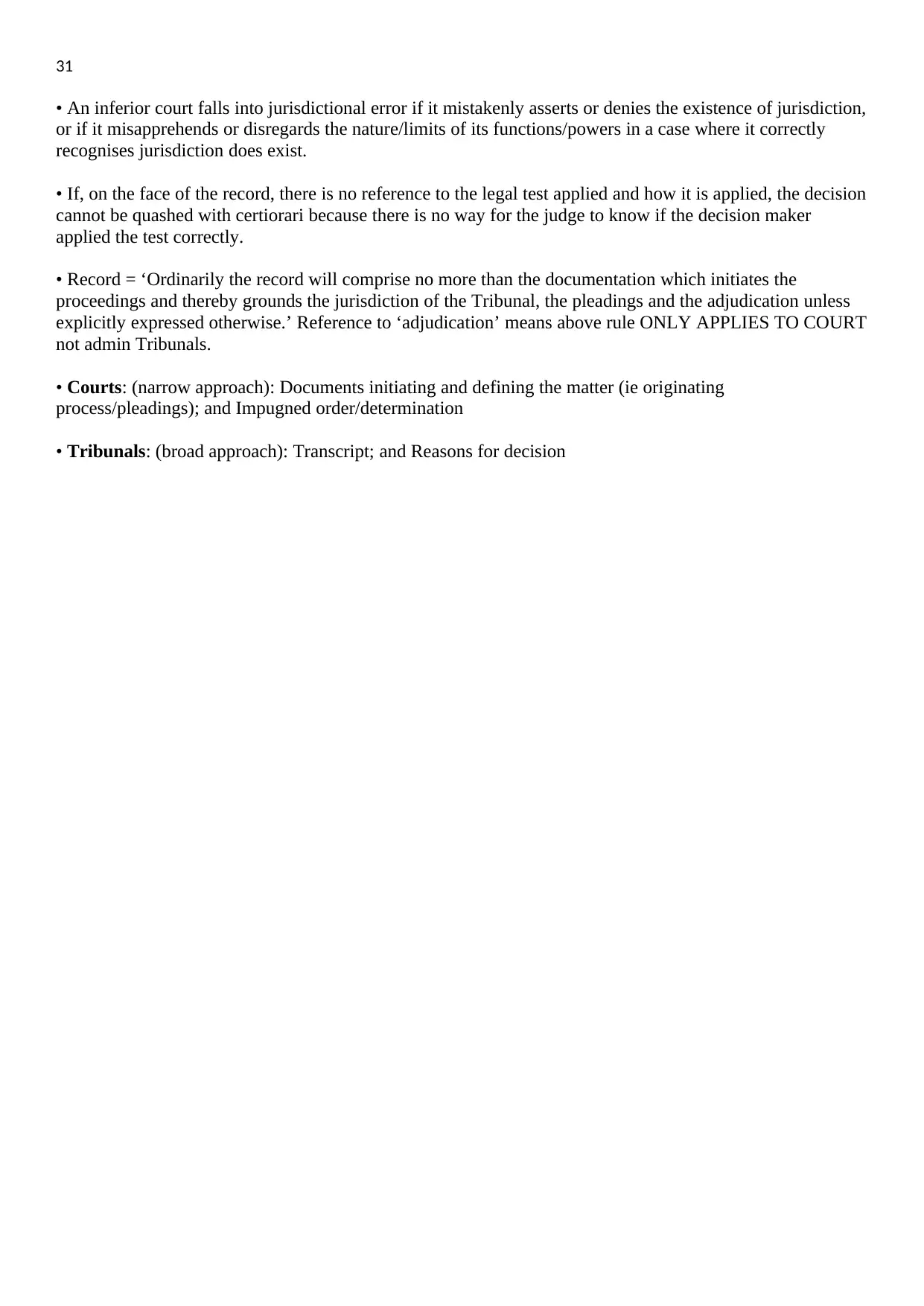
31
• An inferior court falls into jurisdictional error if it mistakenly asserts or denies the existence of jurisdiction,
or if it misapprehends or disregards the nature/limits of its functions/powers in a case where it correctly
recognises jurisdiction does exist.
• If, on the face of the record, there is no reference to the legal test applied and how it is applied, the decision
cannot be quashed with certiorari because there is no way for the judge to know if the decision maker
applied the test correctly.
• Record = ‘Ordinarily the record will comprise no more than the documentation which initiates the
proceedings and thereby grounds the jurisdiction of the Tribunal, the pleadings and the adjudication unless
explicitly expressed otherwise.’ Reference to ‘adjudication’ means above rule ONLY APPLIES TO COURT
not admin Tribunals.
• Courts: (narrow approach): Documents initiating and defining the matter (ie originating
process/pleadings); and Impugned order/determination
• Tribunals: (broad approach): Transcript; and Reasons for decision
• An inferior court falls into jurisdictional error if it mistakenly asserts or denies the existence of jurisdiction,
or if it misapprehends or disregards the nature/limits of its functions/powers in a case where it correctly
recognises jurisdiction does exist.
• If, on the face of the record, there is no reference to the legal test applied and how it is applied, the decision
cannot be quashed with certiorari because there is no way for the judge to know if the decision maker
applied the test correctly.
• Record = ‘Ordinarily the record will comprise no more than the documentation which initiates the
proceedings and thereby grounds the jurisdiction of the Tribunal, the pleadings and the adjudication unless
explicitly expressed otherwise.’ Reference to ‘adjudication’ means above rule ONLY APPLIES TO COURT
not admin Tribunals.
• Courts: (narrow approach): Documents initiating and defining the matter (ie originating
process/pleadings); and Impugned order/determination
• Tribunals: (broad approach): Transcript; and Reasons for decision
Paraphrase This Document
Need a fresh take? Get an instant paraphrase of this document with our AI Paraphraser
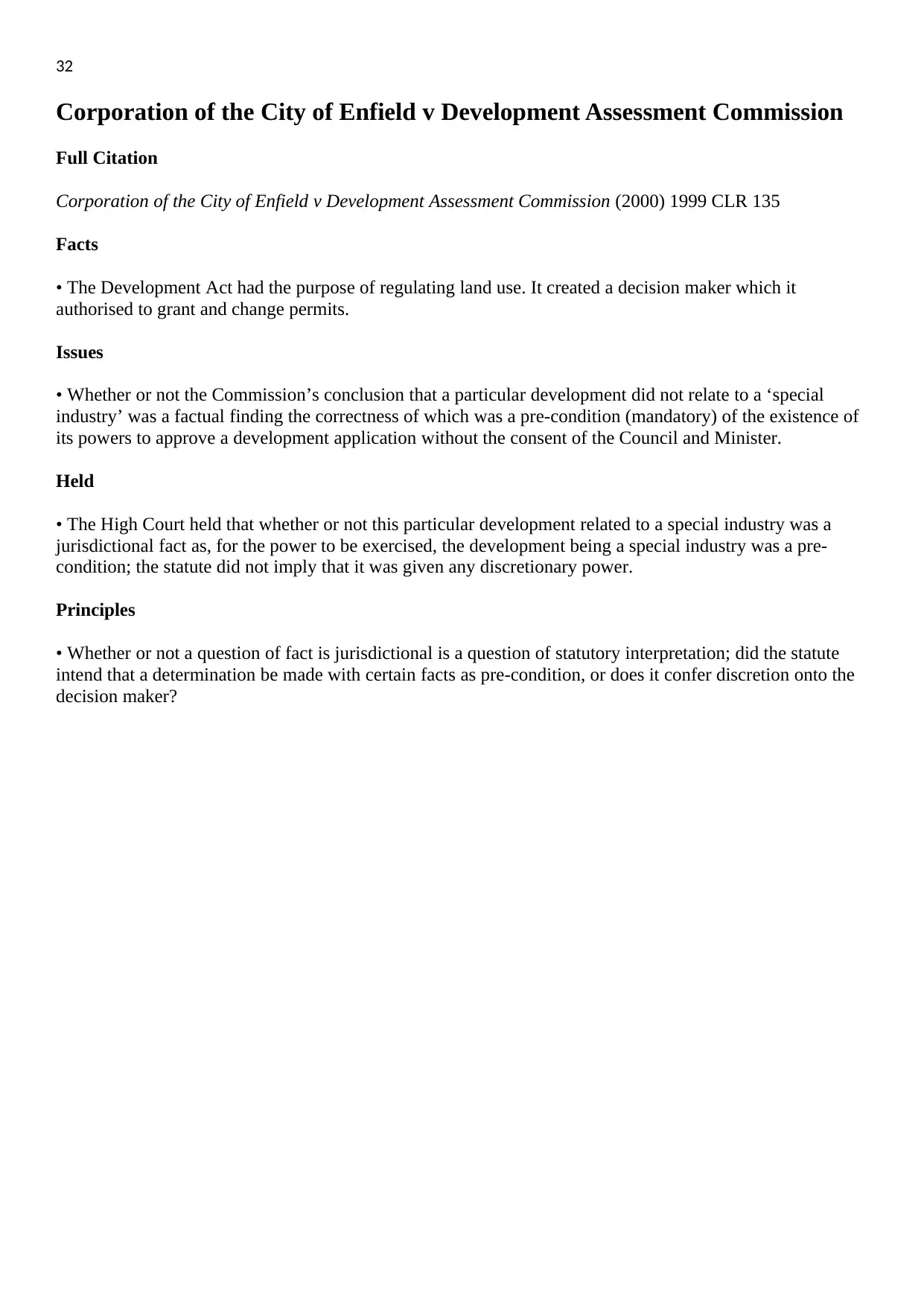
32
Corporation of the City of Enfield v Development Assessment Commission
Full Citation
Corporation of the City of Enfield v Development Assessment Commission (2000) 1999 CLR 135
Facts
• The Development Act had the purpose of regulating land use. It created a decision maker which it
authorised to grant and change permits.
Issues
• Whether or not the Commission’s conclusion that a particular development did not relate to a ‘special
industry’ was a factual finding the correctness of which was a pre-condition (mandatory) of the existence of
its powers to approve a development application without the consent of the Council and Minister.
Held
• The High Court held that whether or not this particular development related to a special industry was a
jurisdictional fact as, for the power to be exercised, the development being a special industry was a pre-
condition; the statute did not imply that it was given any discretionary power.
Principles
• Whether or not a question of fact is jurisdictional is a question of statutory interpretation; did the statute
intend that a determination be made with certain facts as pre-condition, or does it confer discretion onto the
decision maker?
Corporation of the City of Enfield v Development Assessment Commission
Full Citation
Corporation of the City of Enfield v Development Assessment Commission (2000) 1999 CLR 135
Facts
• The Development Act had the purpose of regulating land use. It created a decision maker which it
authorised to grant and change permits.
Issues
• Whether or not the Commission’s conclusion that a particular development did not relate to a ‘special
industry’ was a factual finding the correctness of which was a pre-condition (mandatory) of the existence of
its powers to approve a development application without the consent of the Council and Minister.
Held
• The High Court held that whether or not this particular development related to a special industry was a
jurisdictional fact as, for the power to be exercised, the development being a special industry was a pre-
condition; the statute did not imply that it was given any discretionary power.
Principles
• Whether or not a question of fact is jurisdictional is a question of statutory interpretation; did the statute
intend that a determination be made with certain facts as pre-condition, or does it confer discretion onto the
decision maker?
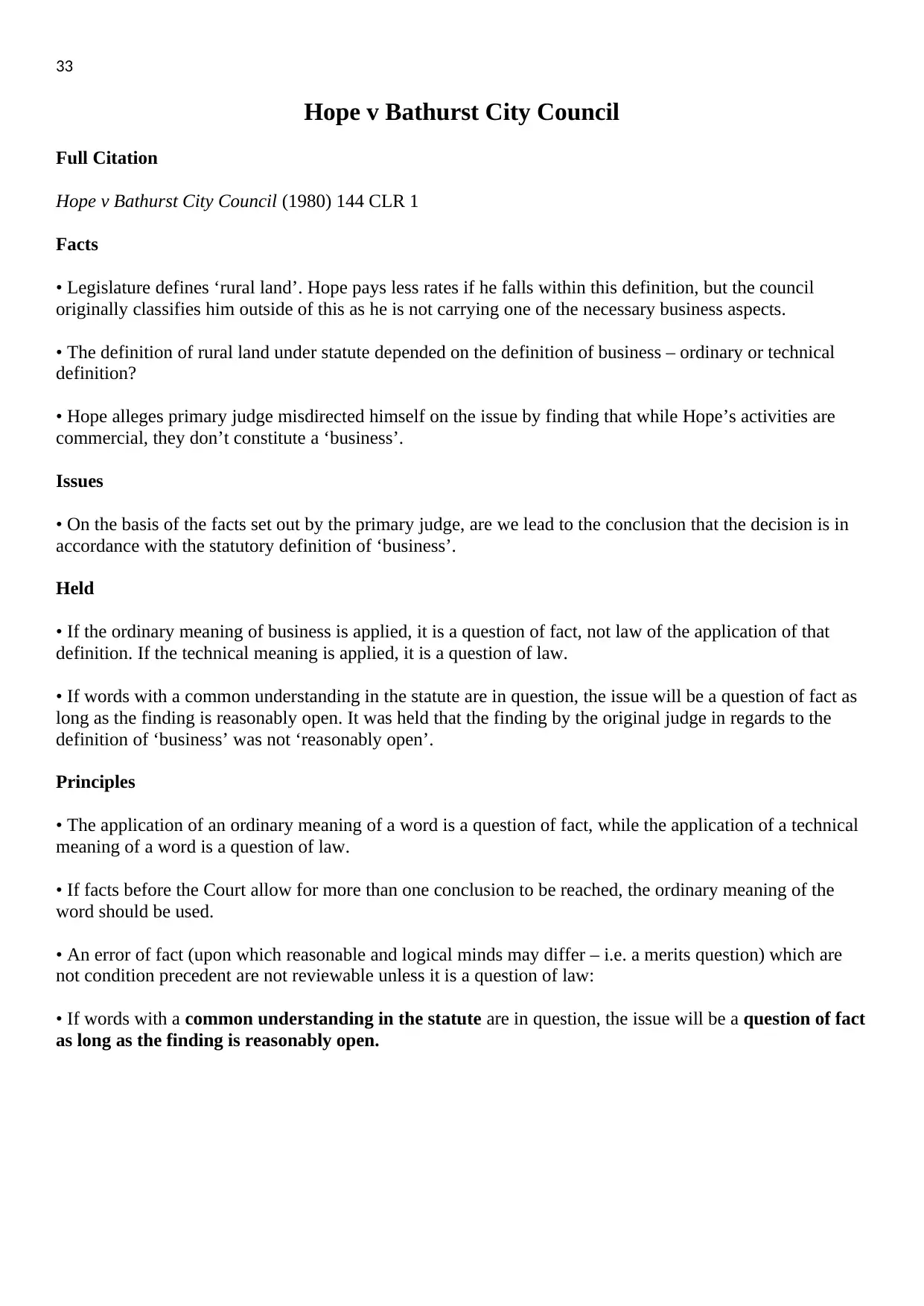
33
Hope v Bathurst City Council
Full Citation
Hope v Bathurst City Council (1980) 144 CLR 1
Facts
• Legislature defines ‘rural land’. Hope pays less rates if he falls within this definition, but the council
originally classifies him outside of this as he is not carrying one of the necessary business aspects.
• The definition of rural land under statute depended on the definition of business – ordinary or technical
definition?
• Hope alleges primary judge misdirected himself on the issue by finding that while Hope’s activities are
commercial, they don’t constitute a ‘business’.
Issues
• On the basis of the facts set out by the primary judge, are we lead to the conclusion that the decision is in
accordance with the statutory definition of ‘business’.
Held
• If the ordinary meaning of business is applied, it is a question of fact, not law of the application of that
definition. If the technical meaning is applied, it is a question of law.
• If words with a common understanding in the statute are in question, the issue will be a question of fact as
long as the finding is reasonably open. It was held that the finding by the original judge in regards to the
definition of ‘business’ was not ‘reasonably open’.
Principles
• The application of an ordinary meaning of a word is a question of fact, while the application of a technical
meaning of a word is a question of law.
• If facts before the Court allow for more than one conclusion to be reached, the ordinary meaning of the
word should be used.
• An error of fact (upon which reasonable and logical minds may differ – i.e. a merits question) which are
not condition precedent are not reviewable unless it is a question of law:
• If words with a common understanding in the statute are in question, the issue will be a question of fact
as long as the finding is reasonably open.
Hope v Bathurst City Council
Full Citation
Hope v Bathurst City Council (1980) 144 CLR 1
Facts
• Legislature defines ‘rural land’. Hope pays less rates if he falls within this definition, but the council
originally classifies him outside of this as he is not carrying one of the necessary business aspects.
• The definition of rural land under statute depended on the definition of business – ordinary or technical
definition?
• Hope alleges primary judge misdirected himself on the issue by finding that while Hope’s activities are
commercial, they don’t constitute a ‘business’.
Issues
• On the basis of the facts set out by the primary judge, are we lead to the conclusion that the decision is in
accordance with the statutory definition of ‘business’.
Held
• If the ordinary meaning of business is applied, it is a question of fact, not law of the application of that
definition. If the technical meaning is applied, it is a question of law.
• If words with a common understanding in the statute are in question, the issue will be a question of fact as
long as the finding is reasonably open. It was held that the finding by the original judge in regards to the
definition of ‘business’ was not ‘reasonably open’.
Principles
• The application of an ordinary meaning of a word is a question of fact, while the application of a technical
meaning of a word is a question of law.
• If facts before the Court allow for more than one conclusion to be reached, the ordinary meaning of the
word should be used.
• An error of fact (upon which reasonable and logical minds may differ – i.e. a merits question) which are
not condition precedent are not reviewable unless it is a question of law:
• If words with a common understanding in the statute are in question, the issue will be a question of fact
as long as the finding is reasonably open.
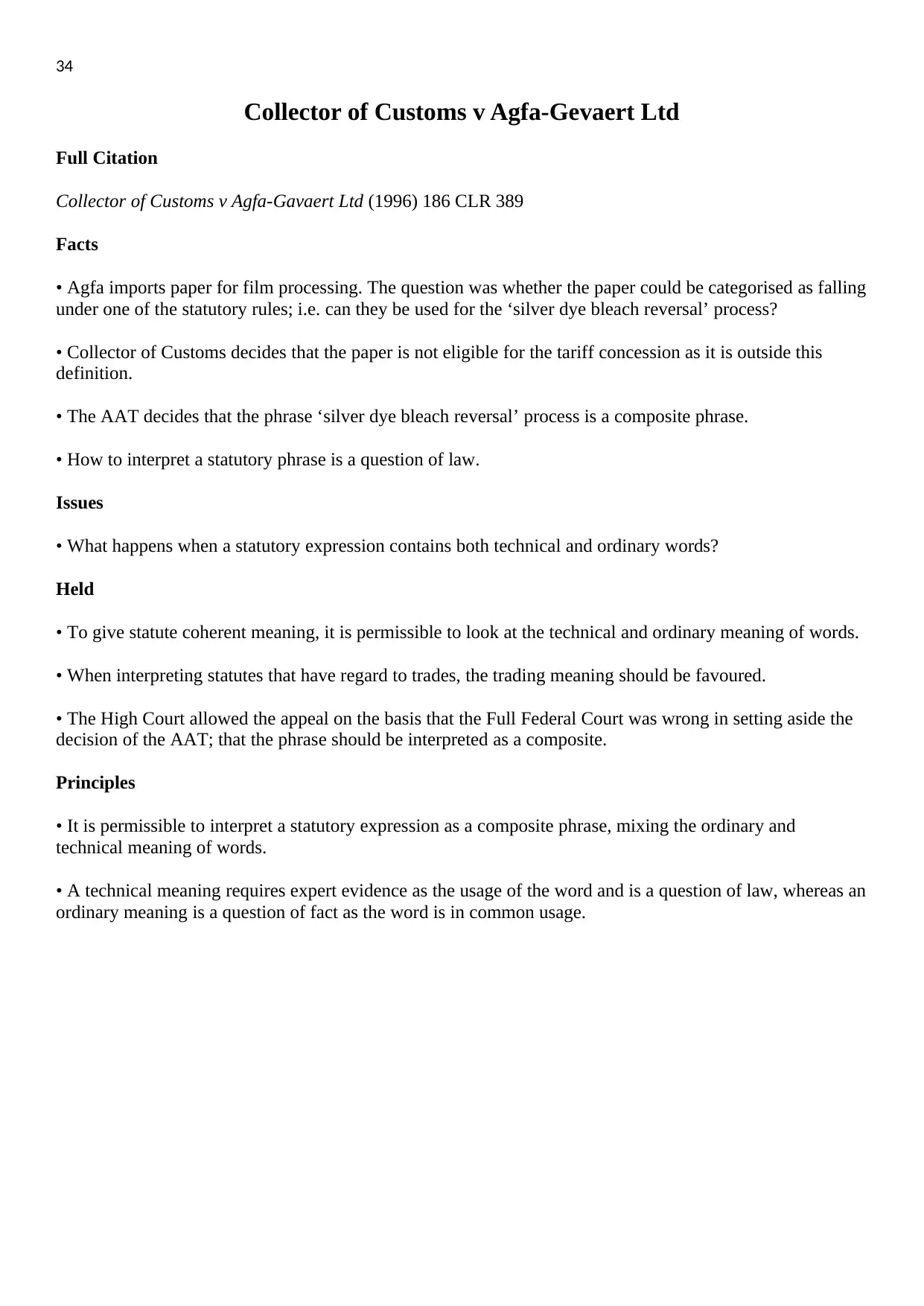
34
Collector of Customs v Agfa-Gevaert Ltd
Full Citation
Collector of Customs v Agfa-Gavaert Ltd (1996) 186 CLR 389
Facts
• Agfa imports paper for film processing. The question was whether the paper could be categorised as falling
under one of the statutory rules; i.e. can they be used for the ‘silver dye bleach reversal’ process?
• Collector of Customs decides that the paper is not eligible for the tariff concession as it is outside this
definition.
• The AAT decides that the phrase ‘silver dye bleach reversal’ process is a composite phrase.
• How to interpret a statutory phrase is a question of law.
Issues
• What happens when a statutory expression contains both technical and ordinary words?
Held
• To give statute coherent meaning, it is permissible to look at the technical and ordinary meaning of words.
• When interpreting statutes that have regard to trades, the trading meaning should be favoured.
• The High Court allowed the appeal on the basis that the Full Federal Court was wrong in setting aside the
decision of the AAT; that the phrase should be interpreted as a composite.
Principles
• It is permissible to interpret a statutory expression as a composite phrase, mixing the ordinary and
technical meaning of words.
• A technical meaning requires expert evidence as the usage of the word and is a question of law, whereas an
ordinary meaning is a question of fact as the word is in common usage.
Collector of Customs v Agfa-Gevaert Ltd
Full Citation
Collector of Customs v Agfa-Gavaert Ltd (1996) 186 CLR 389
Facts
• Agfa imports paper for film processing. The question was whether the paper could be categorised as falling
under one of the statutory rules; i.e. can they be used for the ‘silver dye bleach reversal’ process?
• Collector of Customs decides that the paper is not eligible for the tariff concession as it is outside this
definition.
• The AAT decides that the phrase ‘silver dye bleach reversal’ process is a composite phrase.
• How to interpret a statutory phrase is a question of law.
Issues
• What happens when a statutory expression contains both technical and ordinary words?
Held
• To give statute coherent meaning, it is permissible to look at the technical and ordinary meaning of words.
• When interpreting statutes that have regard to trades, the trading meaning should be favoured.
• The High Court allowed the appeal on the basis that the Full Federal Court was wrong in setting aside the
decision of the AAT; that the phrase should be interpreted as a composite.
Principles
• It is permissible to interpret a statutory expression as a composite phrase, mixing the ordinary and
technical meaning of words.
• A technical meaning requires expert evidence as the usage of the word and is a question of law, whereas an
ordinary meaning is a question of fact as the word is in common usage.
Secure Best Marks with AI Grader
Need help grading? Try our AI Grader for instant feedback on your assignments.
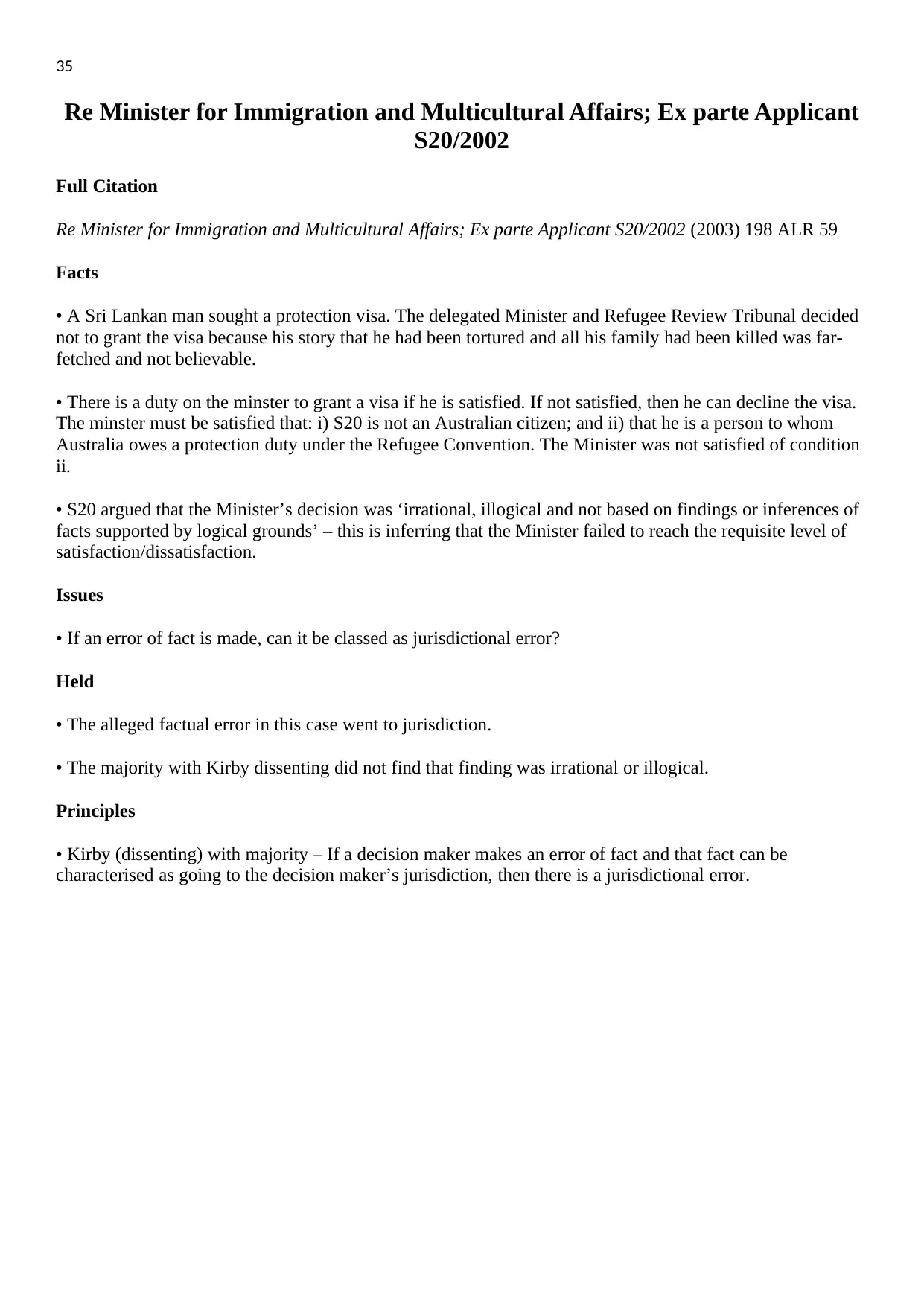
35
Re Minister for Immigration and Multicultural Affairs; Ex parte Applicant
S20/2002
Full Citation
Re Minister for Immigration and Multicultural Affairs; Ex parte Applicant S20/2002 (2003) 198 ALR 59
Facts
• A Sri Lankan man sought a protection visa. The delegated Minister and Refugee Review Tribunal decided
not to grant the visa because his story that he had been tortured and all his family had been killed was far-
fetched and not believable.
• There is a duty on the minster to grant a visa if he is satisfied. If not satisfied, then he can decline the visa.
The minster must be satisfied that: i) S20 is not an Australian citizen; and ii) that he is a person to whom
Australia owes a protection duty under the Refugee Convention. The Minister was not satisfied of condition
ii.
• S20 argued that the Minister’s decision was ‘irrational, illogical and not based on findings or inferences of
facts supported by logical grounds’ – this is inferring that the Minister failed to reach the requisite level of
satisfaction/dissatisfaction.
Issues
• If an error of fact is made, can it be classed as jurisdictional error?
Held
• The alleged factual error in this case went to jurisdiction.
• The majority with Kirby dissenting did not find that finding was irrational or illogical.
Principles
• Kirby (dissenting) with majority – If a decision maker makes an error of fact and that fact can be
characterised as going to the decision maker’s jurisdiction, then there is a jurisdictional error.
Re Minister for Immigration and Multicultural Affairs; Ex parte Applicant
S20/2002
Full Citation
Re Minister for Immigration and Multicultural Affairs; Ex parte Applicant S20/2002 (2003) 198 ALR 59
Facts
• A Sri Lankan man sought a protection visa. The delegated Minister and Refugee Review Tribunal decided
not to grant the visa because his story that he had been tortured and all his family had been killed was far-
fetched and not believable.
• There is a duty on the minster to grant a visa if he is satisfied. If not satisfied, then he can decline the visa.
The minster must be satisfied that: i) S20 is not an Australian citizen; and ii) that he is a person to whom
Australia owes a protection duty under the Refugee Convention. The Minister was not satisfied of condition
ii.
• S20 argued that the Minister’s decision was ‘irrational, illogical and not based on findings or inferences of
facts supported by logical grounds’ – this is inferring that the Minister failed to reach the requisite level of
satisfaction/dissatisfaction.
Issues
• If an error of fact is made, can it be classed as jurisdictional error?
Held
• The alleged factual error in this case went to jurisdiction.
• The majority with Kirby dissenting did not find that finding was irrational or illogical.
Principles
• Kirby (dissenting) with majority – If a decision maker makes an error of fact and that fact can be
characterised as going to the decision maker’s jurisdiction, then there is a jurisdictional error.
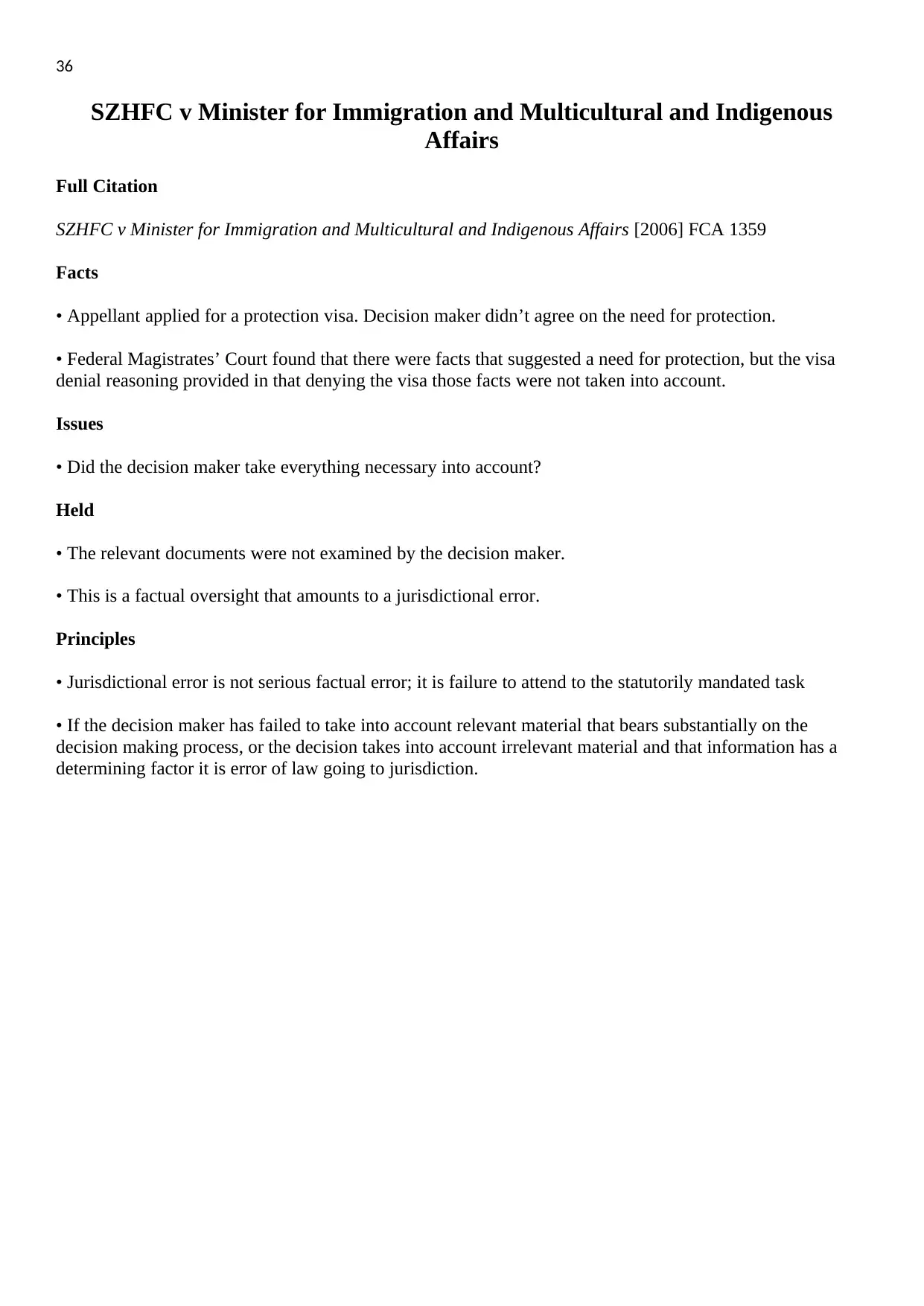
36
SZHFC v Minister for Immigration and Multicultural and Indigenous
Affairs
Full Citation
SZHFC v Minister for Immigration and Multicultural and Indigenous Affairs [2006] FCA 1359
Facts
• Appellant applied for a protection visa. Decision maker didn’t agree on the need for protection.
• Federal Magistrates’ Court found that there were facts that suggested a need for protection, but the visa
denial reasoning provided in that denying the visa those facts were not taken into account.
Issues
• Did the decision maker take everything necessary into account?
Held
• The relevant documents were not examined by the decision maker.
• This is a factual oversight that amounts to a jurisdictional error.
Principles
• Jurisdictional error is not serious factual error; it is failure to attend to the statutorily mandated task
• If the decision maker has failed to take into account relevant material that bears substantially on the
decision making process, or the decision takes into account irrelevant material and that information has a
determining factor it is error of law going to jurisdiction.
SZHFC v Minister for Immigration and Multicultural and Indigenous
Affairs
Full Citation
SZHFC v Minister for Immigration and Multicultural and Indigenous Affairs [2006] FCA 1359
Facts
• Appellant applied for a protection visa. Decision maker didn’t agree on the need for protection.
• Federal Magistrates’ Court found that there were facts that suggested a need for protection, but the visa
denial reasoning provided in that denying the visa those facts were not taken into account.
Issues
• Did the decision maker take everything necessary into account?
Held
• The relevant documents were not examined by the decision maker.
• This is a factual oversight that amounts to a jurisdictional error.
Principles
• Jurisdictional error is not serious factual error; it is failure to attend to the statutorily mandated task
• If the decision maker has failed to take into account relevant material that bears substantially on the
decision making process, or the decision takes into account irrelevant material and that information has a
determining factor it is error of law going to jurisdiction.
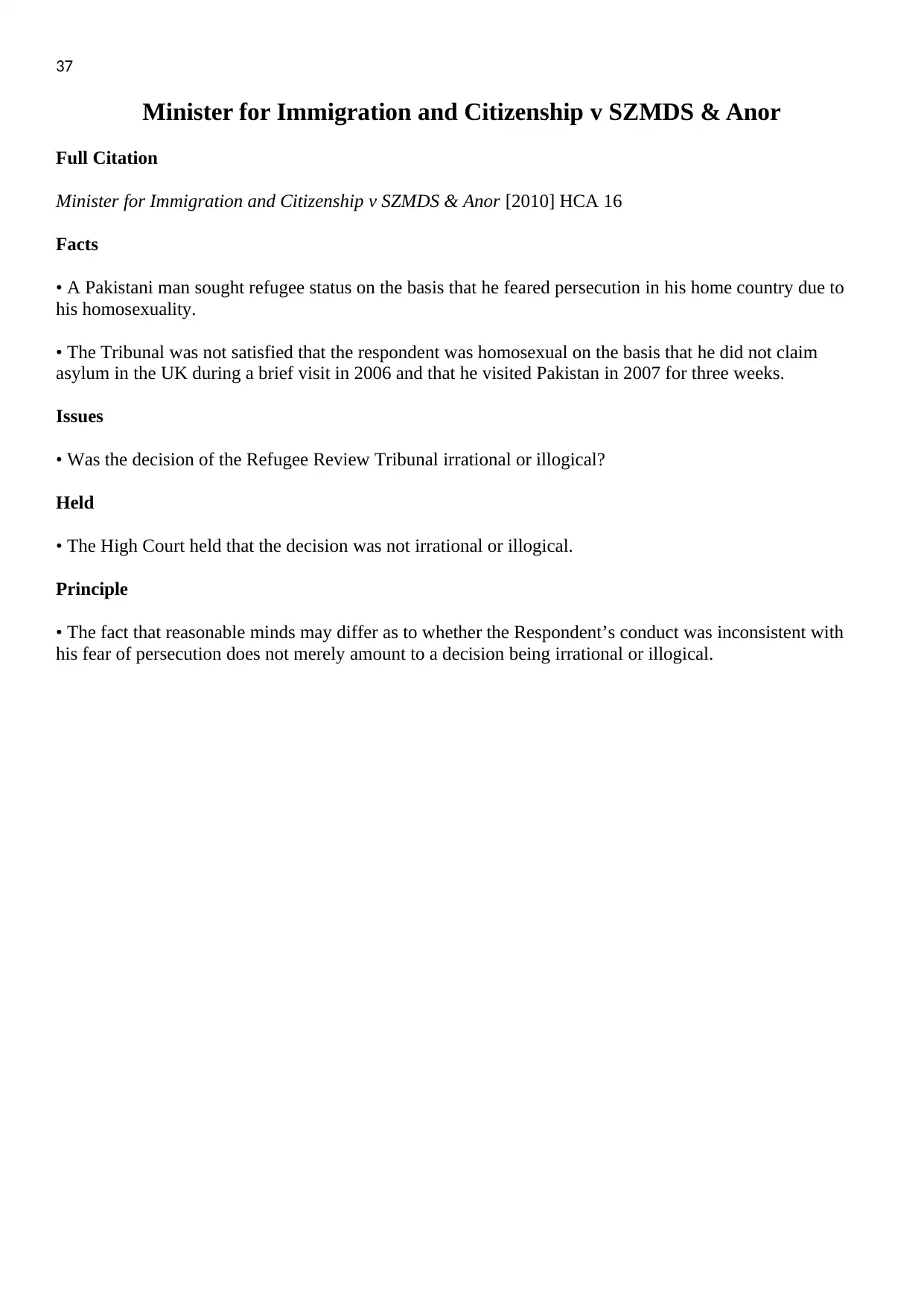
37
Minister for Immigration and Citizenship v SZMDS & Anor
Full Citation
Minister for Immigration and Citizenship v SZMDS & Anor [2010] HCA 16
Facts
• A Pakistani man sought refugee status on the basis that he feared persecution in his home country due to
his homosexuality.
• The Tribunal was not satisfied that the respondent was homosexual on the basis that he did not claim
asylum in the UK during a brief visit in 2006 and that he visited Pakistan in 2007 for three weeks.
Issues
• Was the decision of the Refugee Review Tribunal irrational or illogical?
Held
• The High Court held that the decision was not irrational or illogical.
Principle
• The fact that reasonable minds may differ as to whether the Respondent’s conduct was inconsistent with
his fear of persecution does not merely amount to a decision being irrational or illogical.
Minister for Immigration and Citizenship v SZMDS & Anor
Full Citation
Minister for Immigration and Citizenship v SZMDS & Anor [2010] HCA 16
Facts
• A Pakistani man sought refugee status on the basis that he feared persecution in his home country due to
his homosexuality.
• The Tribunal was not satisfied that the respondent was homosexual on the basis that he did not claim
asylum in the UK during a brief visit in 2006 and that he visited Pakistan in 2007 for three weeks.
Issues
• Was the decision of the Refugee Review Tribunal irrational or illogical?
Held
• The High Court held that the decision was not irrational or illogical.
Principle
• The fact that reasonable minds may differ as to whether the Respondent’s conduct was inconsistent with
his fear of persecution does not merely amount to a decision being irrational or illogical.
Paraphrase This Document
Need a fresh take? Get an instant paraphrase of this document with our AI Paraphraser
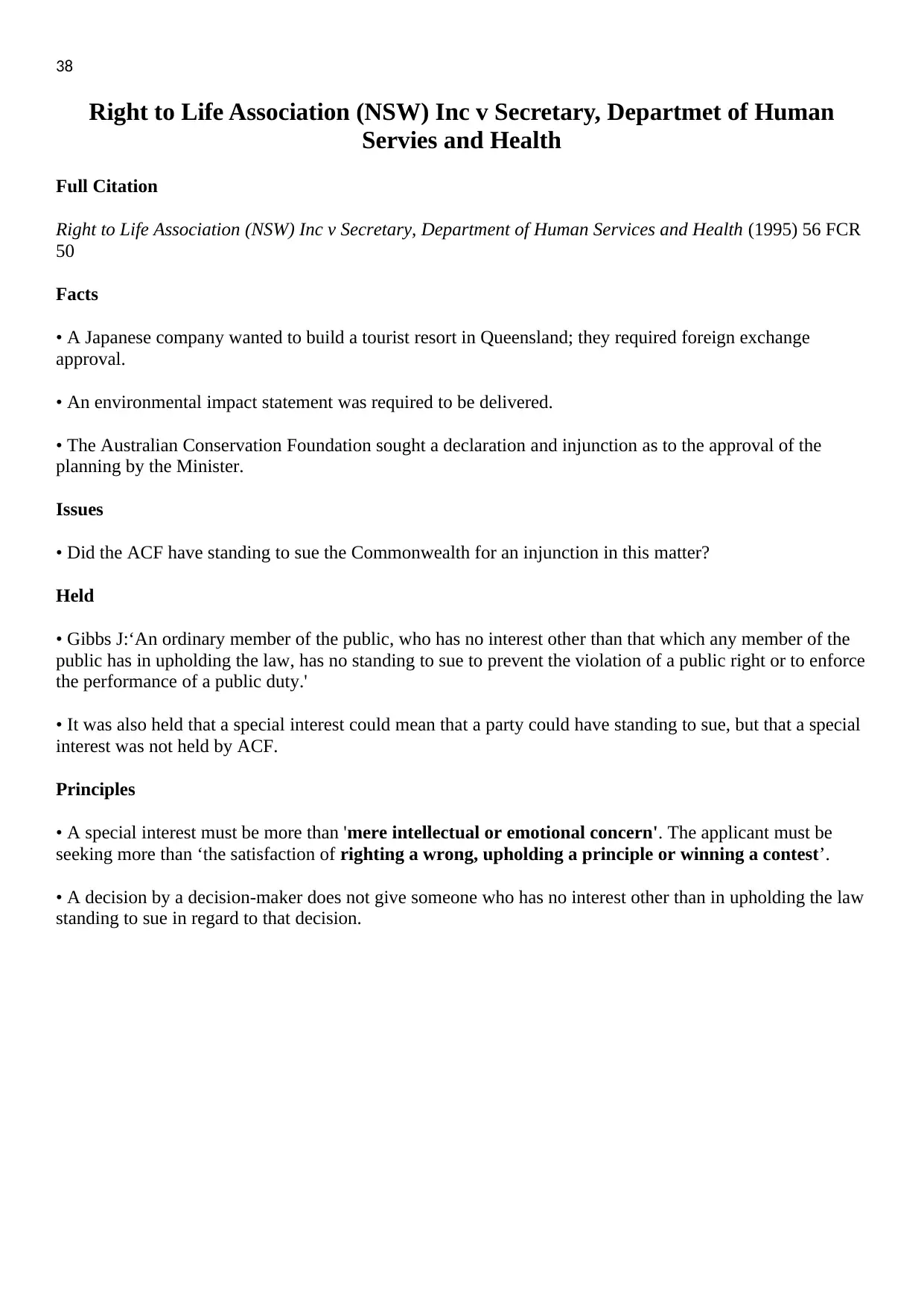
38
Right to Life Association (NSW) Inc v Secretary, Departmet of Human
Servies and Health
Full Citation
Right to Life Association (NSW) Inc v Secretary, Department of Human Services and Health (1995) 56 FCR
50
Facts
• A Japanese company wanted to build a tourist resort in Queensland; they required foreign exchange
approval.
• An environmental impact statement was required to be delivered.
• The Australian Conservation Foundation sought a declaration and injunction as to the approval of the
planning by the Minister.
Issues
• Did the ACF have standing to sue the Commonwealth for an injunction in this matter?
Held
• Gibbs J:‘An ordinary member of the public, who has no interest other than that which any member of the
public has in upholding the law, has no standing to sue to prevent the violation of a public right or to enforce
the performance of a public duty.'
• It was also held that a special interest could mean that a party could have standing to sue, but that a special
interest was not held by ACF.
Principles
• A special interest must be more than 'mere intellectual or emotional concern'. The applicant must be
seeking more than ‘the satisfaction of righting a wrong, upholding a principle or winning a contest’.
• A decision by a decision-maker does not give someone who has no interest other than in upholding the law
standing to sue in regard to that decision.
Right to Life Association (NSW) Inc v Secretary, Departmet of Human
Servies and Health
Full Citation
Right to Life Association (NSW) Inc v Secretary, Department of Human Services and Health (1995) 56 FCR
50
Facts
• A Japanese company wanted to build a tourist resort in Queensland; they required foreign exchange
approval.
• An environmental impact statement was required to be delivered.
• The Australian Conservation Foundation sought a declaration and injunction as to the approval of the
planning by the Minister.
Issues
• Did the ACF have standing to sue the Commonwealth for an injunction in this matter?
Held
• Gibbs J:‘An ordinary member of the public, who has no interest other than that which any member of the
public has in upholding the law, has no standing to sue to prevent the violation of a public right or to enforce
the performance of a public duty.'
• It was also held that a special interest could mean that a party could have standing to sue, but that a special
interest was not held by ACF.
Principles
• A special interest must be more than 'mere intellectual or emotional concern'. The applicant must be
seeking more than ‘the satisfaction of righting a wrong, upholding a principle or winning a contest’.
• A decision by a decision-maker does not give someone who has no interest other than in upholding the law
standing to sue in regard to that decision.
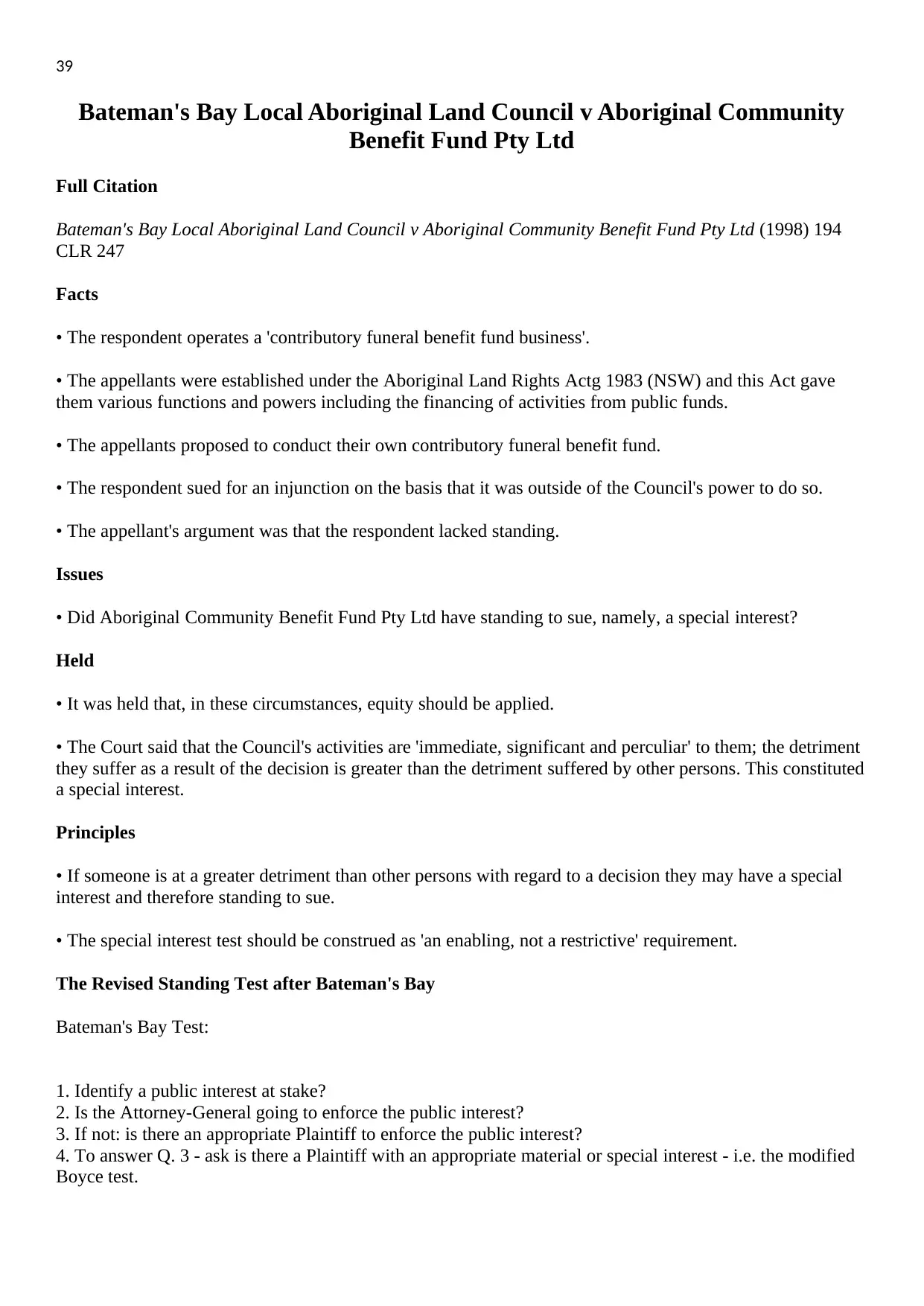
39
Bateman's Bay Local Aboriginal Land Council v Aboriginal Community
Benefit Fund Pty Ltd
Full Citation
Bateman's Bay Local Aboriginal Land Council v Aboriginal Community Benefit Fund Pty Ltd (1998) 194
CLR 247
Facts
• The respondent operates a 'contributory funeral benefit fund business'.
• The appellants were established under the Aboriginal Land Rights Actg 1983 (NSW) and this Act gave
them various functions and powers including the financing of activities from public funds.
• The appellants proposed to conduct their own contributory funeral benefit fund.
• The respondent sued for an injunction on the basis that it was outside of the Council's power to do so.
• The appellant's argument was that the respondent lacked standing.
Issues
• Did Aboriginal Community Benefit Fund Pty Ltd have standing to sue, namely, a special interest?
Held
• It was held that, in these circumstances, equity should be applied.
• The Court said that the Council's activities are 'immediate, significant and perculiar' to them; the detriment
they suffer as a result of the decision is greater than the detriment suffered by other persons. This constituted
a special interest.
Principles
• If someone is at a greater detriment than other persons with regard to a decision they may have a special
interest and therefore standing to sue.
• The special interest test should be construed as 'an enabling, not a restrictive' requirement.
The Revised Standing Test after Bateman's Bay
Bateman's Bay Test:
1. Identify a public interest at stake?
2. Is the Attorney-General going to enforce the public interest?
3. If not: is there an appropriate Plaintiff to enforce the public interest?
4. To answer Q. 3 - ask is there a Plaintiff with an appropriate material or special interest - i.e. the modified
Boyce test.
Bateman's Bay Local Aboriginal Land Council v Aboriginal Community
Benefit Fund Pty Ltd
Full Citation
Bateman's Bay Local Aboriginal Land Council v Aboriginal Community Benefit Fund Pty Ltd (1998) 194
CLR 247
Facts
• The respondent operates a 'contributory funeral benefit fund business'.
• The appellants were established under the Aboriginal Land Rights Actg 1983 (NSW) and this Act gave
them various functions and powers including the financing of activities from public funds.
• The appellants proposed to conduct their own contributory funeral benefit fund.
• The respondent sued for an injunction on the basis that it was outside of the Council's power to do so.
• The appellant's argument was that the respondent lacked standing.
Issues
• Did Aboriginal Community Benefit Fund Pty Ltd have standing to sue, namely, a special interest?
Held
• It was held that, in these circumstances, equity should be applied.
• The Court said that the Council's activities are 'immediate, significant and perculiar' to them; the detriment
they suffer as a result of the decision is greater than the detriment suffered by other persons. This constituted
a special interest.
Principles
• If someone is at a greater detriment than other persons with regard to a decision they may have a special
interest and therefore standing to sue.
• The special interest test should be construed as 'an enabling, not a restrictive' requirement.
The Revised Standing Test after Bateman's Bay
Bateman's Bay Test:
1. Identify a public interest at stake?
2. Is the Attorney-General going to enforce the public interest?
3. If not: is there an appropriate Plaintiff to enforce the public interest?
4. To answer Q. 3 - ask is there a Plaintiff with an appropriate material or special interest - i.e. the modified
Boyce test.
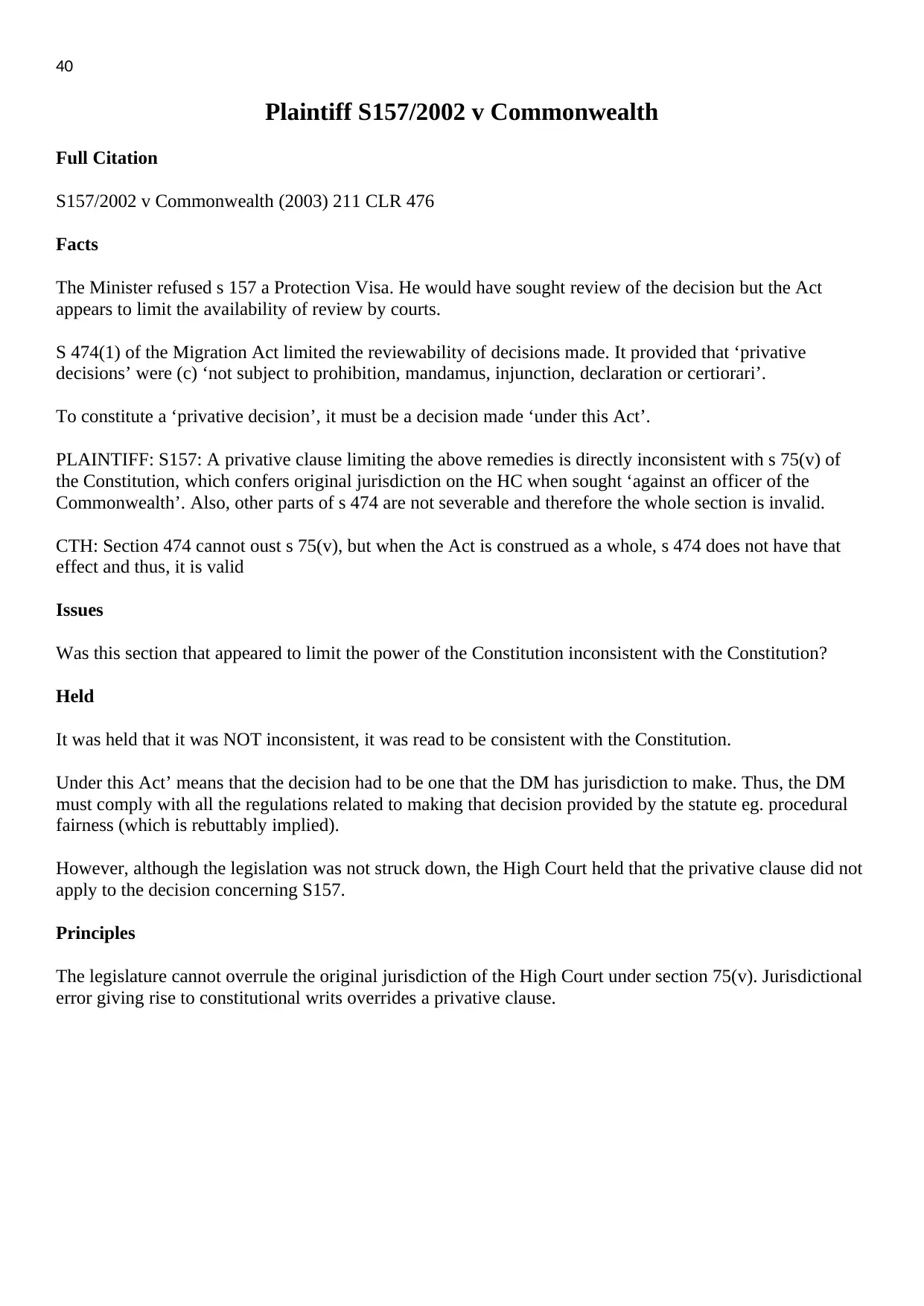
40
Plaintiff S157/2002 v Commonwealth
Full Citation
S157/2002 v Commonwealth (2003) 211 CLR 476
Facts
The Minister refused s 157 a Protection Visa. He would have sought review of the decision but the Act
appears to limit the availability of review by courts.
S 474(1) of the Migration Act limited the reviewability of decisions made. It provided that ‘privative
decisions’ were (c) ‘not subject to prohibition, mandamus, injunction, declaration or certiorari’.
To constitute a ‘privative decision’, it must be a decision made ‘under this Act’.
PLAINTIFF: S157: A privative clause limiting the above remedies is directly inconsistent with s 75(v) of
the Constitution, which confers original jurisdiction on the HC when sought ‘against an officer of the
Commonwealth’. Also, other parts of s 474 are not severable and therefore the whole section is invalid.
CTH: Section 474 cannot oust s 75(v), but when the Act is construed as a whole, s 474 does not have that
effect and thus, it is valid
Issues
Was this section that appeared to limit the power of the Constitution inconsistent with the Constitution?
Held
It was held that it was NOT inconsistent, it was read to be consistent with the Constitution.
Under this Act’ means that the decision had to be one that the DM has jurisdiction to make. Thus, the DM
must comply with all the regulations related to making that decision provided by the statute eg. procedural
fairness (which is rebuttably implied).
However, although the legislation was not struck down, the High Court held that the privative clause did not
apply to the decision concerning S157.
Principles
The legislature cannot overrule the original jurisdiction of the High Court under section 75(v). Jurisdictional
error giving rise to constitutional writs overrides a privative clause.
Plaintiff S157/2002 v Commonwealth
Full Citation
S157/2002 v Commonwealth (2003) 211 CLR 476
Facts
The Minister refused s 157 a Protection Visa. He would have sought review of the decision but the Act
appears to limit the availability of review by courts.
S 474(1) of the Migration Act limited the reviewability of decisions made. It provided that ‘privative
decisions’ were (c) ‘not subject to prohibition, mandamus, injunction, declaration or certiorari’.
To constitute a ‘privative decision’, it must be a decision made ‘under this Act’.
PLAINTIFF: S157: A privative clause limiting the above remedies is directly inconsistent with s 75(v) of
the Constitution, which confers original jurisdiction on the HC when sought ‘against an officer of the
Commonwealth’. Also, other parts of s 474 are not severable and therefore the whole section is invalid.
CTH: Section 474 cannot oust s 75(v), but when the Act is construed as a whole, s 474 does not have that
effect and thus, it is valid
Issues
Was this section that appeared to limit the power of the Constitution inconsistent with the Constitution?
Held
It was held that it was NOT inconsistent, it was read to be consistent with the Constitution.
Under this Act’ means that the decision had to be one that the DM has jurisdiction to make. Thus, the DM
must comply with all the regulations related to making that decision provided by the statute eg. procedural
fairness (which is rebuttably implied).
However, although the legislation was not struck down, the High Court held that the privative clause did not
apply to the decision concerning S157.
Principles
The legislature cannot overrule the original jurisdiction of the High Court under section 75(v). Jurisdictional
error giving rise to constitutional writs overrides a privative clause.
Secure Best Marks with AI Grader
Need help grading? Try our AI Grader for instant feedback on your assignments.
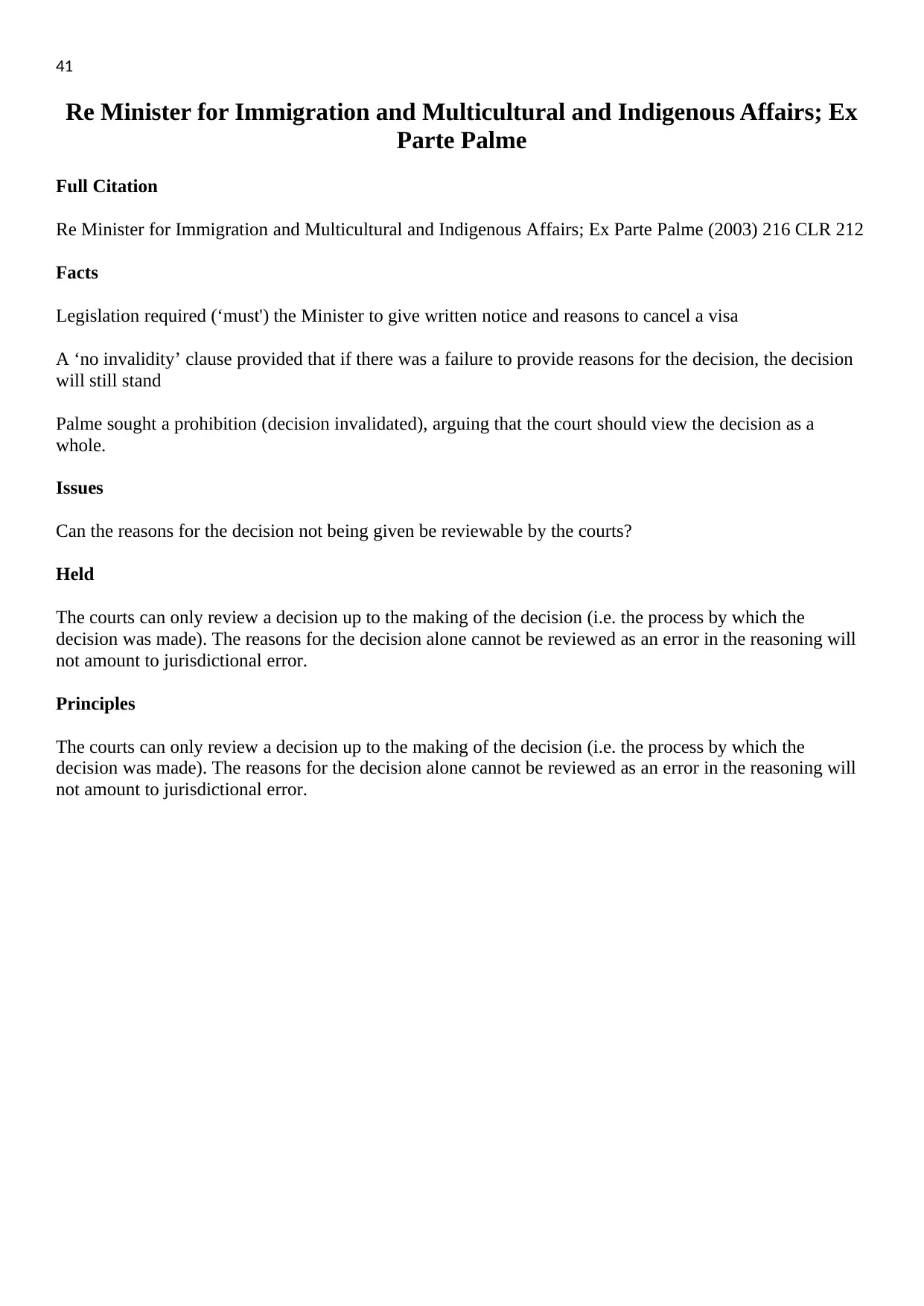
41
Re Minister for Immigration and Multicultural and Indigenous Affairs; Ex
Parte Palme
Full Citation
Re Minister for Immigration and Multicultural and Indigenous Affairs; Ex Parte Palme (2003) 216 CLR 212
Facts
Legislation required (‘must') the Minister to give written notice and reasons to cancel a visa
A ‘no invalidity’ clause provided that if there was a failure to provide reasons for the decision, the decision
will still stand
Palme sought a prohibition (decision invalidated), arguing that the court should view the decision as a
whole.
Issues
Can the reasons for the decision not being given be reviewable by the courts?
Held
The courts can only review a decision up to the making of the decision (i.e. the process by which the
decision was made). The reasons for the decision alone cannot be reviewed as an error in the reasoning will
not amount to jurisdictional error.
Principles
The courts can only review a decision up to the making of the decision (i.e. the process by which the
decision was made). The reasons for the decision alone cannot be reviewed as an error in the reasoning will
not amount to jurisdictional error.
Re Minister for Immigration and Multicultural and Indigenous Affairs; Ex
Parte Palme
Full Citation
Re Minister for Immigration and Multicultural and Indigenous Affairs; Ex Parte Palme (2003) 216 CLR 212
Facts
Legislation required (‘must') the Minister to give written notice and reasons to cancel a visa
A ‘no invalidity’ clause provided that if there was a failure to provide reasons for the decision, the decision
will still stand
Palme sought a prohibition (decision invalidated), arguing that the court should view the decision as a
whole.
Issues
Can the reasons for the decision not being given be reviewable by the courts?
Held
The courts can only review a decision up to the making of the decision (i.e. the process by which the
decision was made). The reasons for the decision alone cannot be reviewed as an error in the reasoning will
not amount to jurisdictional error.
Principles
The courts can only review a decision up to the making of the decision (i.e. the process by which the
decision was made). The reasons for the decision alone cannot be reviewed as an error in the reasoning will
not amount to jurisdictional error.
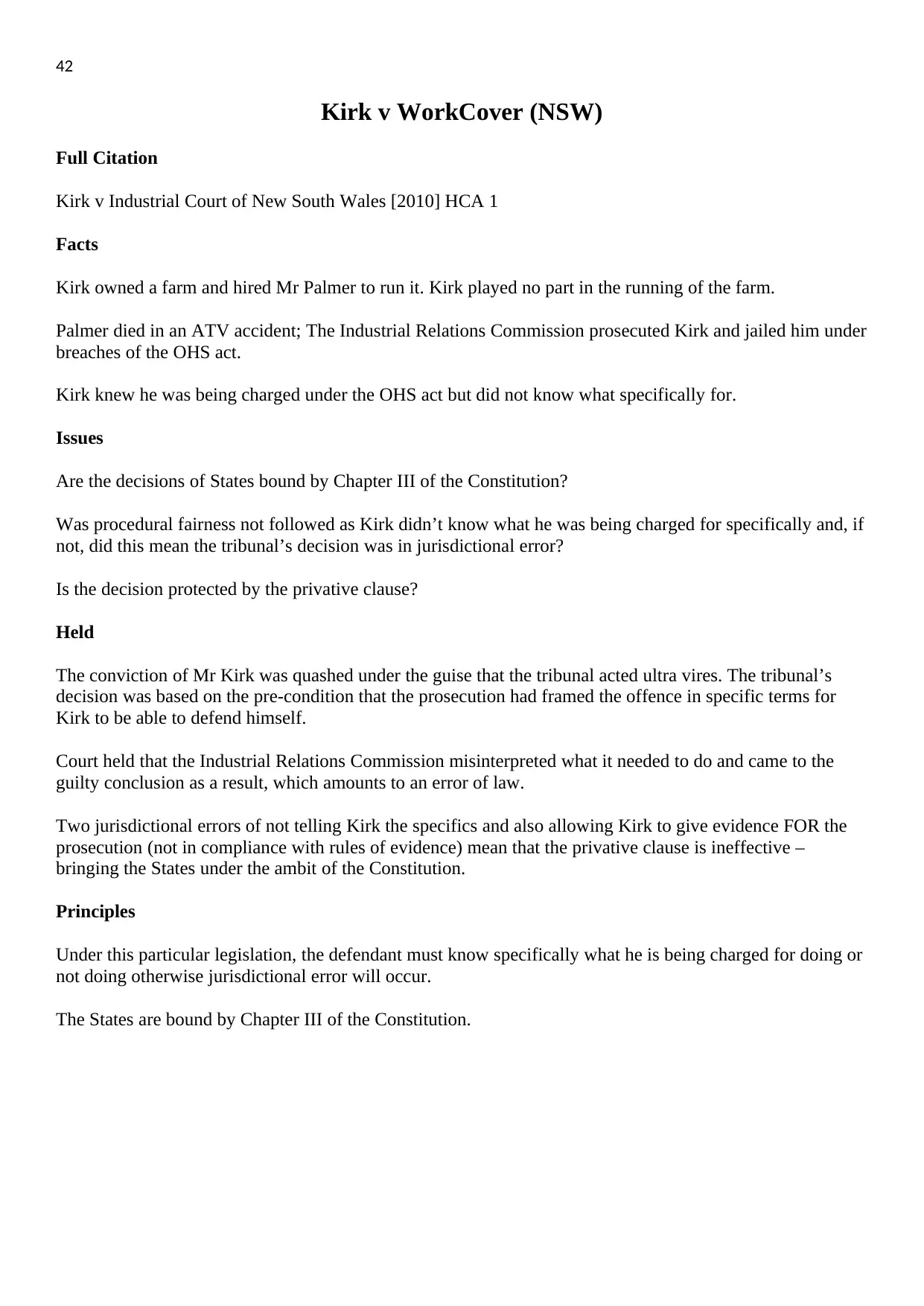
42
Kirk v WorkCover (NSW)
Full Citation
Kirk v Industrial Court of New South Wales [2010] HCA 1
Facts
Kirk owned a farm and hired Mr Palmer to run it. Kirk played no part in the running of the farm.
Palmer died in an ATV accident; The Industrial Relations Commission prosecuted Kirk and jailed him under
breaches of the OHS act.
Kirk knew he was being charged under the OHS act but did not know what specifically for.
Issues
Are the decisions of States bound by Chapter III of the Constitution?
Was procedural fairness not followed as Kirk didn’t know what he was being charged for specifically and, if
not, did this mean the tribunal’s decision was in jurisdictional error?
Is the decision protected by the privative clause?
Held
The conviction of Mr Kirk was quashed under the guise that the tribunal acted ultra vires. The tribunal’s
decision was based on the pre-condition that the prosecution had framed the offence in specific terms for
Kirk to be able to defend himself.
Court held that the Industrial Relations Commission misinterpreted what it needed to do and came to the
guilty conclusion as a result, which amounts to an error of law.
Two jurisdictional errors of not telling Kirk the specifics and also allowing Kirk to give evidence FOR the
prosecution (not in compliance with rules of evidence) mean that the privative clause is ineffective –
bringing the States under the ambit of the Constitution.
Principles
Under this particular legislation, the defendant must know specifically what he is being charged for doing or
not doing otherwise jurisdictional error will occur.
The States are bound by Chapter III of the Constitution.
Kirk v WorkCover (NSW)
Full Citation
Kirk v Industrial Court of New South Wales [2010] HCA 1
Facts
Kirk owned a farm and hired Mr Palmer to run it. Kirk played no part in the running of the farm.
Palmer died in an ATV accident; The Industrial Relations Commission prosecuted Kirk and jailed him under
breaches of the OHS act.
Kirk knew he was being charged under the OHS act but did not know what specifically for.
Issues
Are the decisions of States bound by Chapter III of the Constitution?
Was procedural fairness not followed as Kirk didn’t know what he was being charged for specifically and, if
not, did this mean the tribunal’s decision was in jurisdictional error?
Is the decision protected by the privative clause?
Held
The conviction of Mr Kirk was quashed under the guise that the tribunal acted ultra vires. The tribunal’s
decision was based on the pre-condition that the prosecution had framed the offence in specific terms for
Kirk to be able to defend himself.
Court held that the Industrial Relations Commission misinterpreted what it needed to do and came to the
guilty conclusion as a result, which amounts to an error of law.
Two jurisdictional errors of not telling Kirk the specifics and also allowing Kirk to give evidence FOR the
prosecution (not in compliance with rules of evidence) mean that the privative clause is ineffective –
bringing the States under the ambit of the Constitution.
Principles
Under this particular legislation, the defendant must know specifically what he is being charged for doing or
not doing otherwise jurisdictional error will occur.
The States are bound by Chapter III of the Constitution.
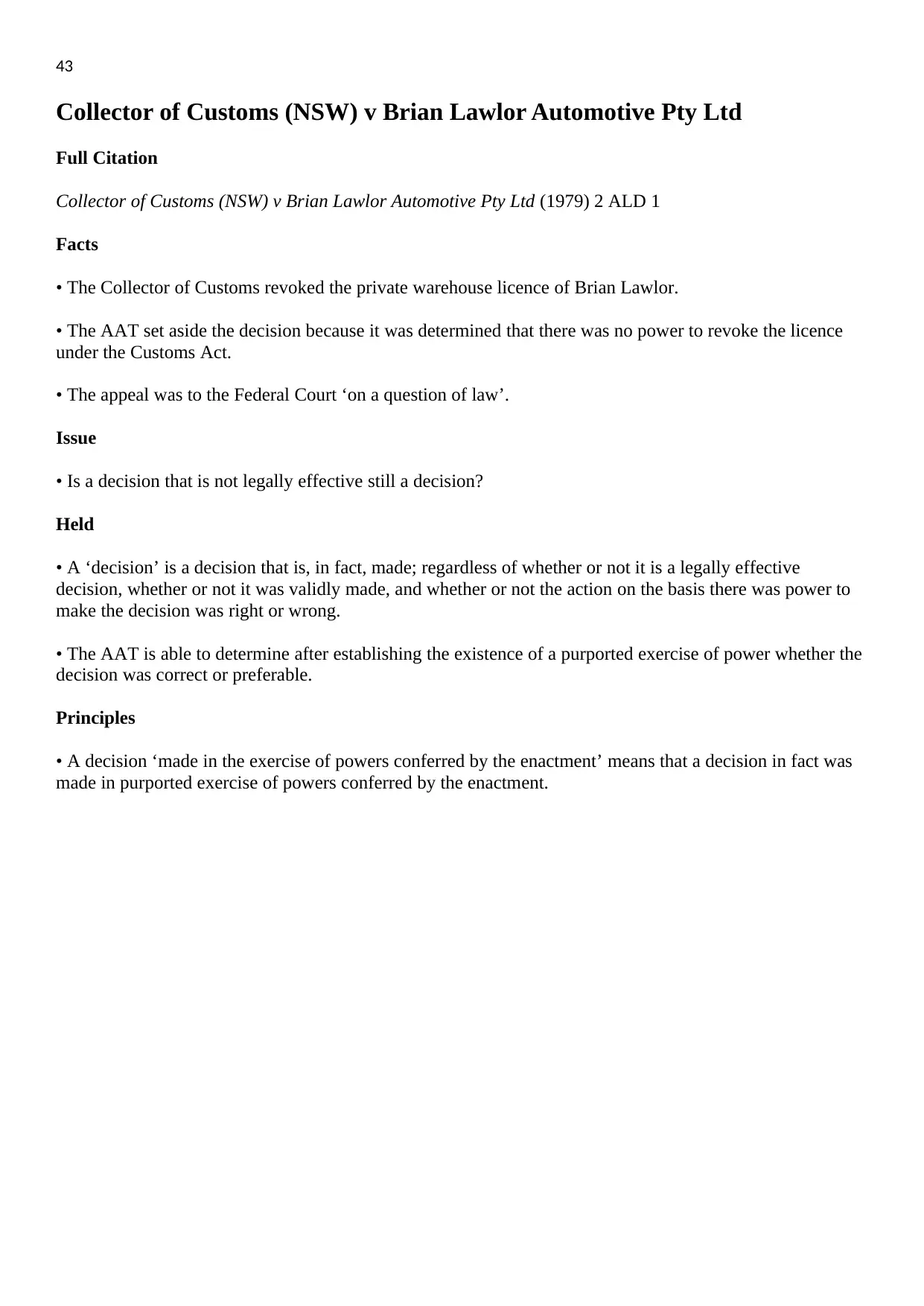
43
Collector of Customs (NSW) v Brian Lawlor Automotive Pty Ltd
Full Citation
Collector of Customs (NSW) v Brian Lawlor Automotive Pty Ltd (1979) 2 ALD 1
Facts
• The Collector of Customs revoked the private warehouse licence of Brian Lawlor.
• The AAT set aside the decision because it was determined that there was no power to revoke the licence
under the Customs Act.
• The appeal was to the Federal Court ‘on a question of law’.
Issue
• Is a decision that is not legally effective still a decision?
Held
• A ‘decision’ is a decision that is, in fact, made; regardless of whether or not it is a legally effective
decision, whether or not it was validly made, and whether or not the action on the basis there was power to
make the decision was right or wrong.
• The AAT is able to determine after establishing the existence of a purported exercise of power whether the
decision was correct or preferable.
Principles
• A decision ‘made in the exercise of powers conferred by the enactment’ means that a decision in fact was
made in purported exercise of powers conferred by the enactment.
Collector of Customs (NSW) v Brian Lawlor Automotive Pty Ltd
Full Citation
Collector of Customs (NSW) v Brian Lawlor Automotive Pty Ltd (1979) 2 ALD 1
Facts
• The Collector of Customs revoked the private warehouse licence of Brian Lawlor.
• The AAT set aside the decision because it was determined that there was no power to revoke the licence
under the Customs Act.
• The appeal was to the Federal Court ‘on a question of law’.
Issue
• Is a decision that is not legally effective still a decision?
Held
• A ‘decision’ is a decision that is, in fact, made; regardless of whether or not it is a legally effective
decision, whether or not it was validly made, and whether or not the action on the basis there was power to
make the decision was right or wrong.
• The AAT is able to determine after establishing the existence of a purported exercise of power whether the
decision was correct or preferable.
Principles
• A decision ‘made in the exercise of powers conferred by the enactment’ means that a decision in fact was
made in purported exercise of powers conferred by the enactment.
Paraphrase This Document
Need a fresh take? Get an instant paraphrase of this document with our AI Paraphraser
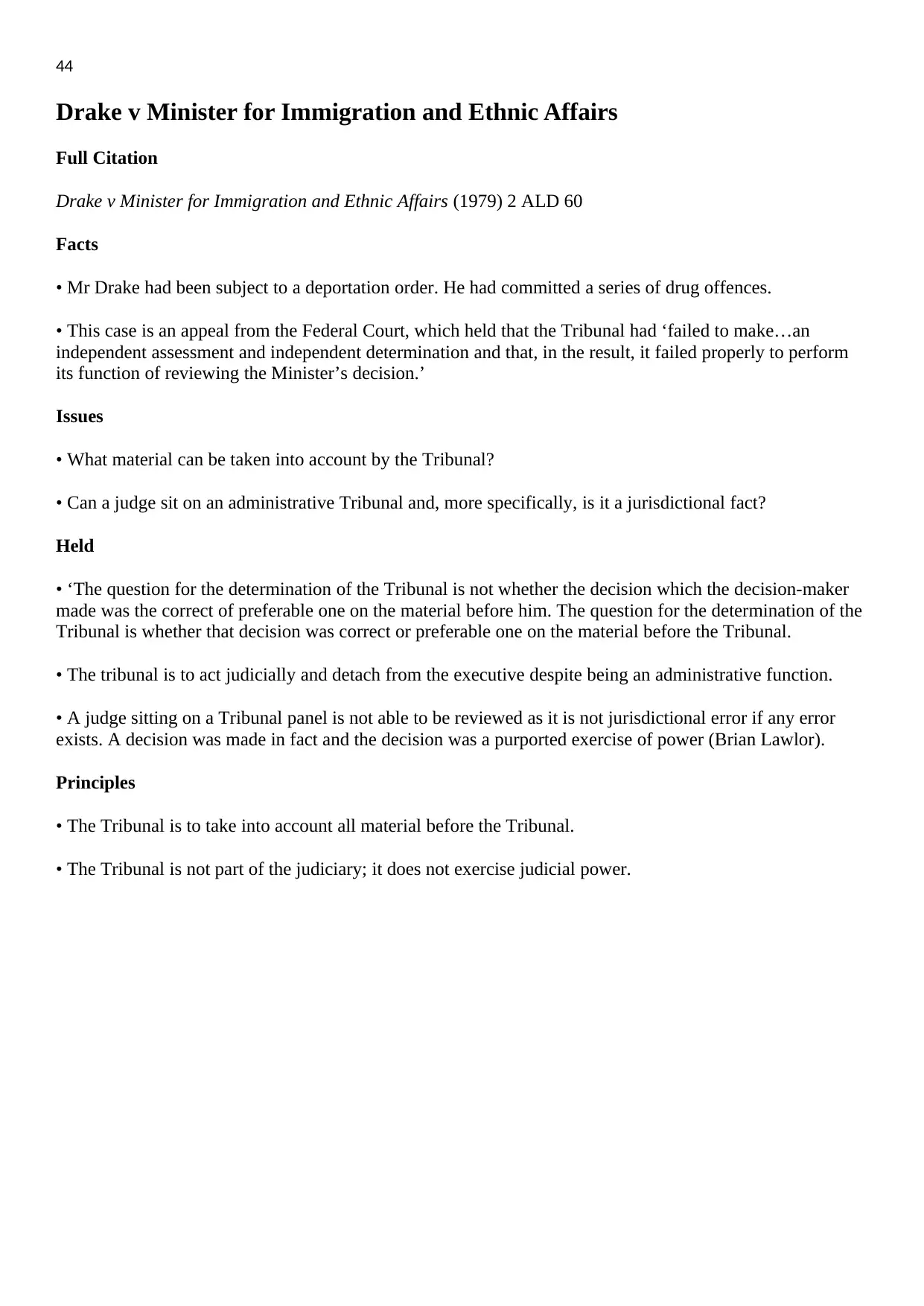
44
Drake v Minister for Immigration and Ethnic Affairs
Full Citation
Drake v Minister for Immigration and Ethnic Affairs (1979) 2 ALD 60
Facts
• Mr Drake had been subject to a deportation order. He had committed a series of drug offences.
• This case is an appeal from the Federal Court, which held that the Tribunal had ‘failed to make…an
independent assessment and independent determination and that, in the result, it failed properly to perform
its function of reviewing the Minister’s decision.’
Issues
• What material can be taken into account by the Tribunal?
• Can a judge sit on an administrative Tribunal and, more specifically, is it a jurisdictional fact?
Held
• ‘The question for the determination of the Tribunal is not whether the decision which the decision-maker
made was the correct of preferable one on the material before him. The question for the determination of the
Tribunal is whether that decision was correct or preferable one on the material before the Tribunal.
• The tribunal is to act judicially and detach from the executive despite being an administrative function.
• A judge sitting on a Tribunal panel is not able to be reviewed as it is not jurisdictional error if any error
exists. A decision was made in fact and the decision was a purported exercise of power (Brian Lawlor).
Principles
• The Tribunal is to take into account all material before the Tribunal.
• The Tribunal is not part of the judiciary; it does not exercise judicial power.
Drake v Minister for Immigration and Ethnic Affairs
Full Citation
Drake v Minister for Immigration and Ethnic Affairs (1979) 2 ALD 60
Facts
• Mr Drake had been subject to a deportation order. He had committed a series of drug offences.
• This case is an appeal from the Federal Court, which held that the Tribunal had ‘failed to make…an
independent assessment and independent determination and that, in the result, it failed properly to perform
its function of reviewing the Minister’s decision.’
Issues
• What material can be taken into account by the Tribunal?
• Can a judge sit on an administrative Tribunal and, more specifically, is it a jurisdictional fact?
Held
• ‘The question for the determination of the Tribunal is not whether the decision which the decision-maker
made was the correct of preferable one on the material before him. The question for the determination of the
Tribunal is whether that decision was correct or preferable one on the material before the Tribunal.
• The tribunal is to act judicially and detach from the executive despite being an administrative function.
• A judge sitting on a Tribunal panel is not able to be reviewed as it is not jurisdictional error if any error
exists. A decision was made in fact and the decision was a purported exercise of power (Brian Lawlor).
Principles
• The Tribunal is to take into account all material before the Tribunal.
• The Tribunal is not part of the judiciary; it does not exercise judicial power.
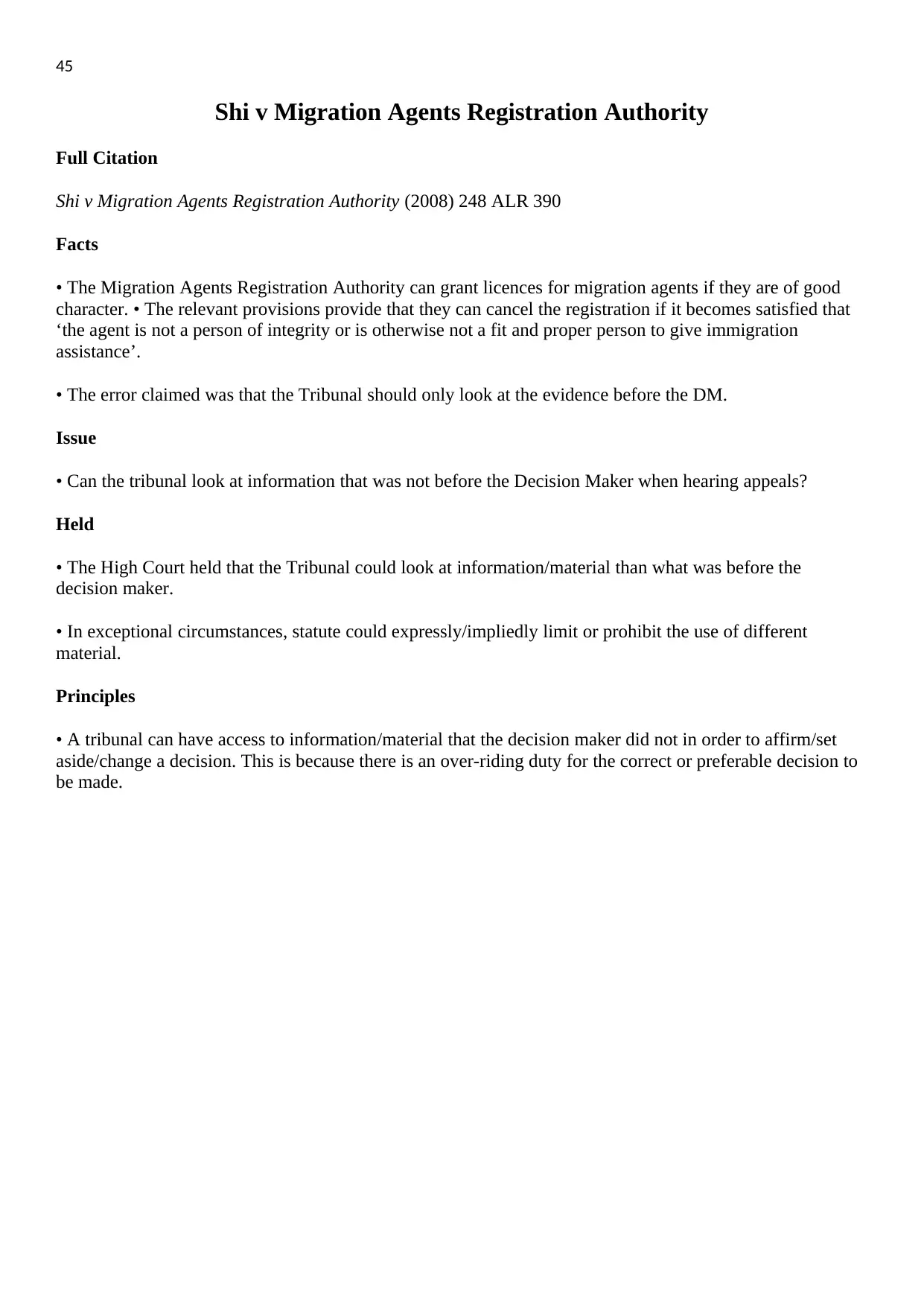
45
Shi v Migration Agents Registration Authority
Full Citation
Shi v Migration Agents Registration Authority (2008) 248 ALR 390
Facts
• The Migration Agents Registration Authority can grant licences for migration agents if they are of good
character. • The relevant provisions provide that they can cancel the registration if it becomes satisfied that
‘the agent is not a person of integrity or is otherwise not a fit and proper person to give immigration
assistance’.
• The error claimed was that the Tribunal should only look at the evidence before the DM.
Issue
• Can the tribunal look at information that was not before the Decision Maker when hearing appeals?
Held
• The High Court held that the Tribunal could look at information/material than what was before the
decision maker.
• In exceptional circumstances, statute could expressly/impliedly limit or prohibit the use of different
material.
Principles
• A tribunal can have access to information/material that the decision maker did not in order to affirm/set
aside/change a decision. This is because there is an over-riding duty for the correct or preferable decision to
be made.
Shi v Migration Agents Registration Authority
Full Citation
Shi v Migration Agents Registration Authority (2008) 248 ALR 390
Facts
• The Migration Agents Registration Authority can grant licences for migration agents if they are of good
character. • The relevant provisions provide that they can cancel the registration if it becomes satisfied that
‘the agent is not a person of integrity or is otherwise not a fit and proper person to give immigration
assistance’.
• The error claimed was that the Tribunal should only look at the evidence before the DM.
Issue
• Can the tribunal look at information that was not before the Decision Maker when hearing appeals?
Held
• The High Court held that the Tribunal could look at information/material than what was before the
decision maker.
• In exceptional circumstances, statute could expressly/impliedly limit or prohibit the use of different
material.
Principles
• A tribunal can have access to information/material that the decision maker did not in order to affirm/set
aside/change a decision. This is because there is an over-riding duty for the correct or preferable decision to
be made.
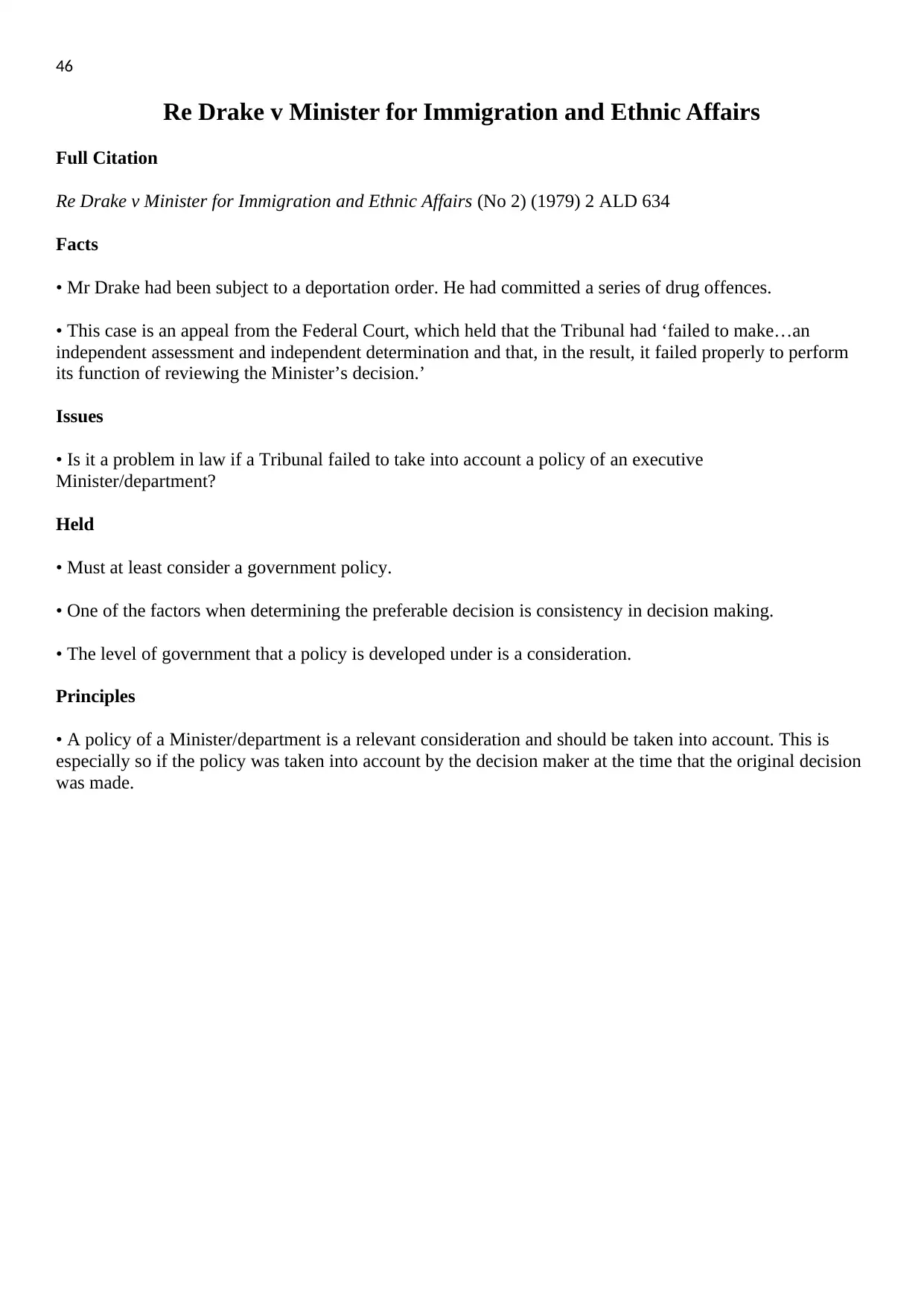
46
Re Drake v Minister for Immigration and Ethnic Affairs
Full Citation
Re Drake v Minister for Immigration and Ethnic Affairs (No 2) (1979) 2 ALD 634
Facts
• Mr Drake had been subject to a deportation order. He had committed a series of drug offences.
• This case is an appeal from the Federal Court, which held that the Tribunal had ‘failed to make…an
independent assessment and independent determination and that, in the result, it failed properly to perform
its function of reviewing the Minister’s decision.’
Issues
• Is it a problem in law if a Tribunal failed to take into account a policy of an executive
Minister/department?
Held
• Must at least consider a government policy.
• One of the factors when determining the preferable decision is consistency in decision making.
• The level of government that a policy is developed under is a consideration.
Principles
• A policy of a Minister/department is a relevant consideration and should be taken into account. This is
especially so if the policy was taken into account by the decision maker at the time that the original decision
was made.
Re Drake v Minister for Immigration and Ethnic Affairs
Full Citation
Re Drake v Minister for Immigration and Ethnic Affairs (No 2) (1979) 2 ALD 634
Facts
• Mr Drake had been subject to a deportation order. He had committed a series of drug offences.
• This case is an appeal from the Federal Court, which held that the Tribunal had ‘failed to make…an
independent assessment and independent determination and that, in the result, it failed properly to perform
its function of reviewing the Minister’s decision.’
Issues
• Is it a problem in law if a Tribunal failed to take into account a policy of an executive
Minister/department?
Held
• Must at least consider a government policy.
• One of the factors when determining the preferable decision is consistency in decision making.
• The level of government that a policy is developed under is a consideration.
Principles
• A policy of a Minister/department is a relevant consideration and should be taken into account. This is
especially so if the policy was taken into account by the decision maker at the time that the original decision
was made.
1 out of 46
Your All-in-One AI-Powered Toolkit for Academic Success.
+13062052269
info@desklib.com
Available 24*7 on WhatsApp / Email
![[object Object]](/_next/static/media/star-bottom.7253800d.svg)
Unlock your academic potential
© 2024 | Zucol Services PVT LTD | All rights reserved.

